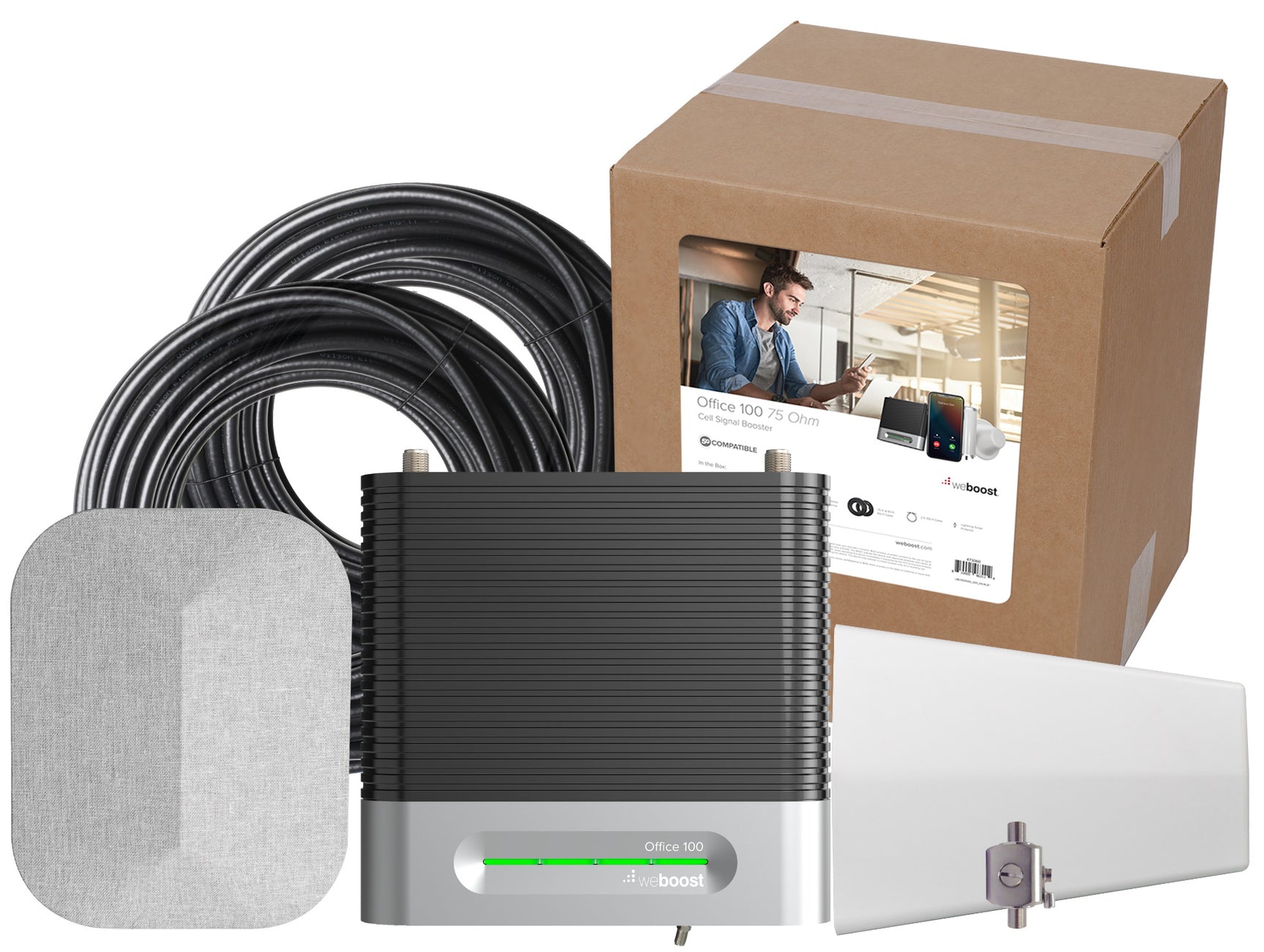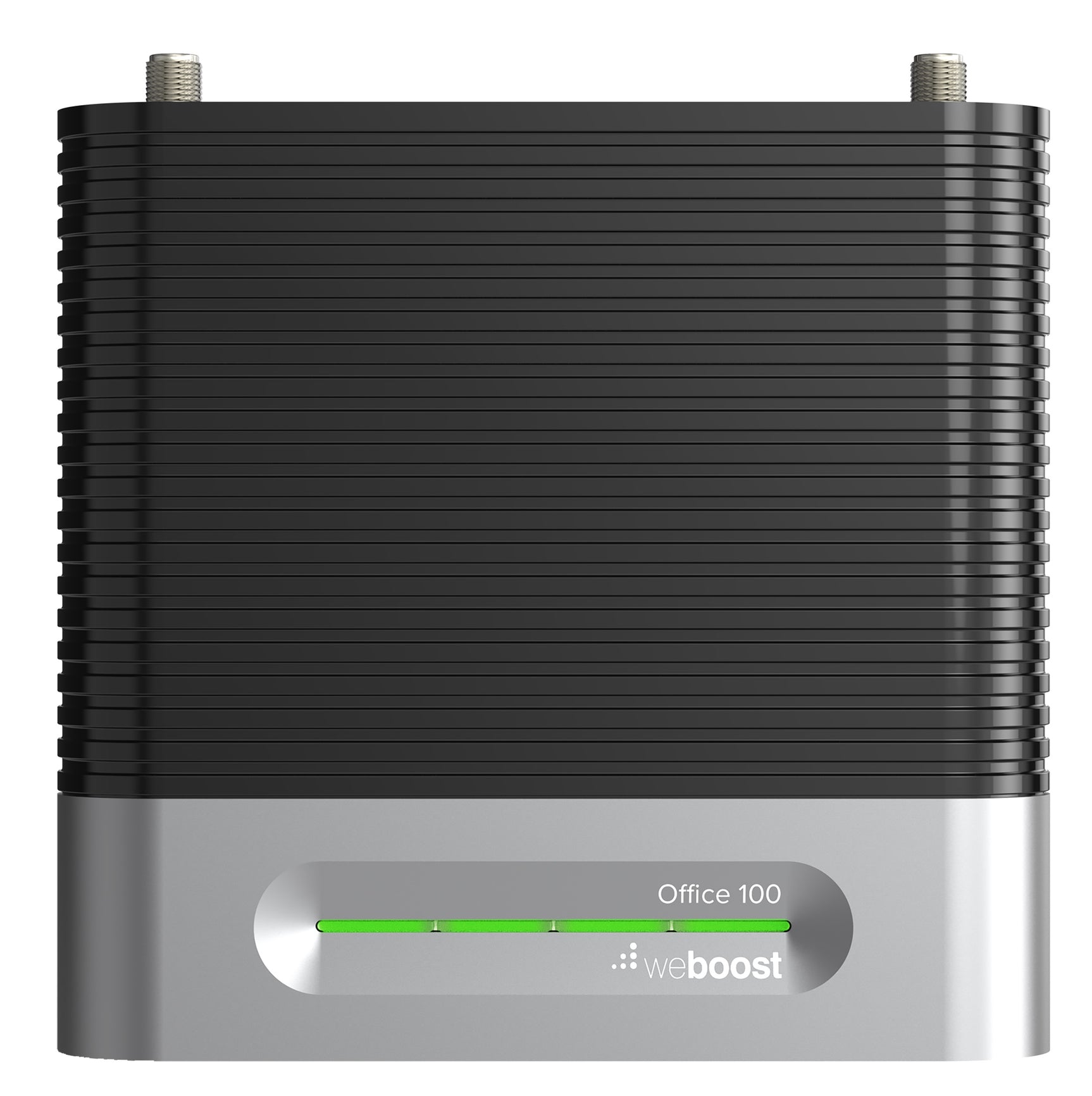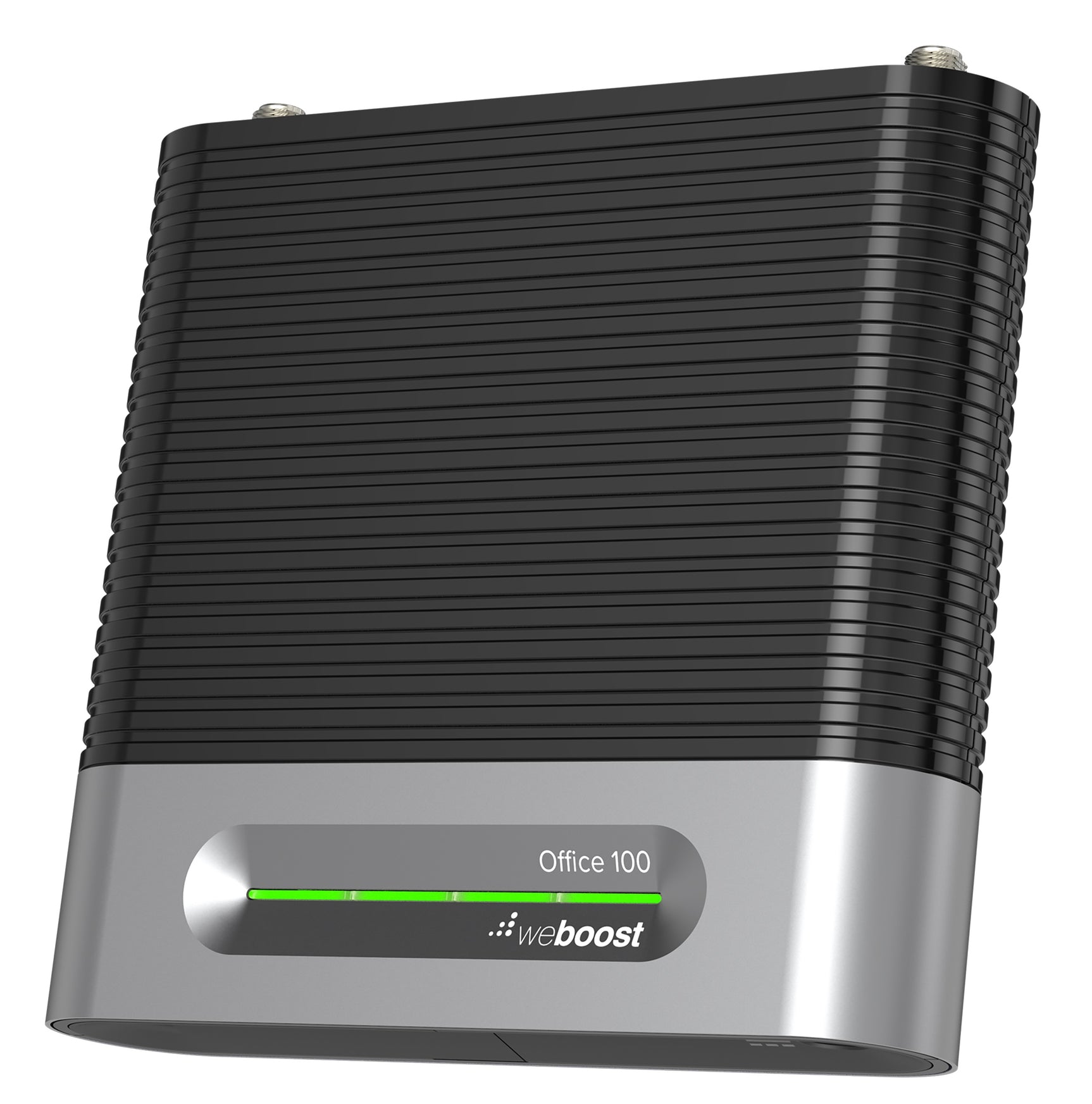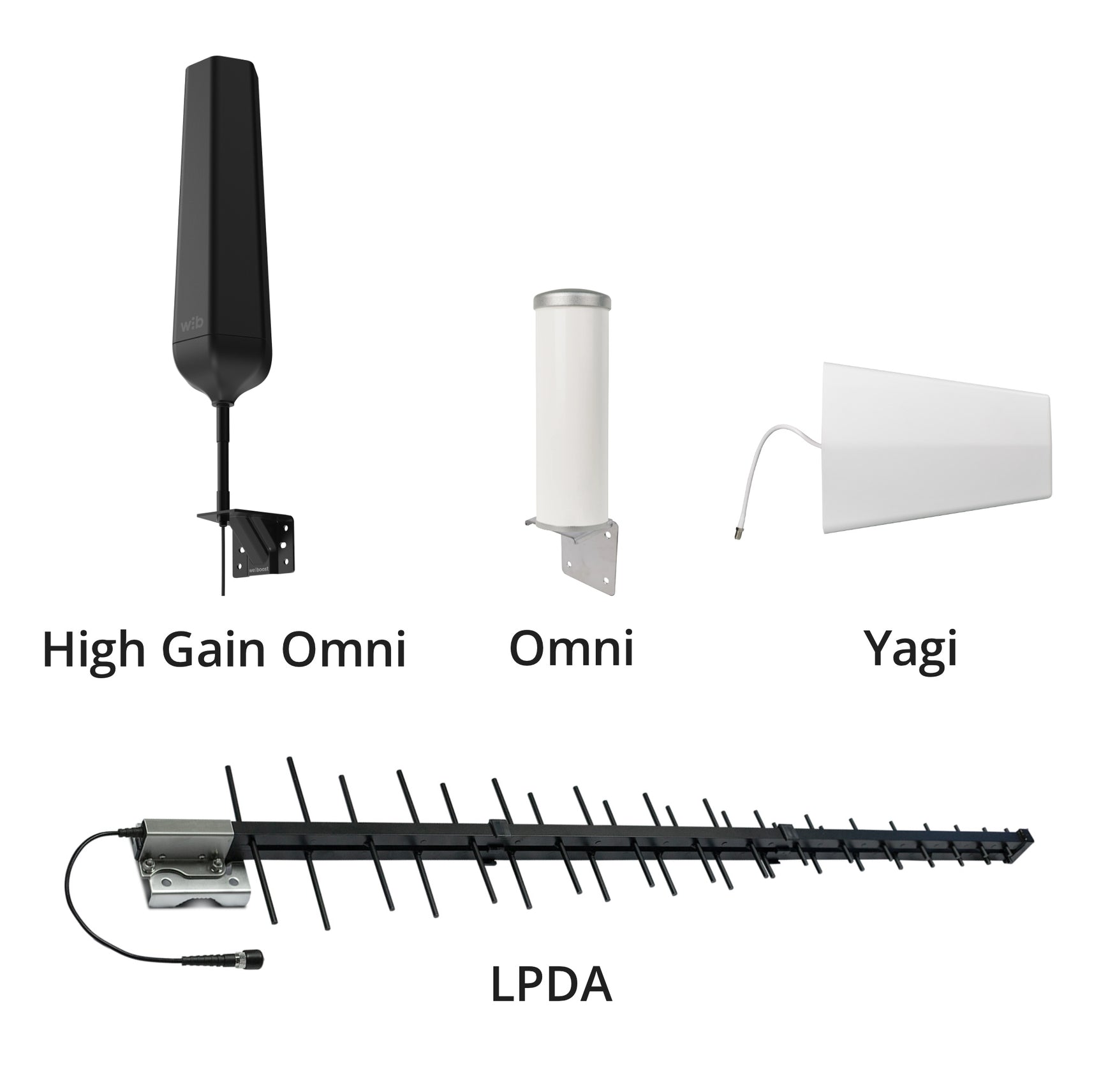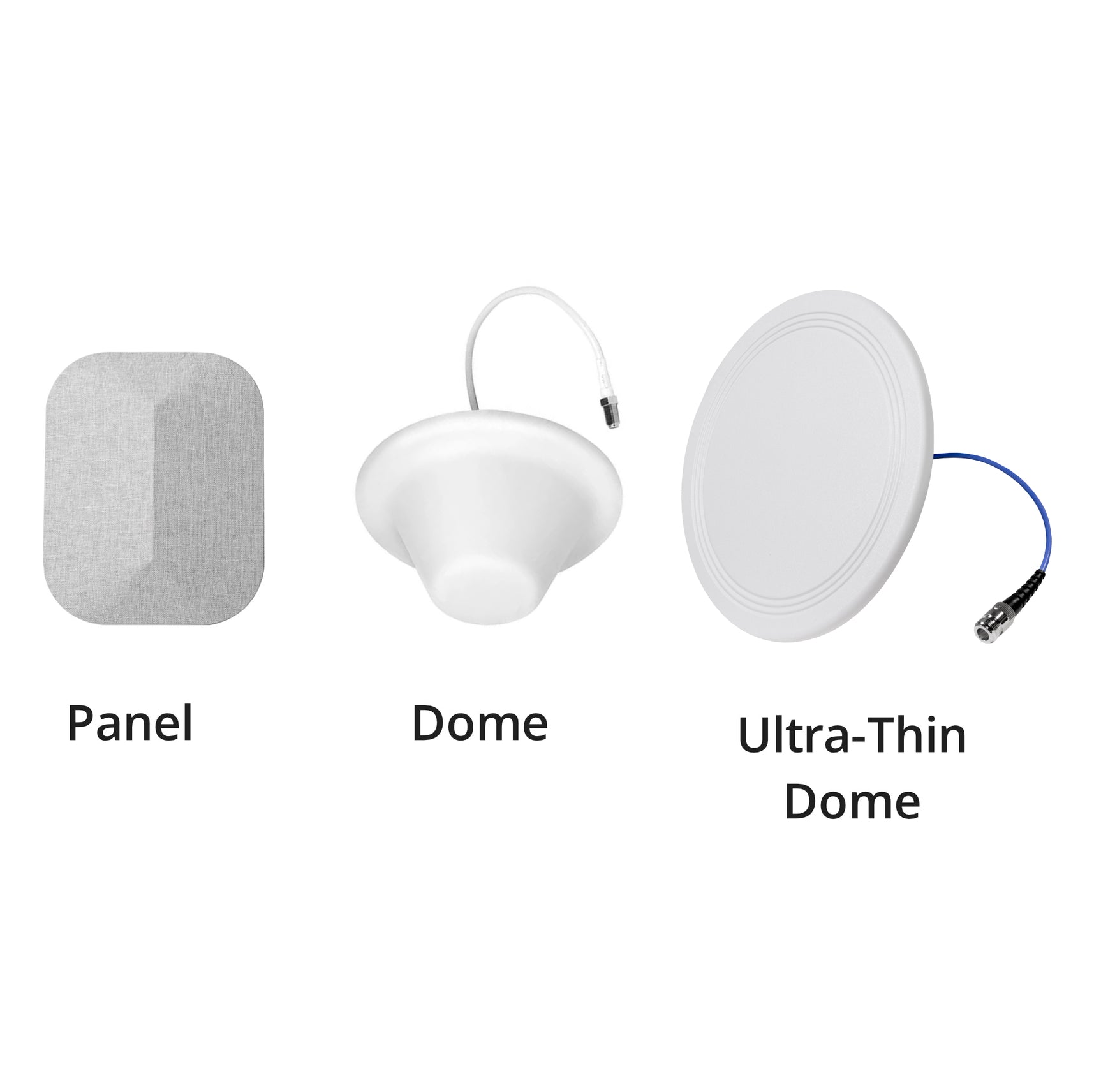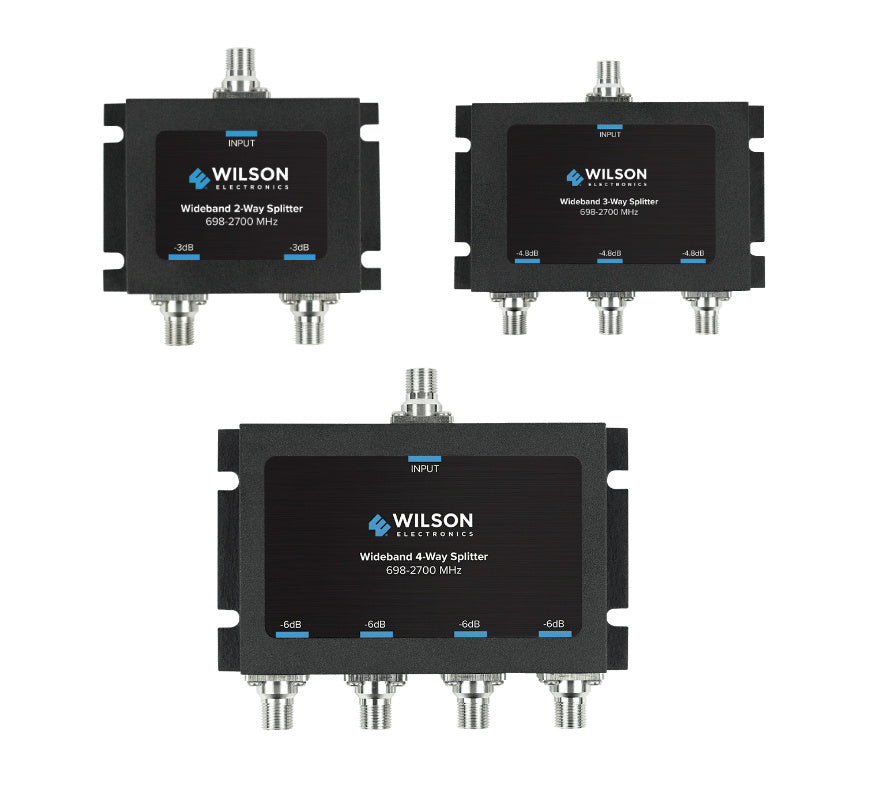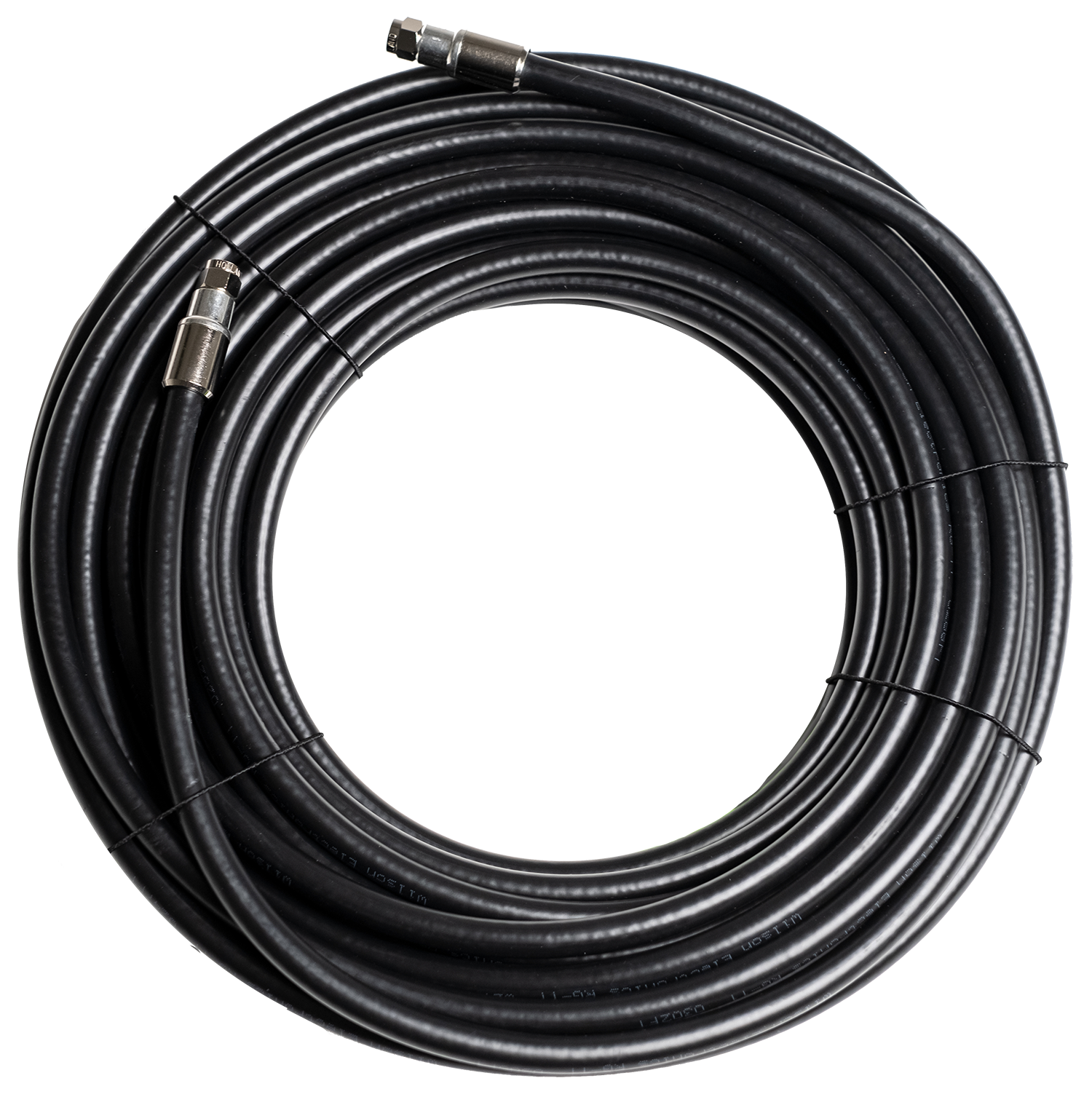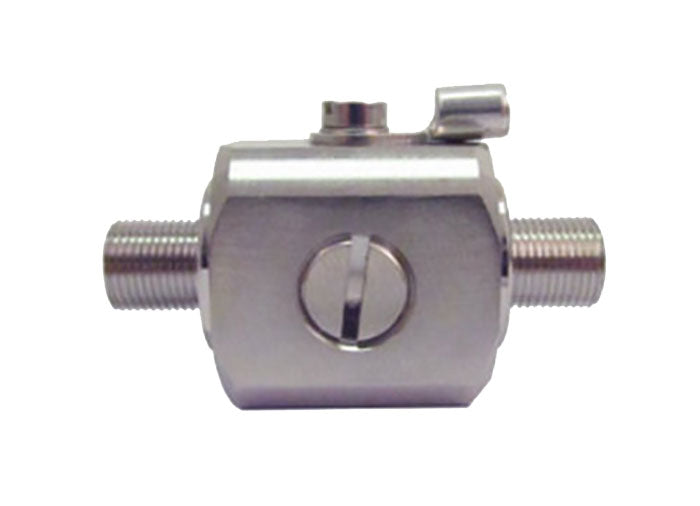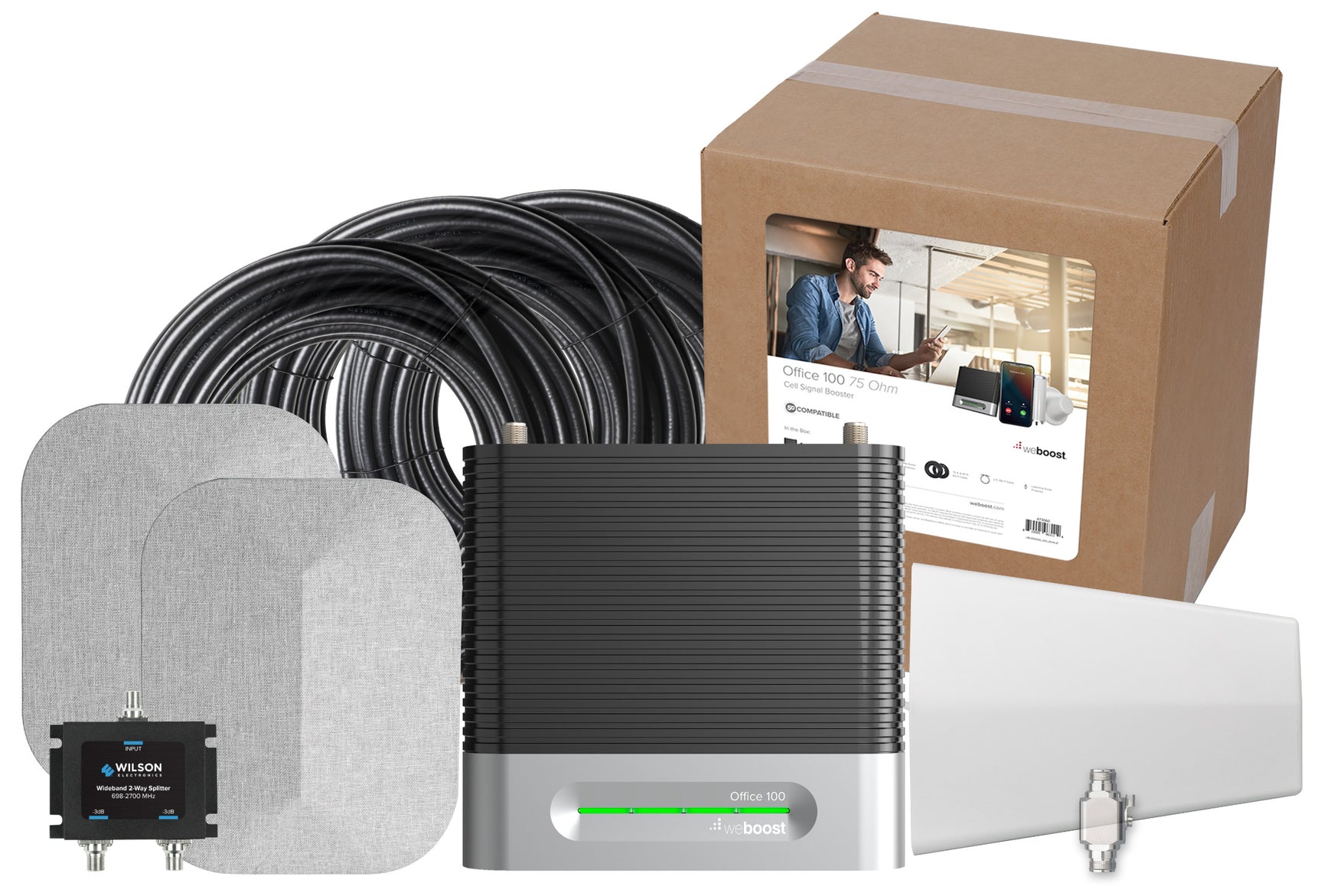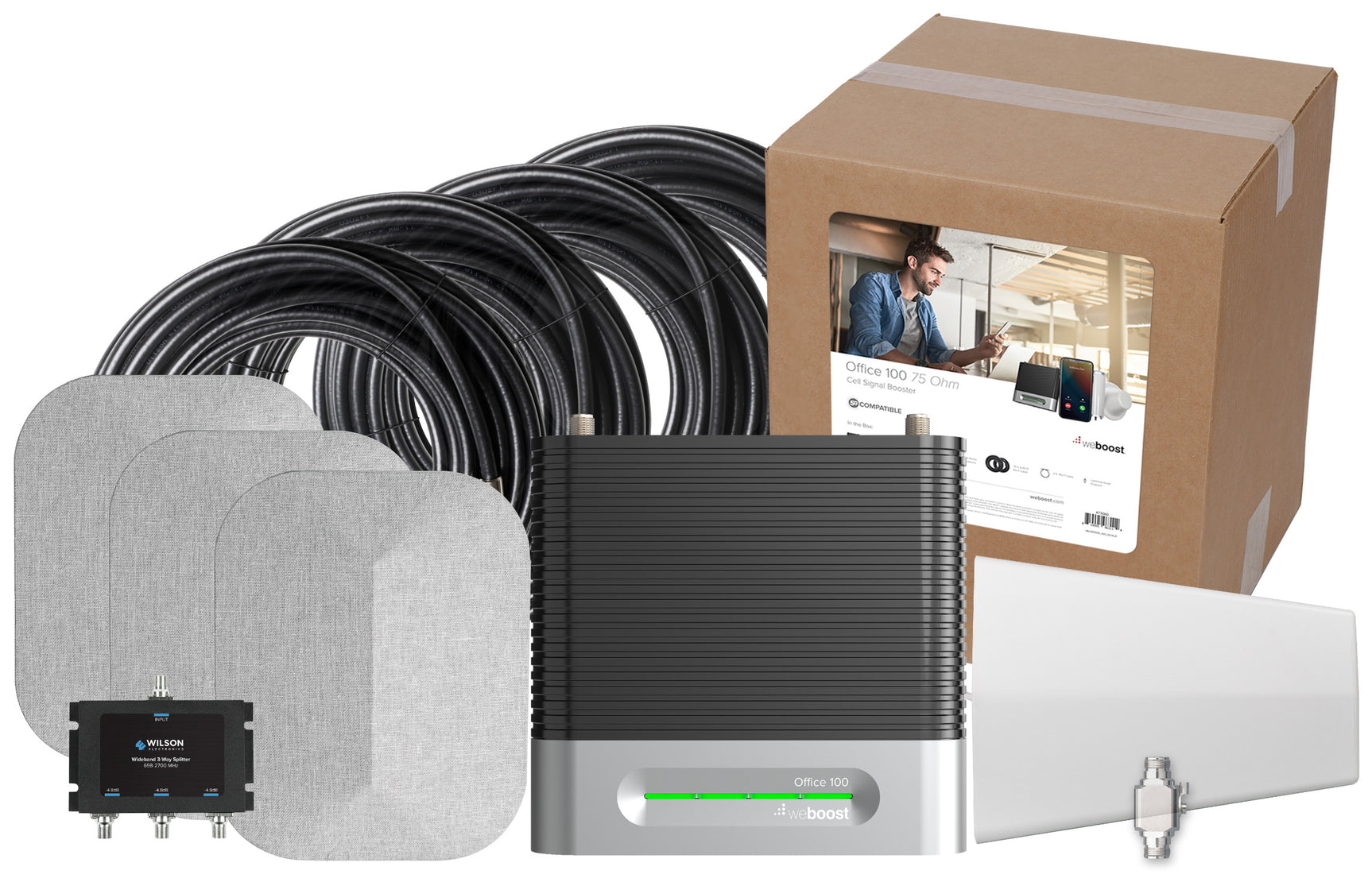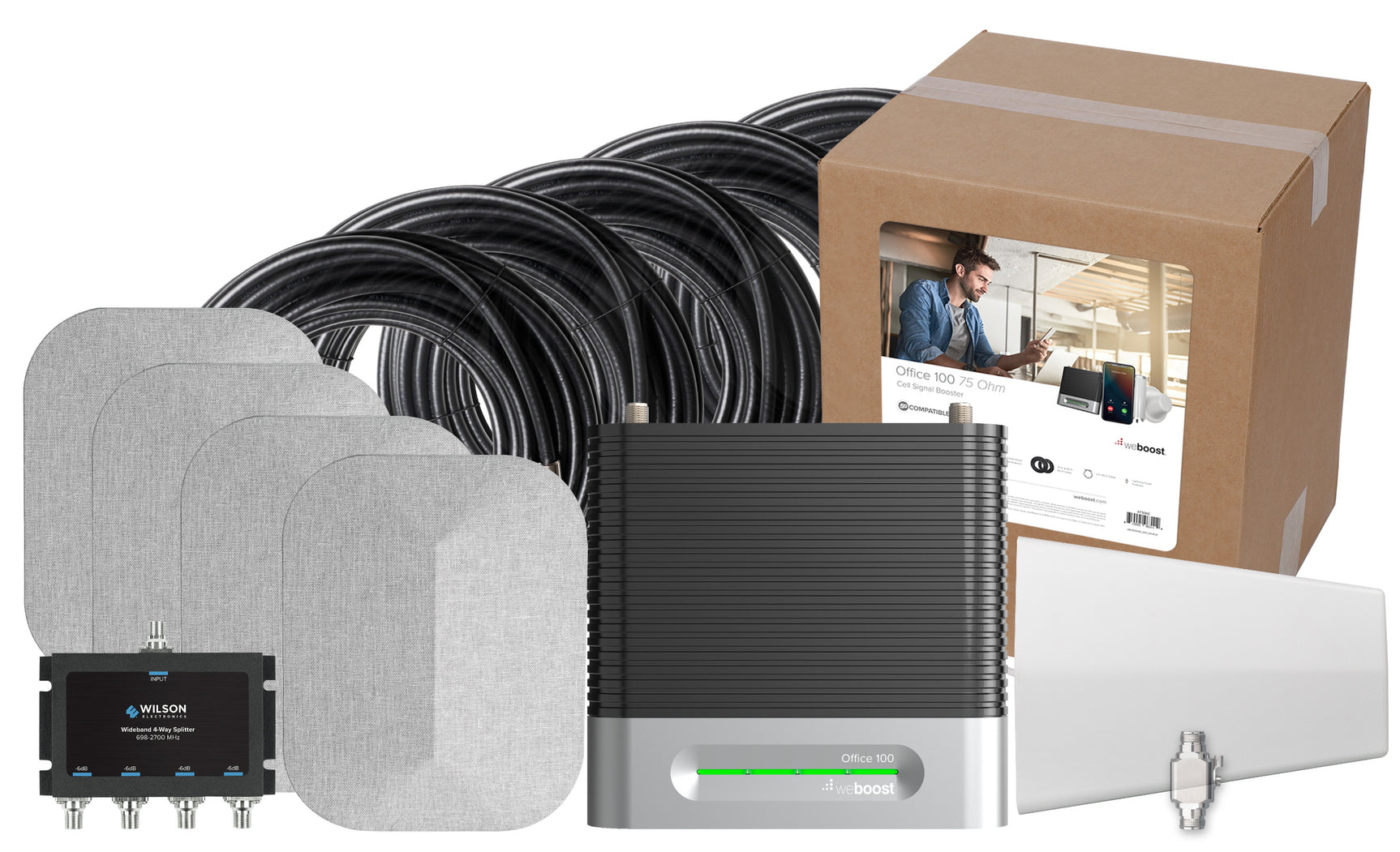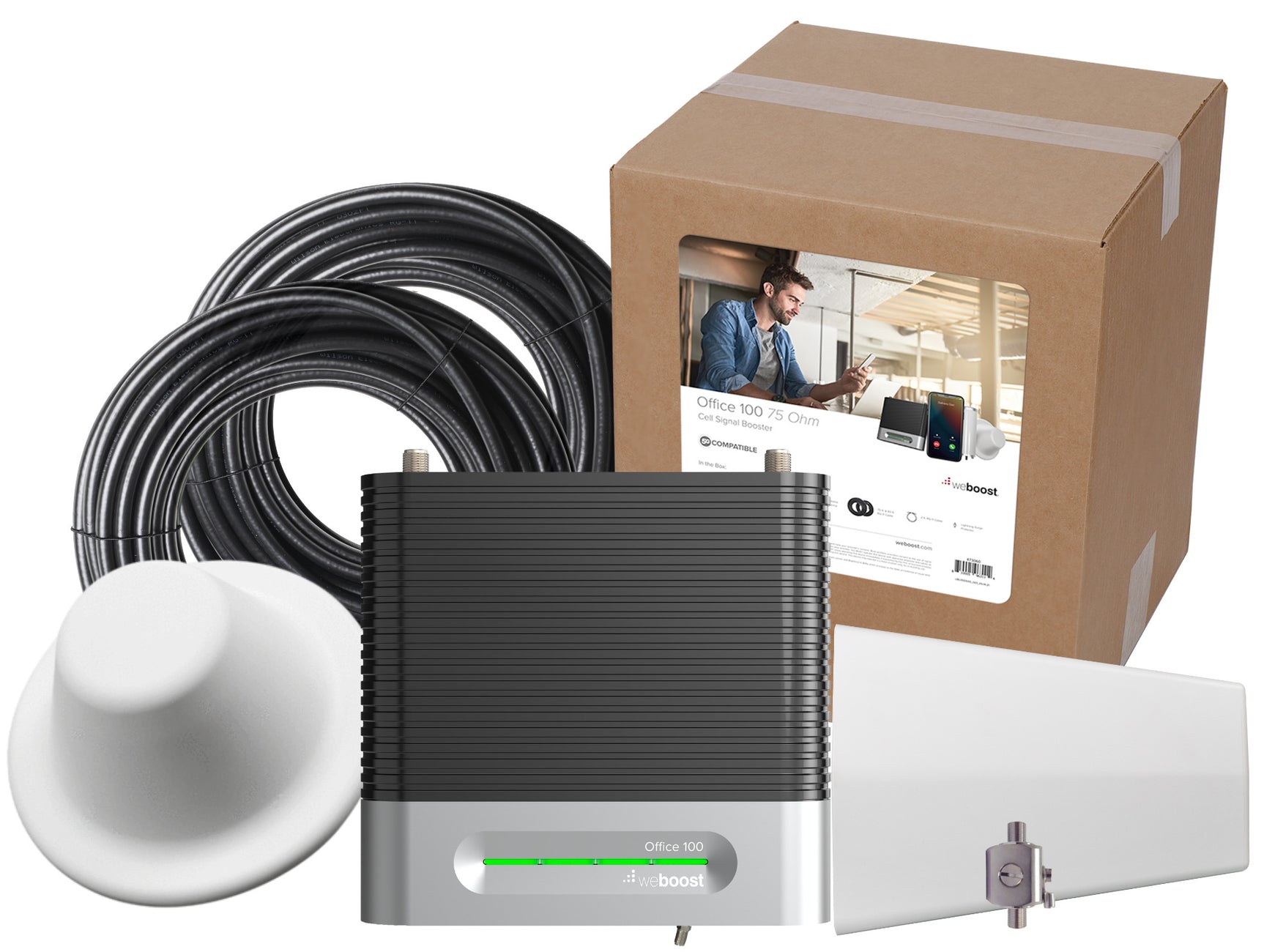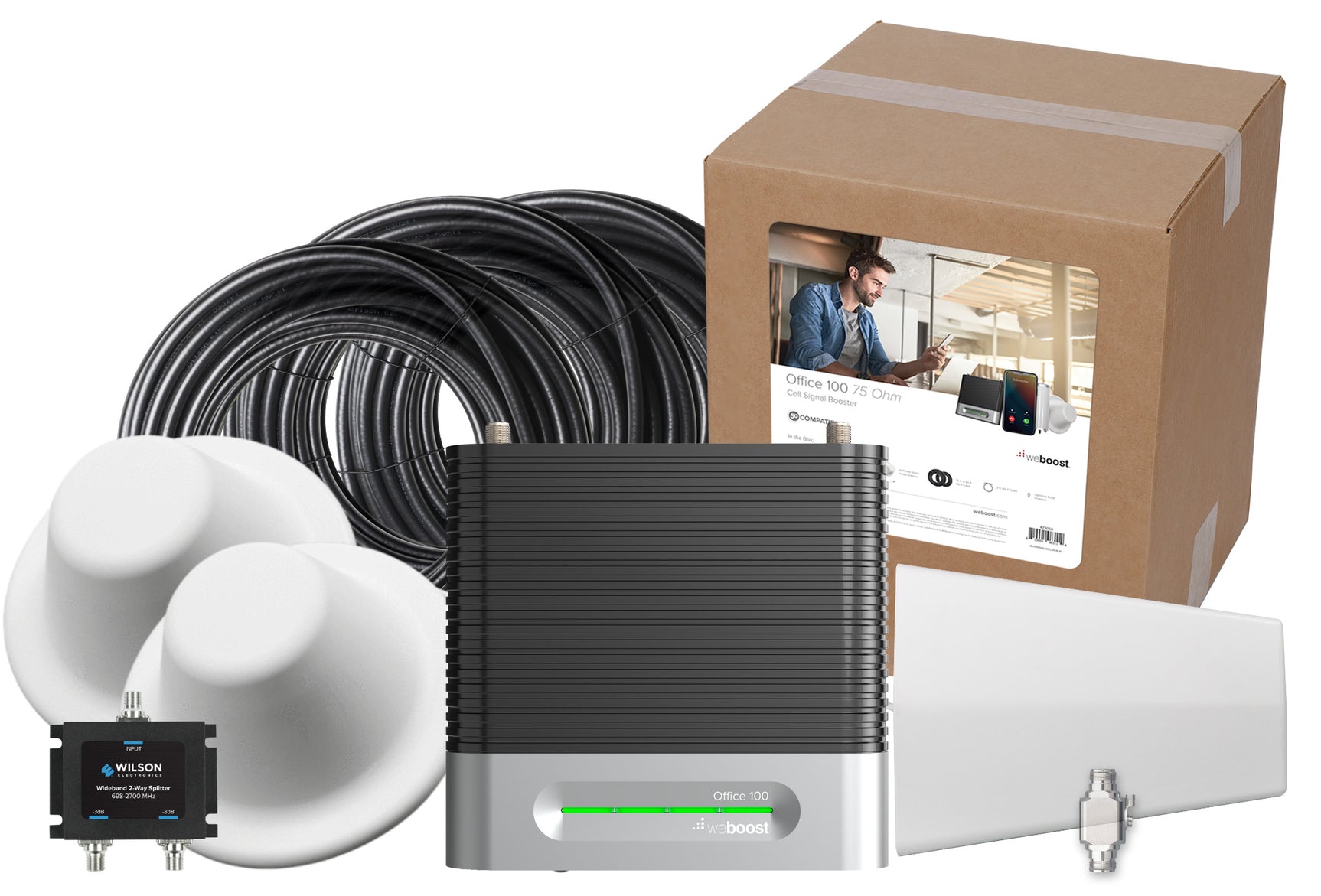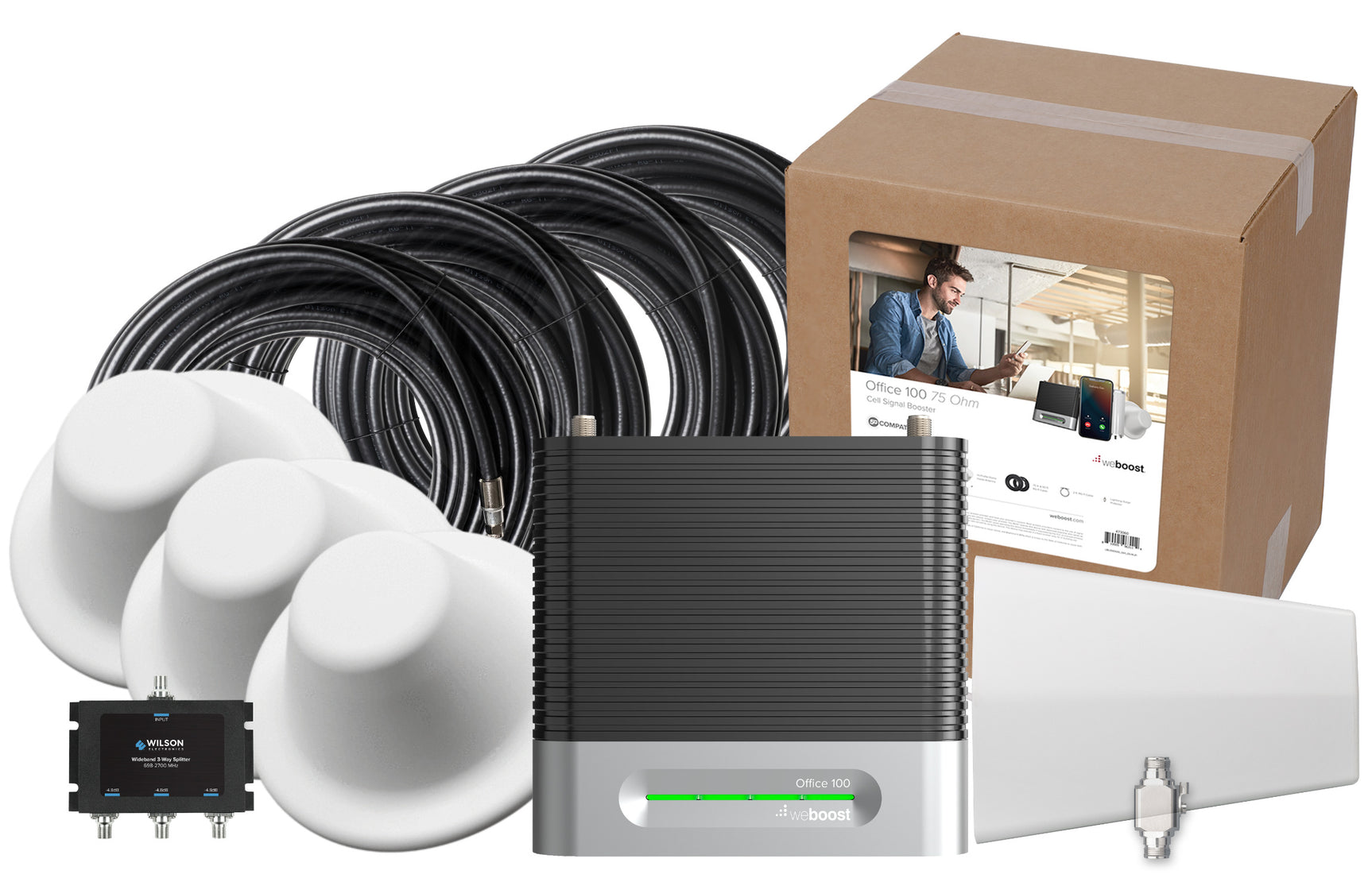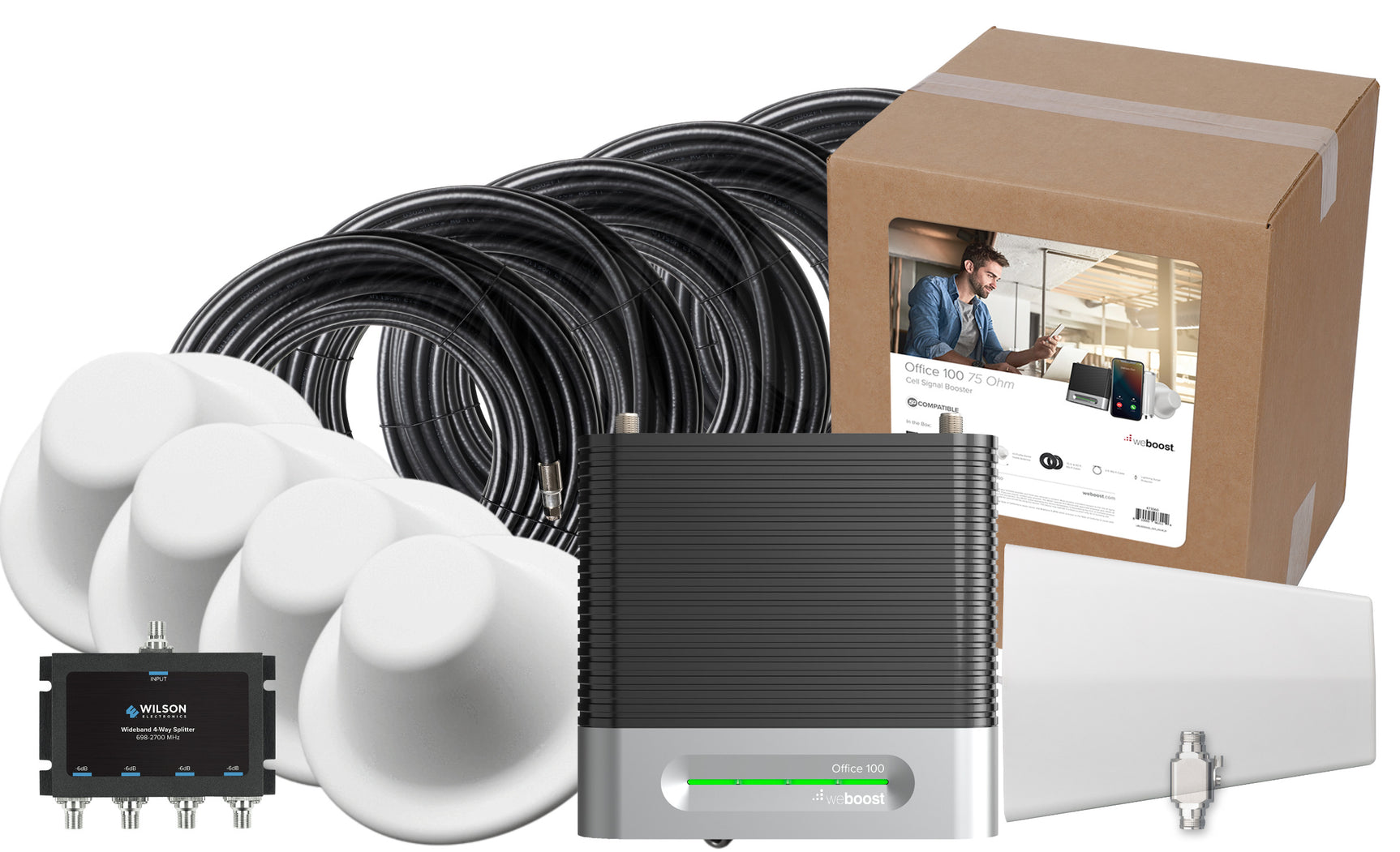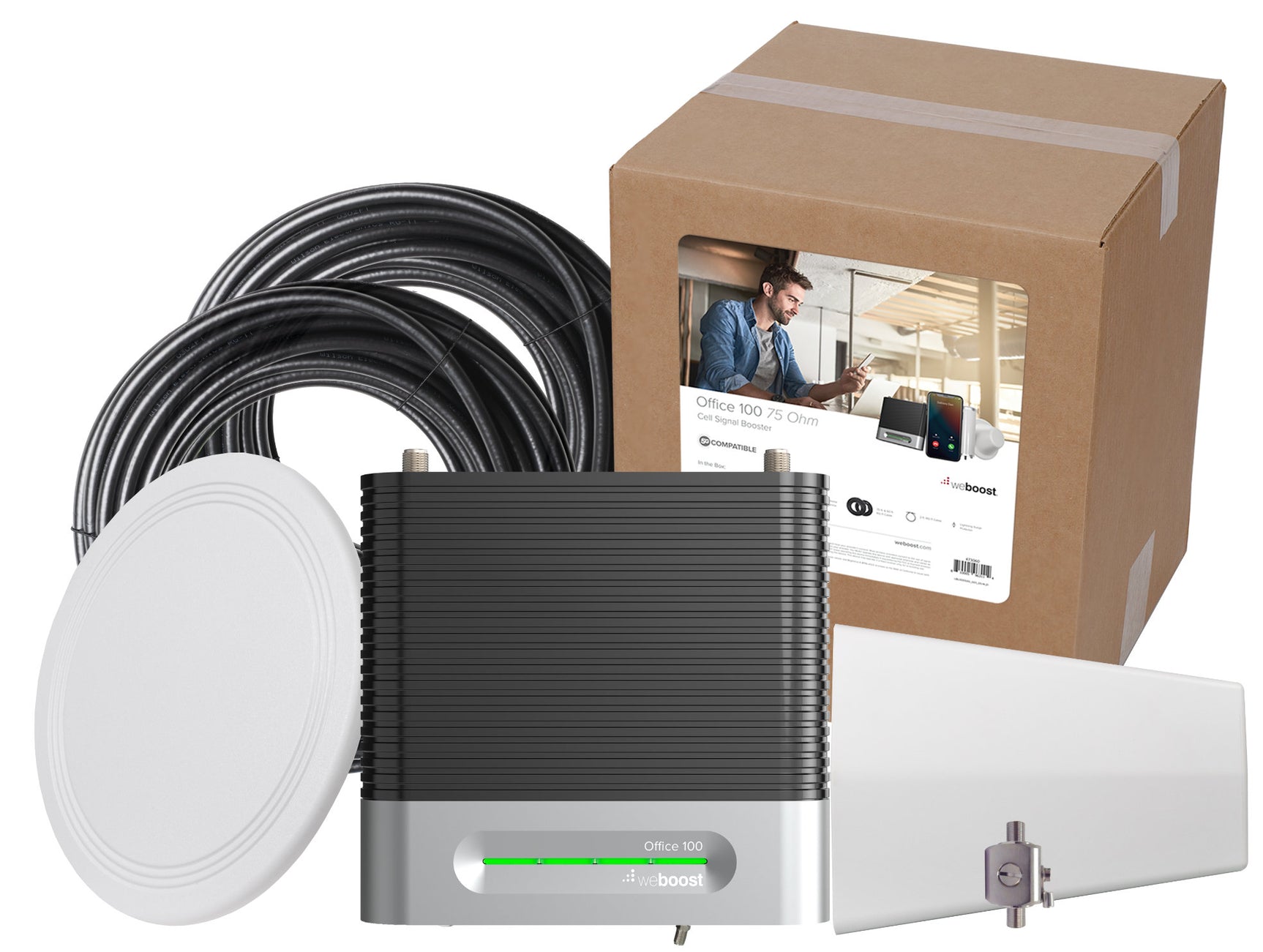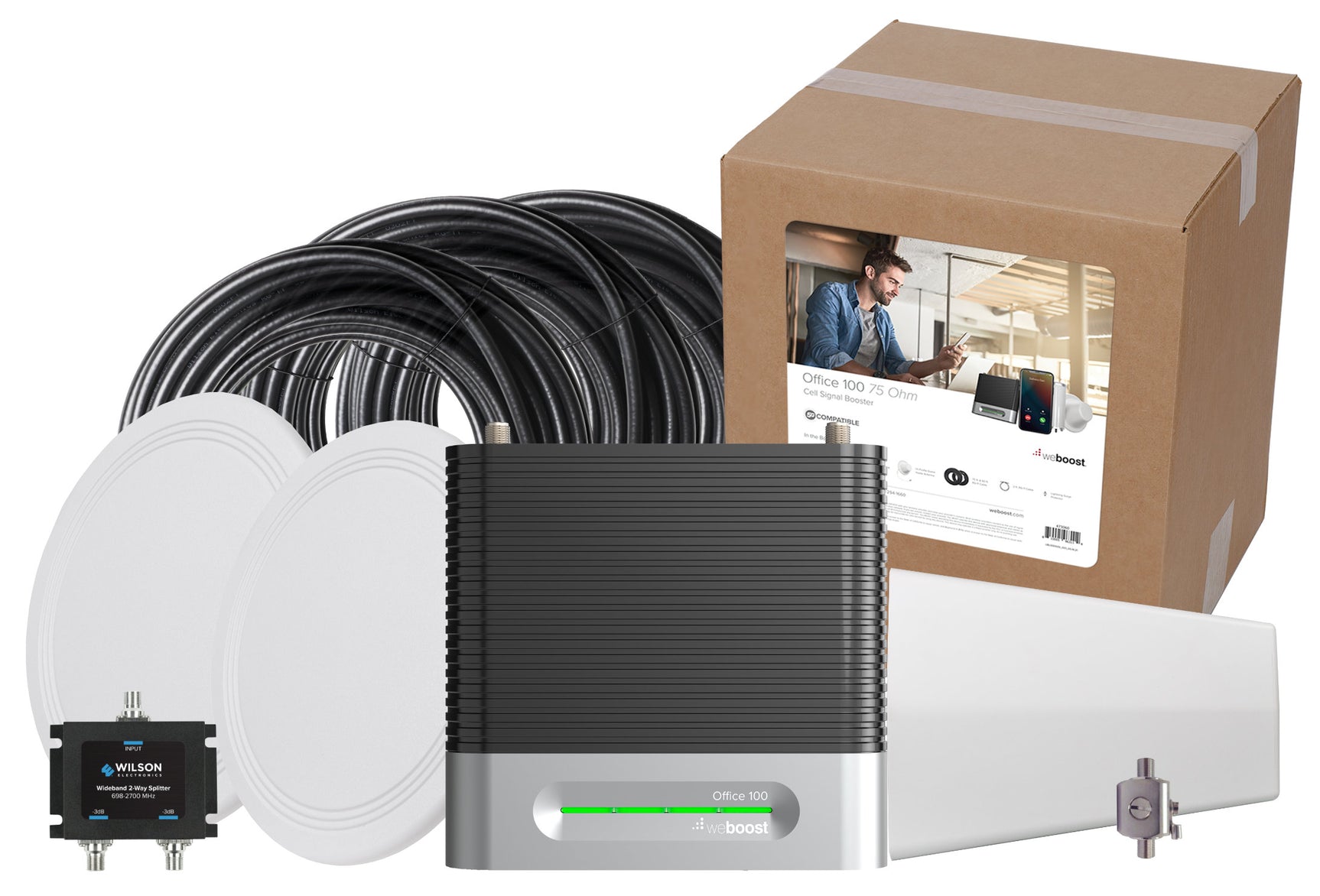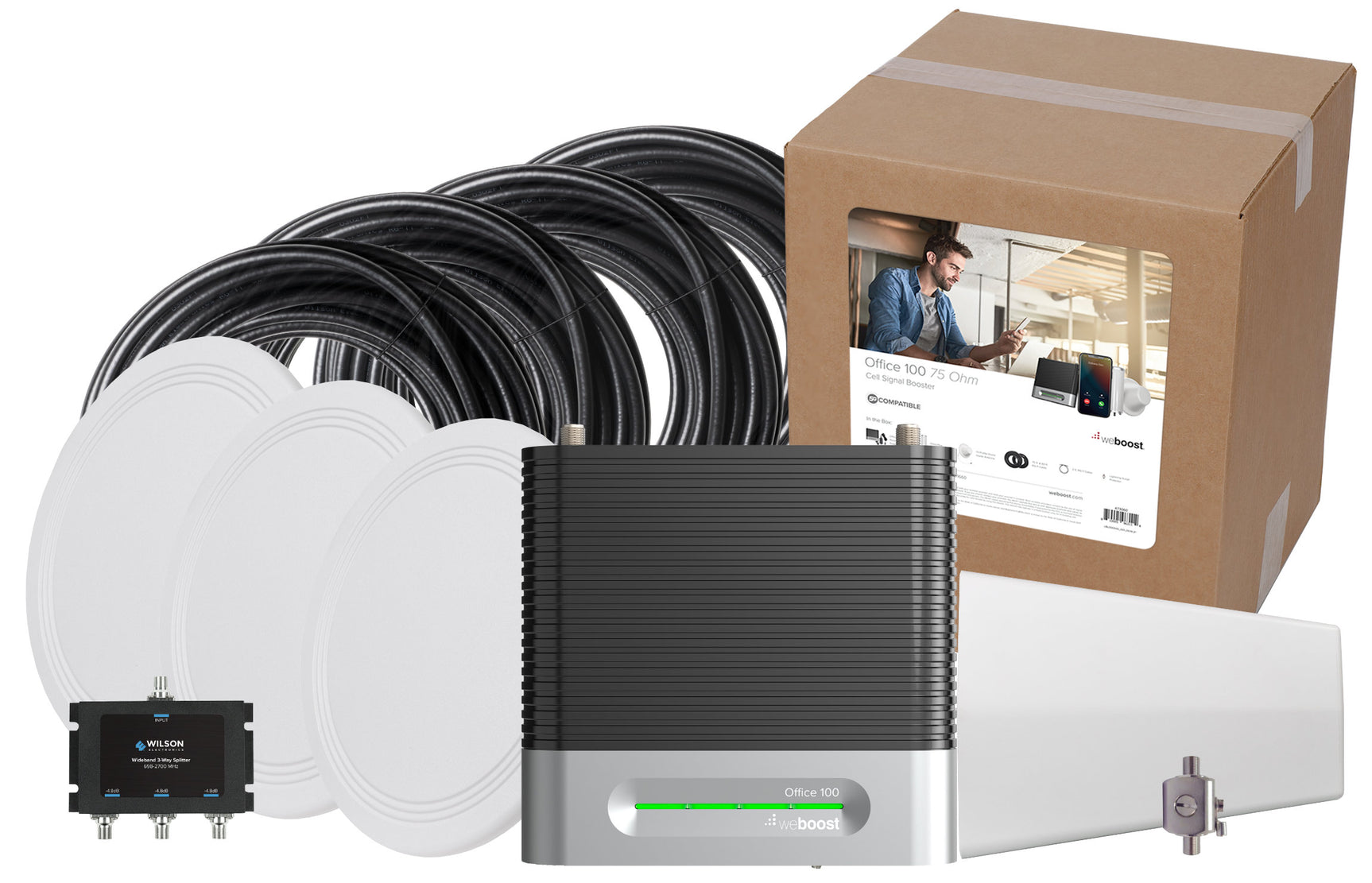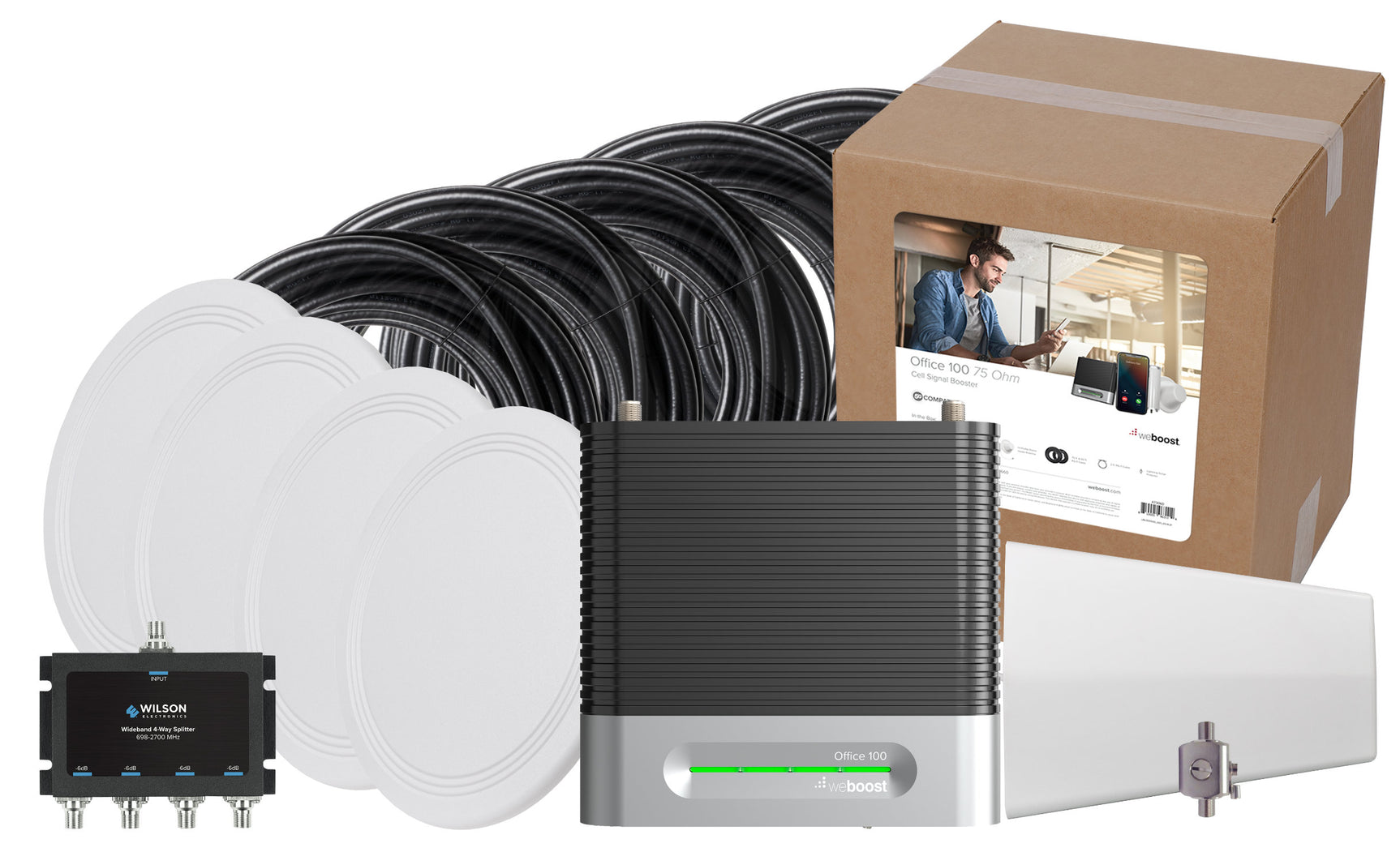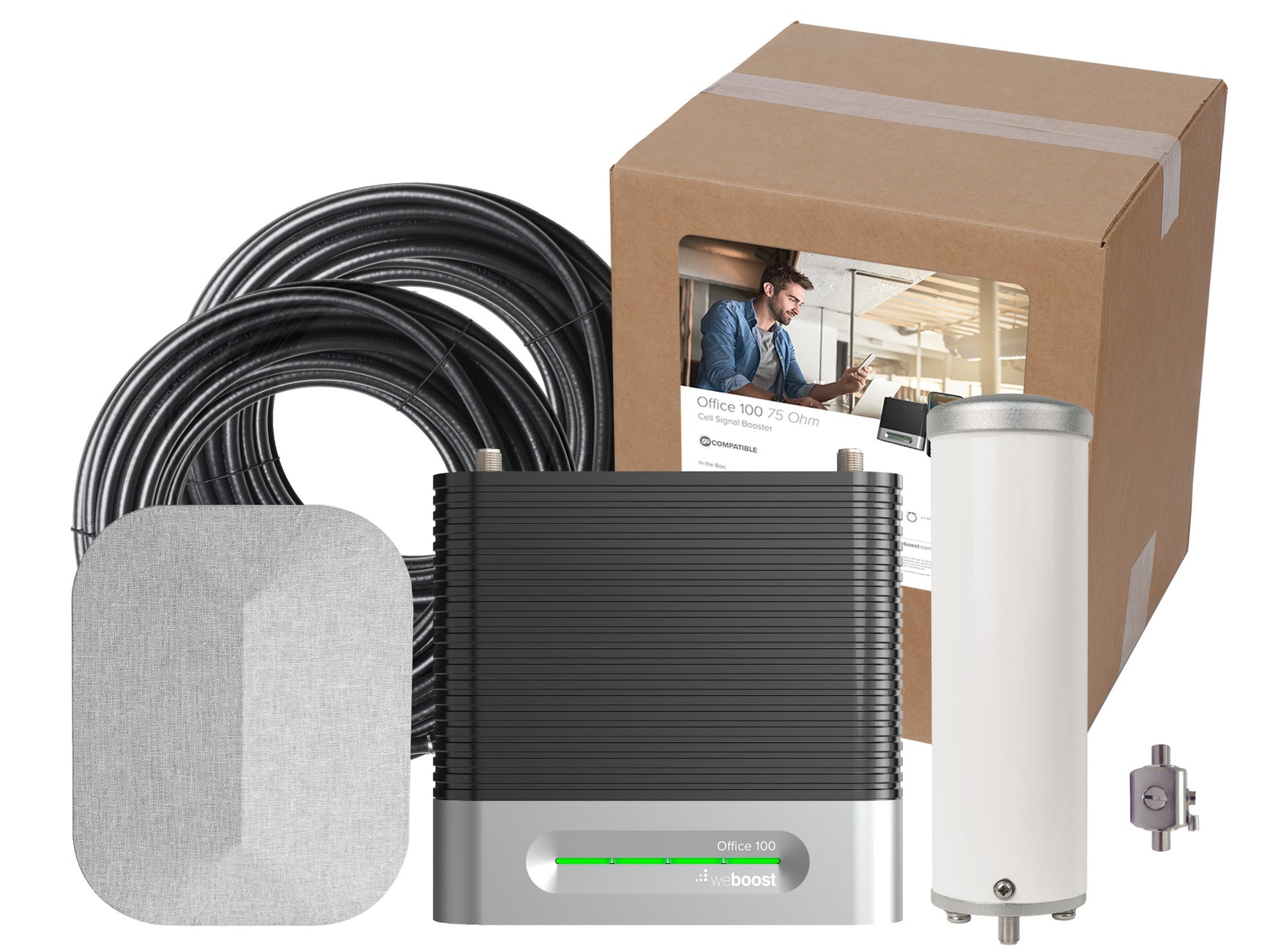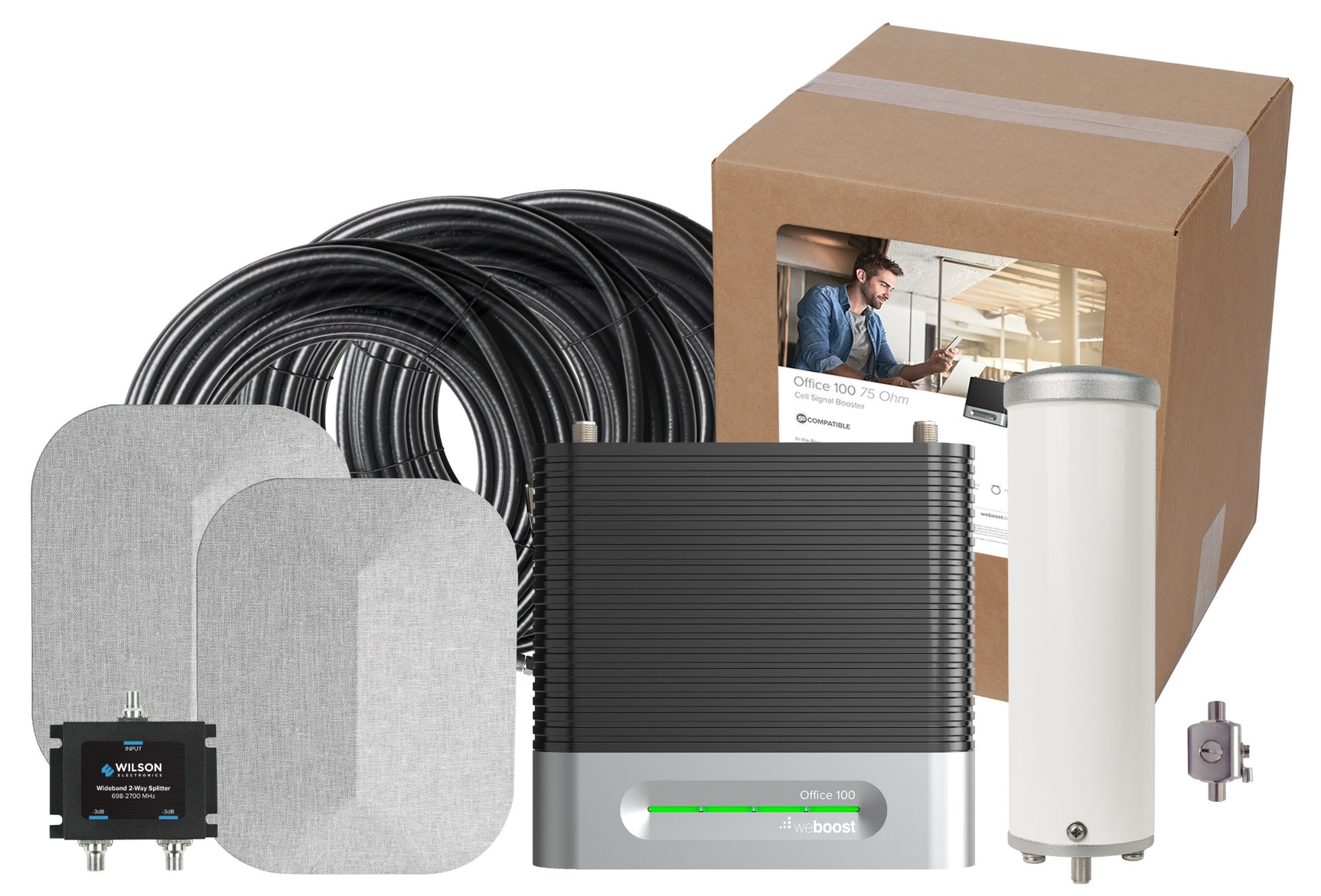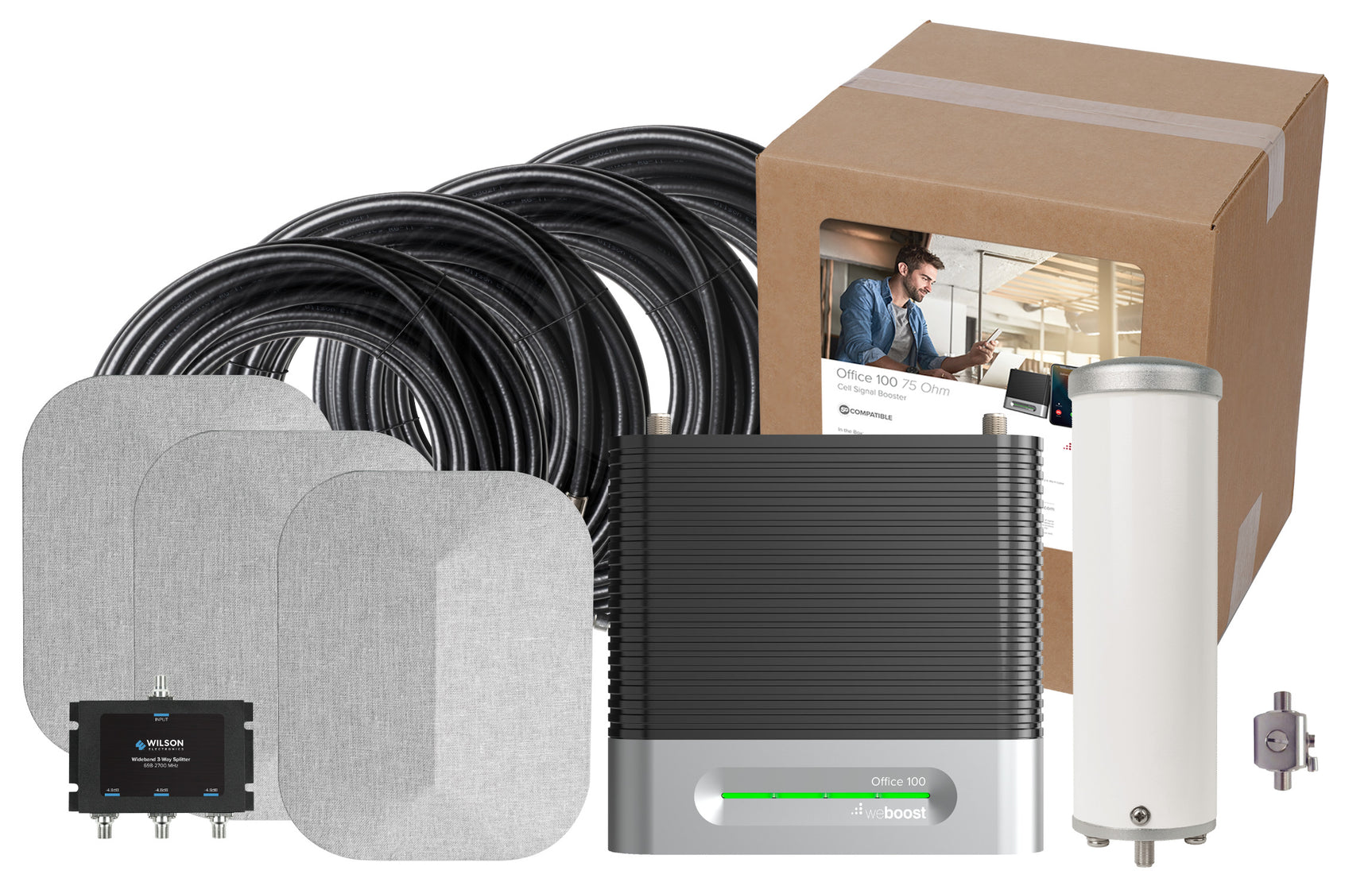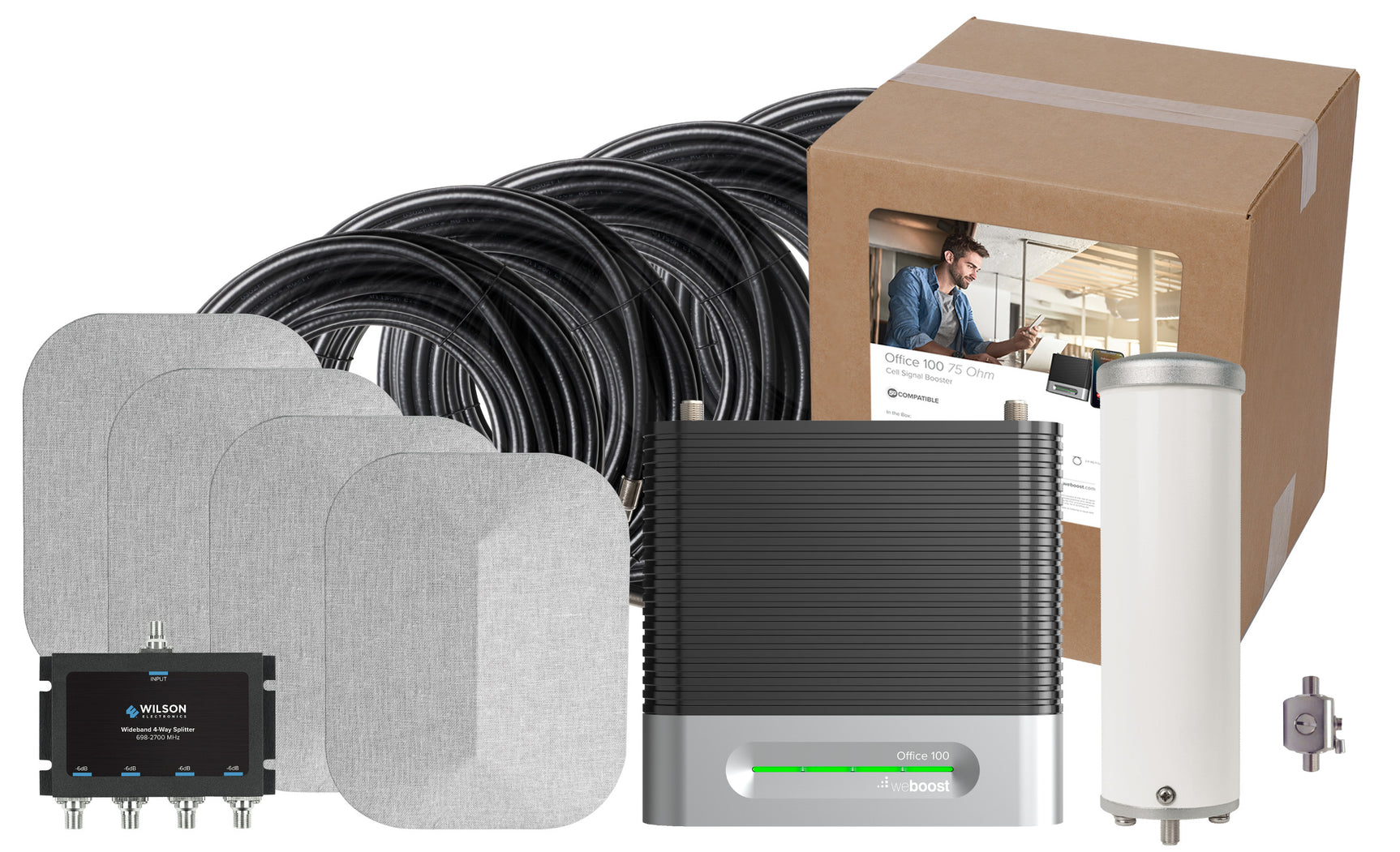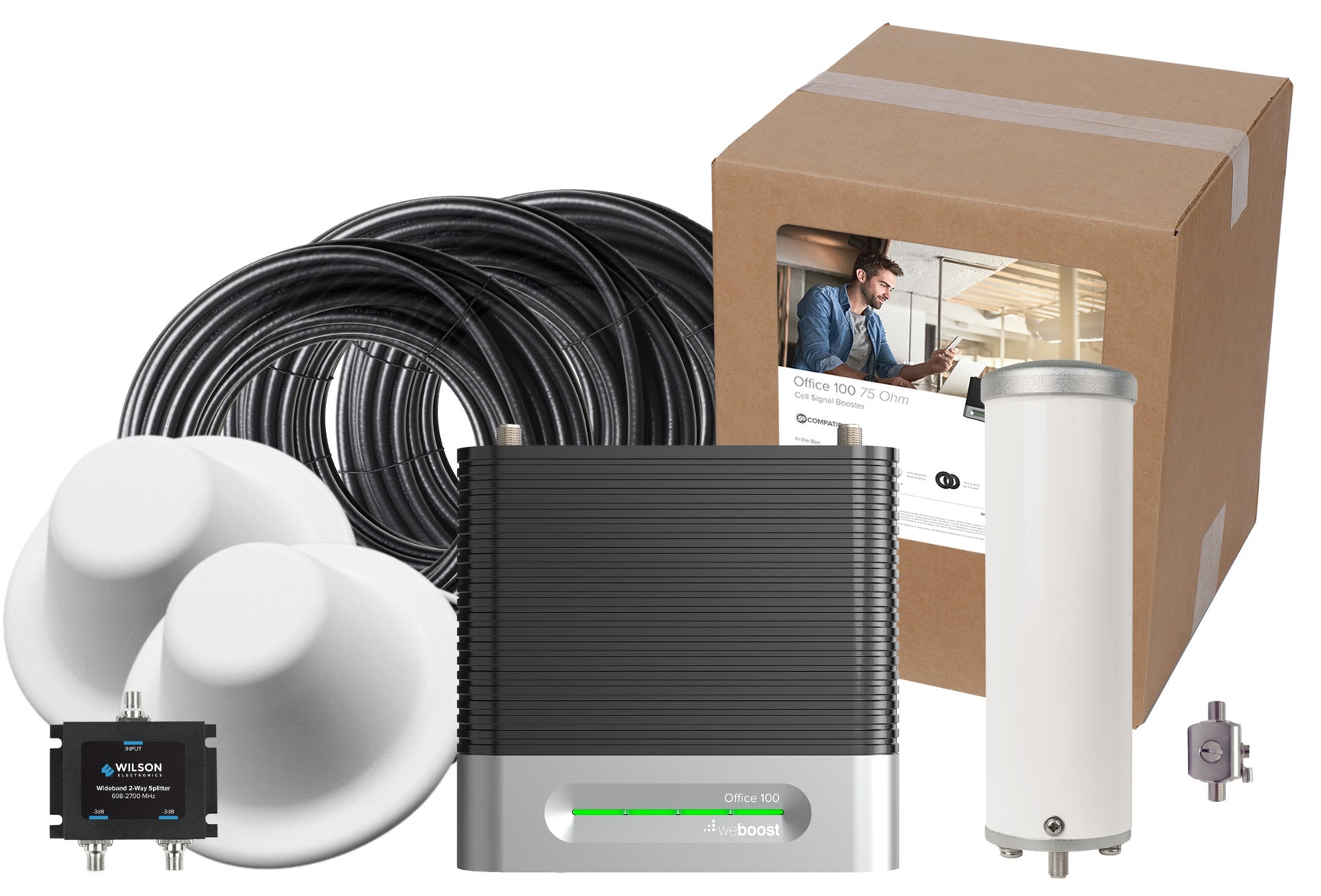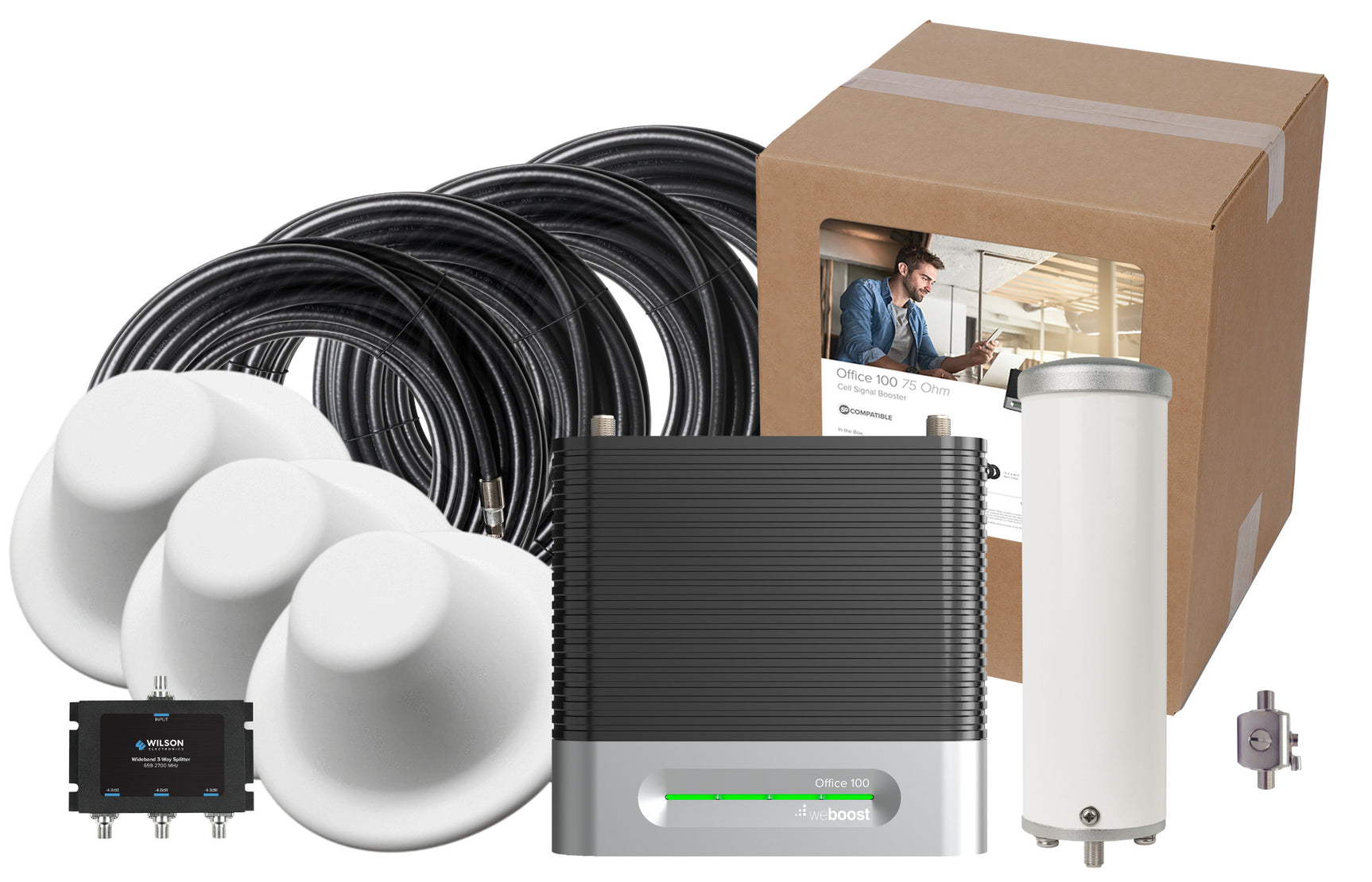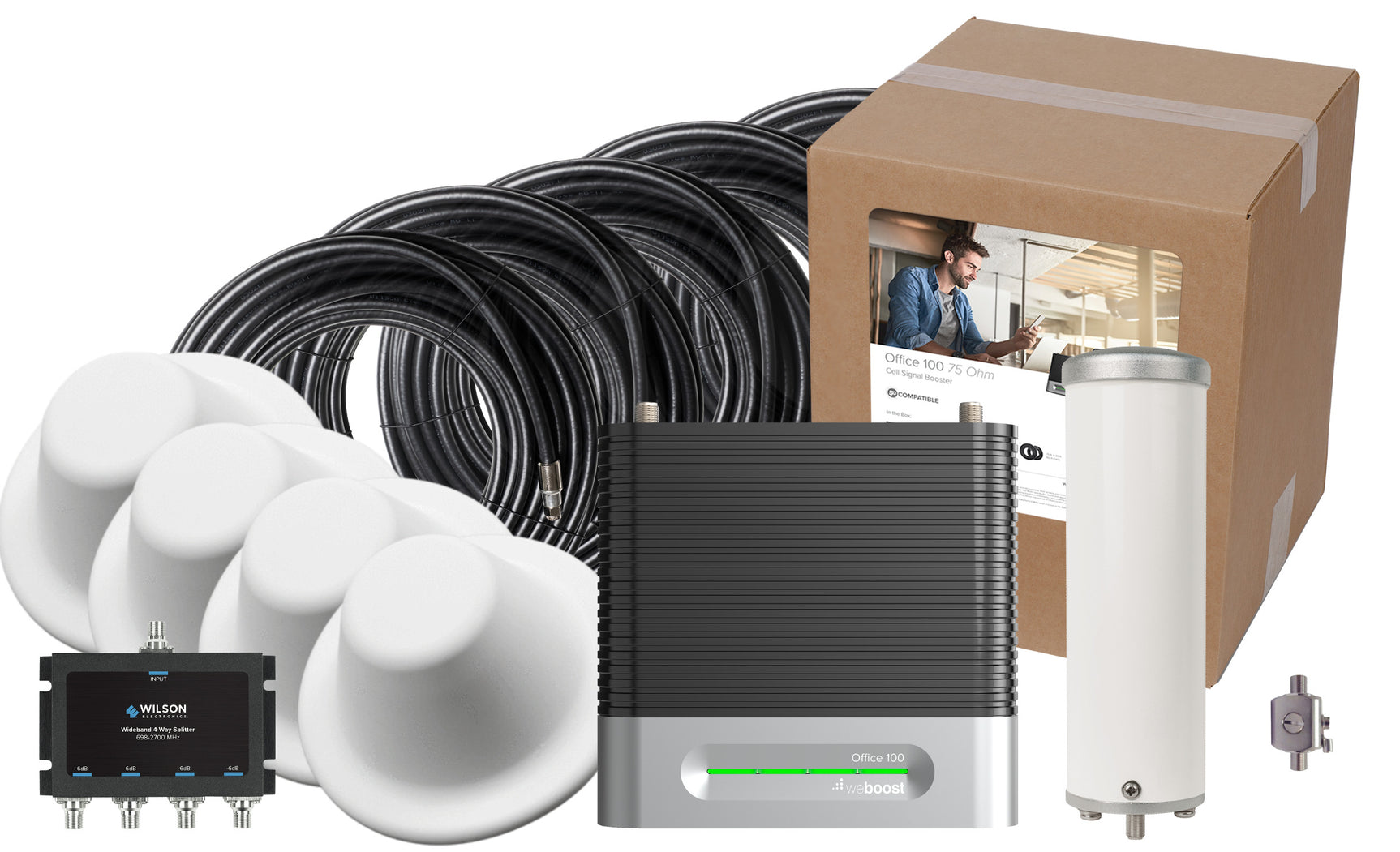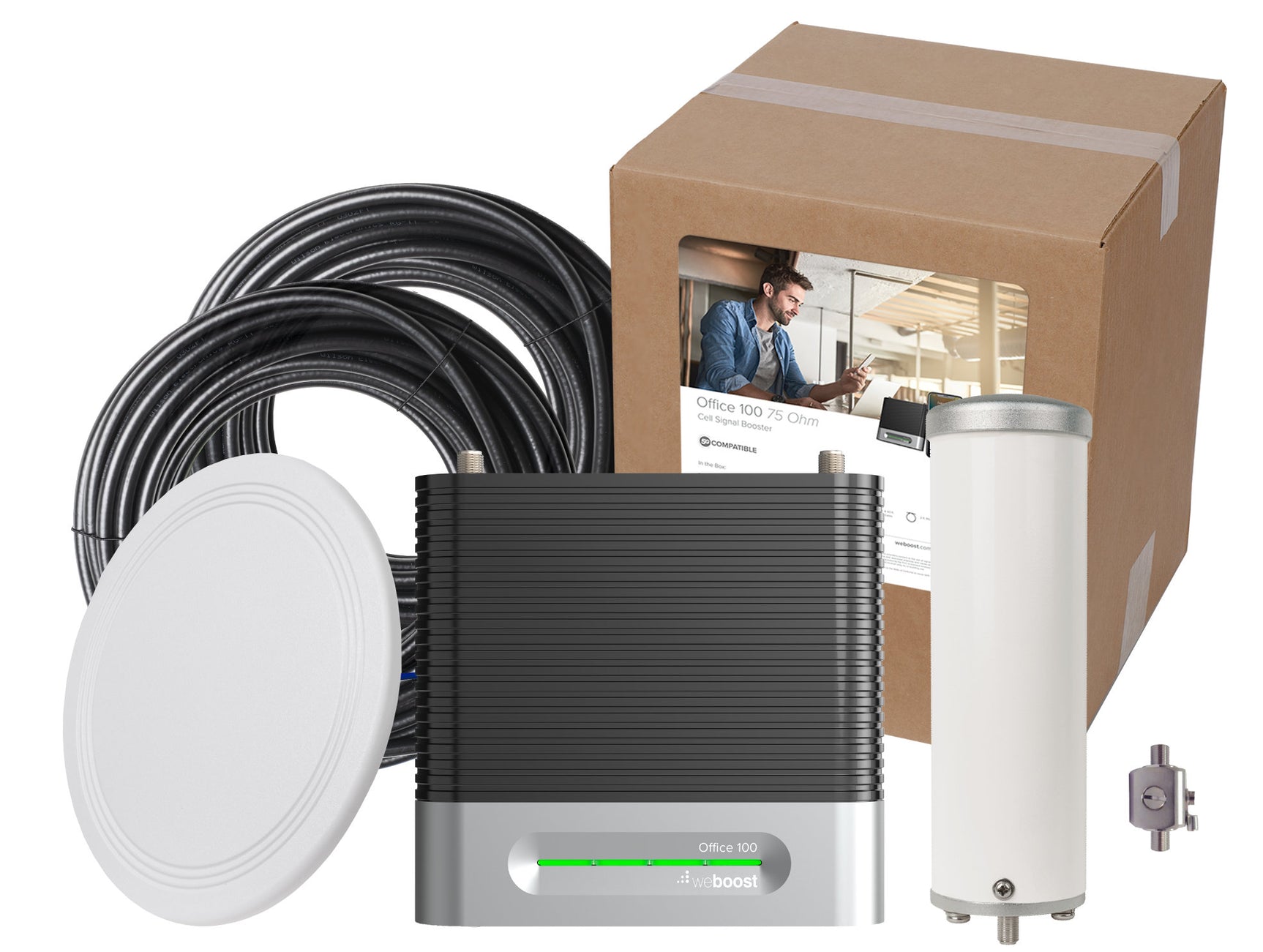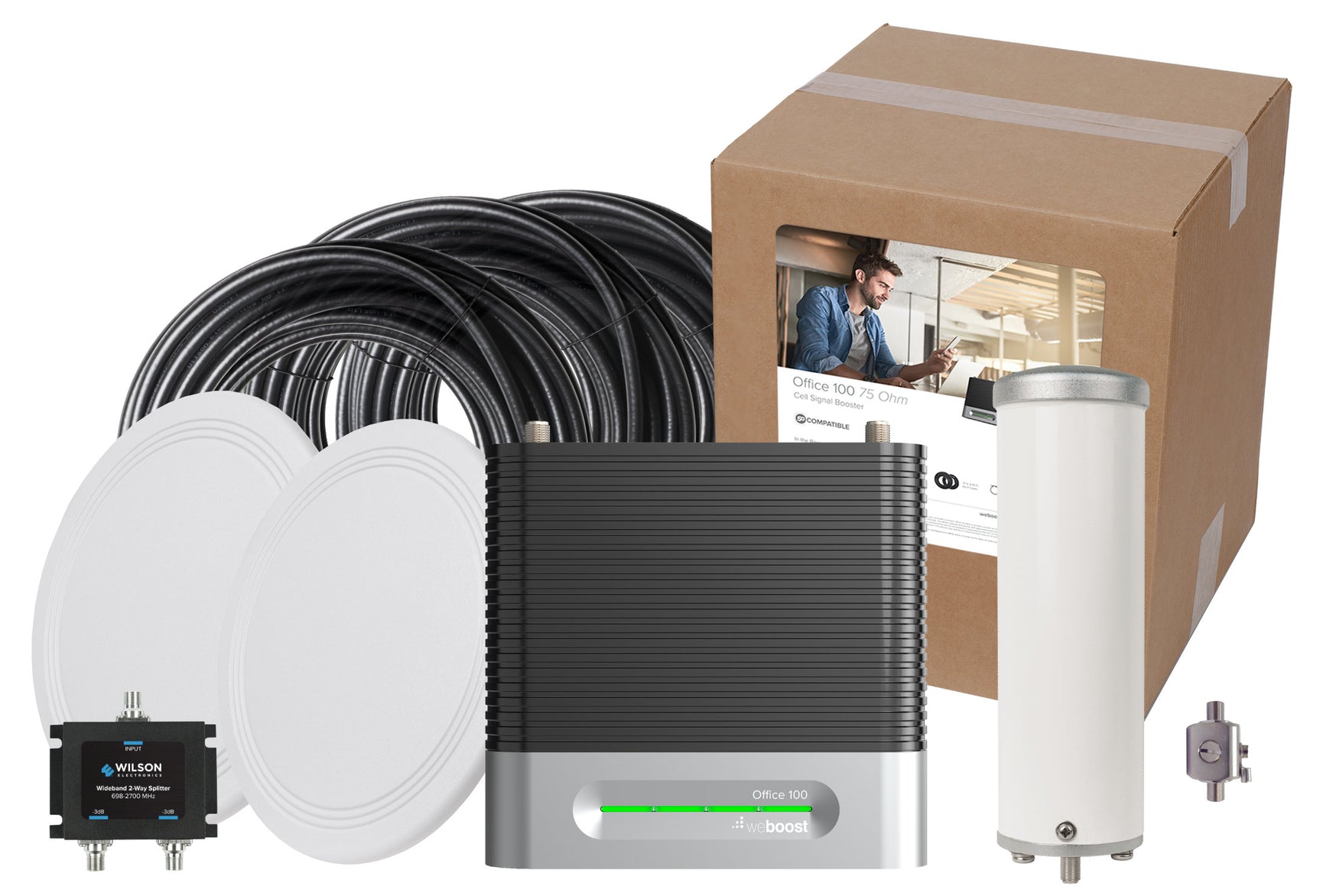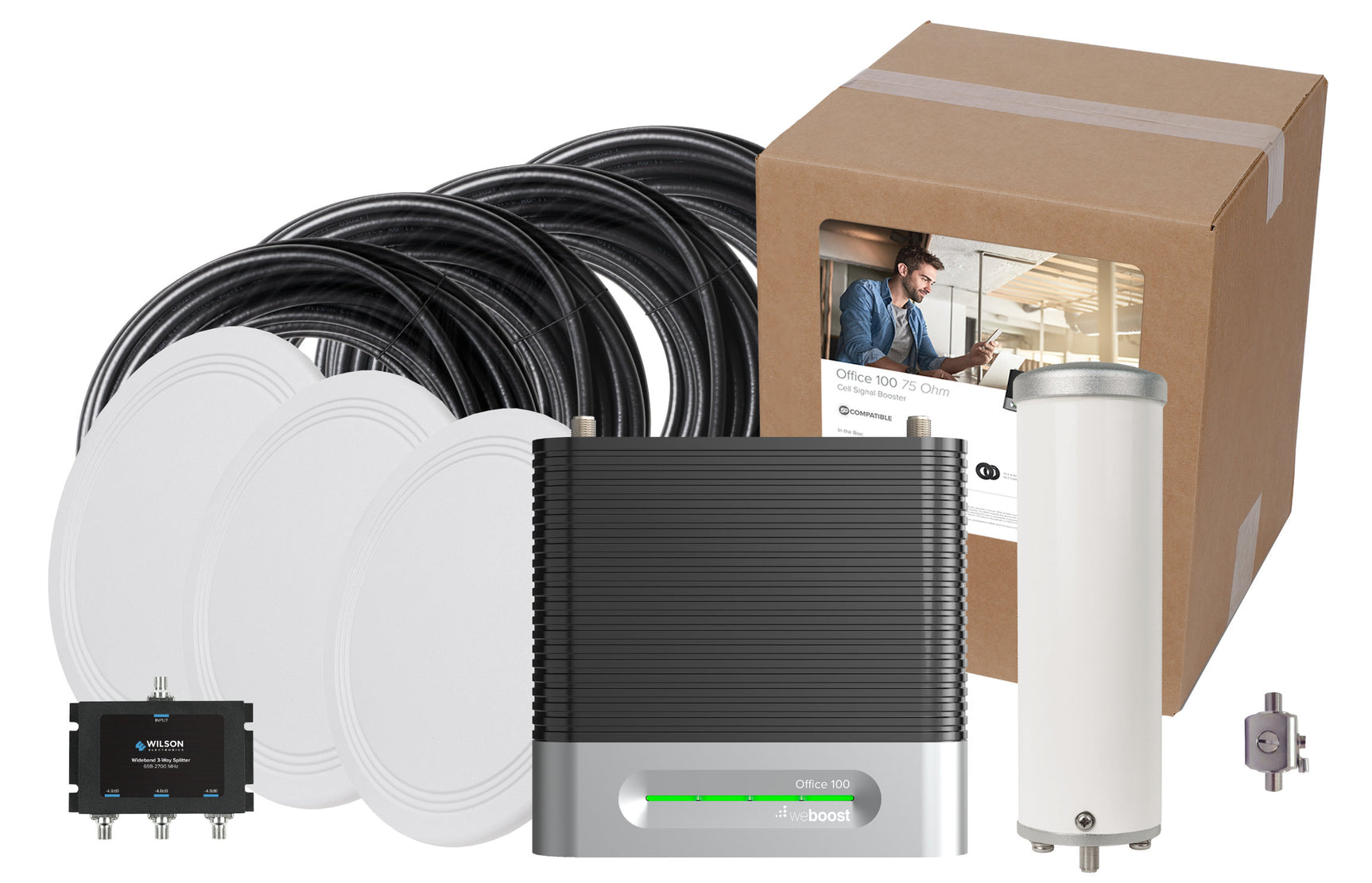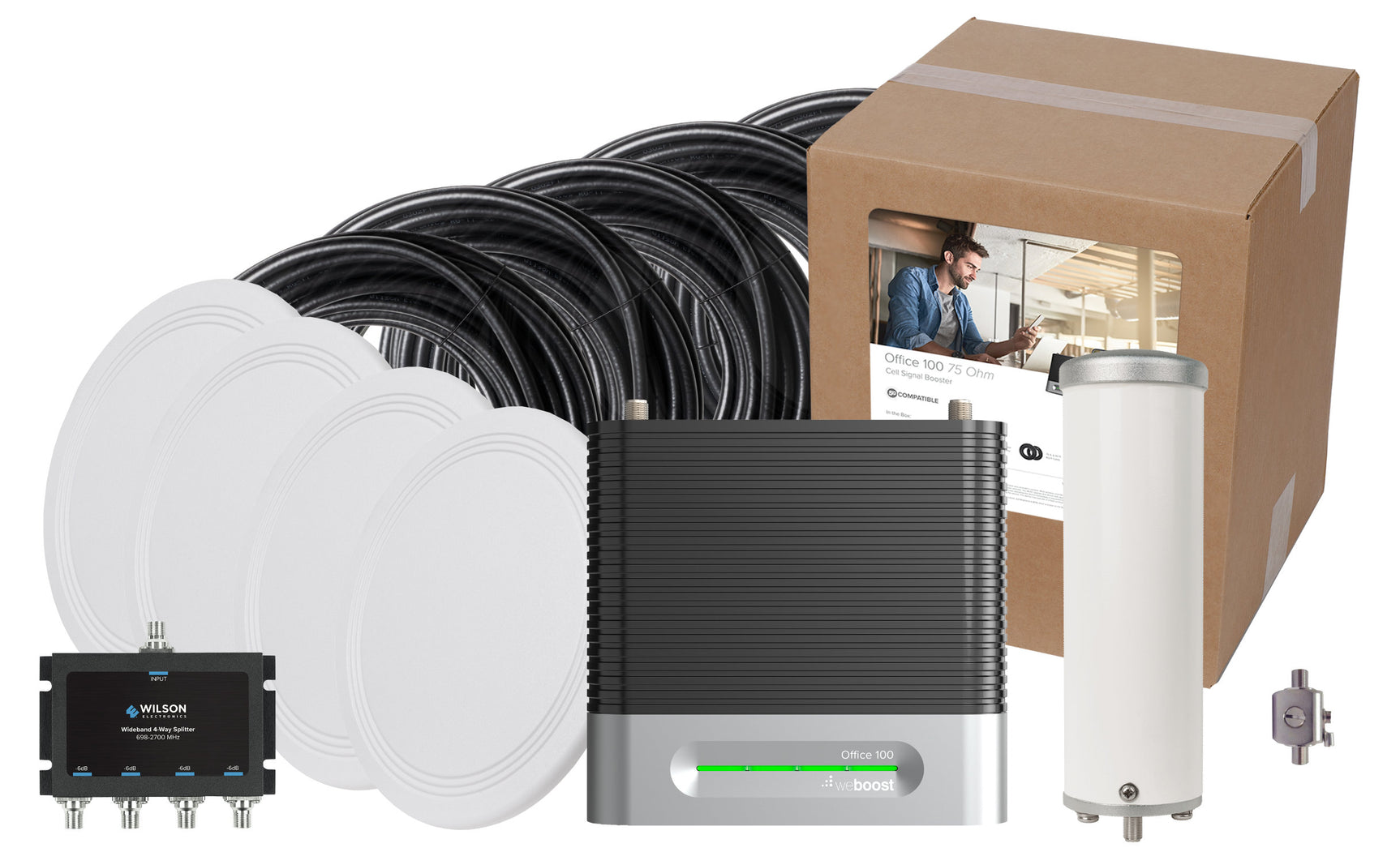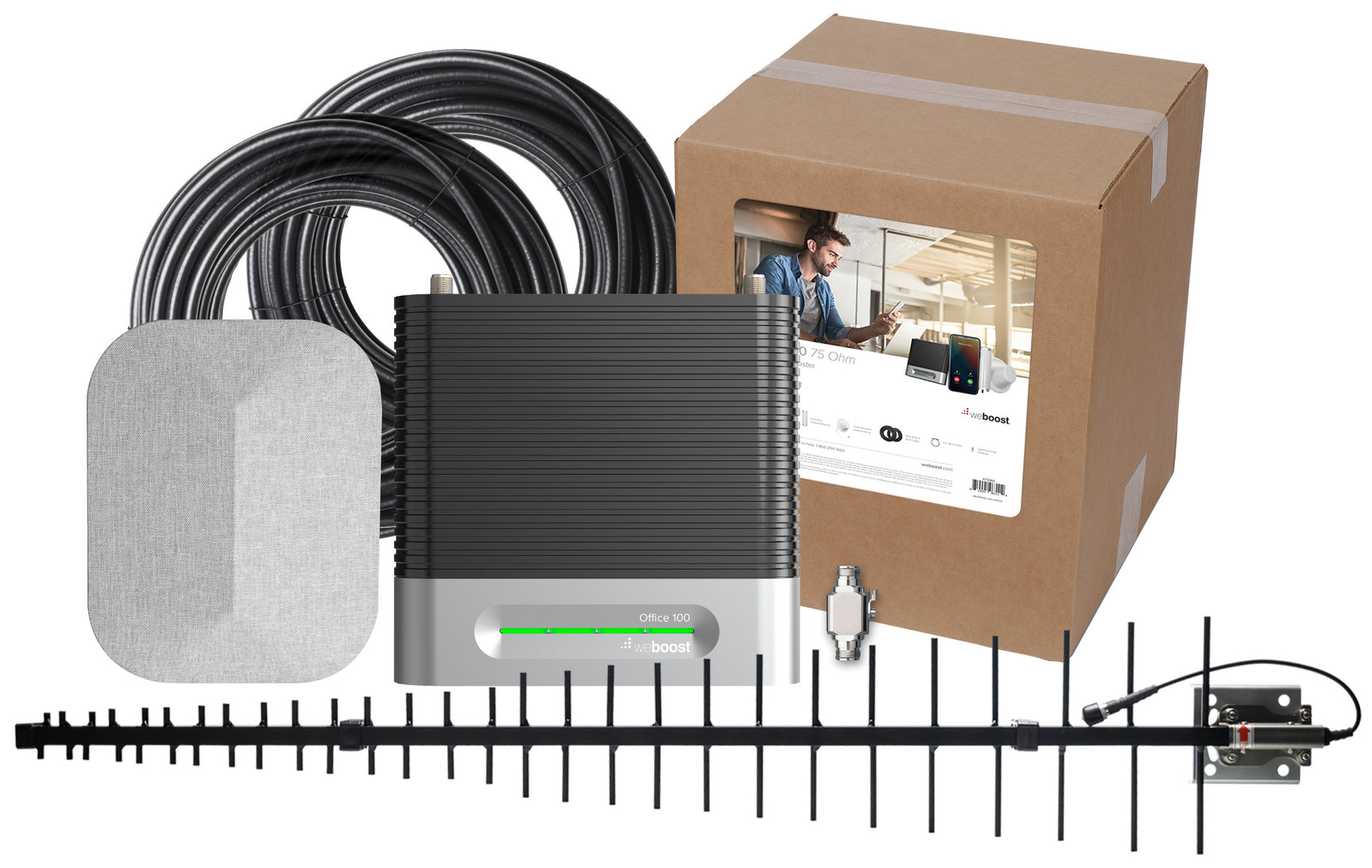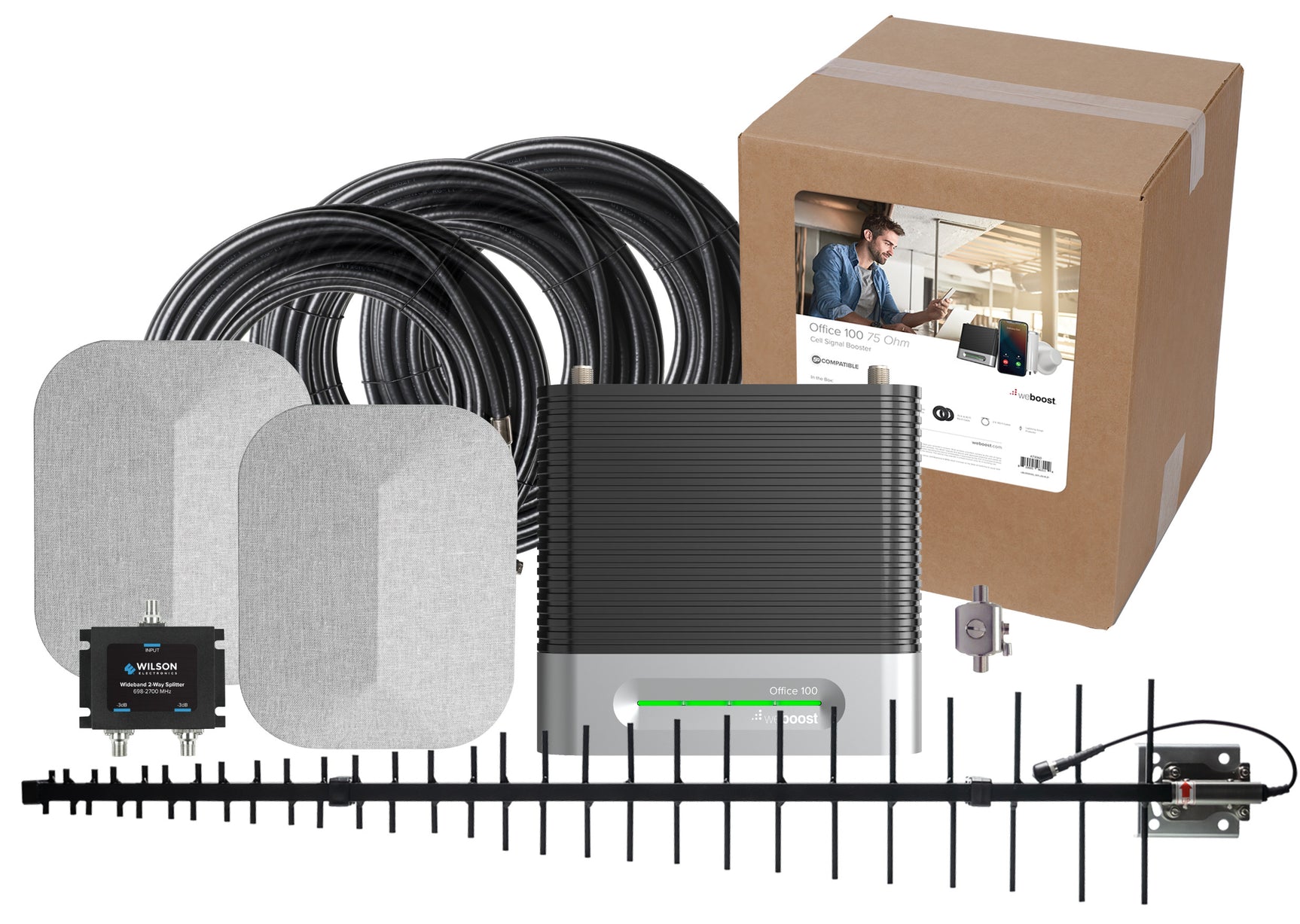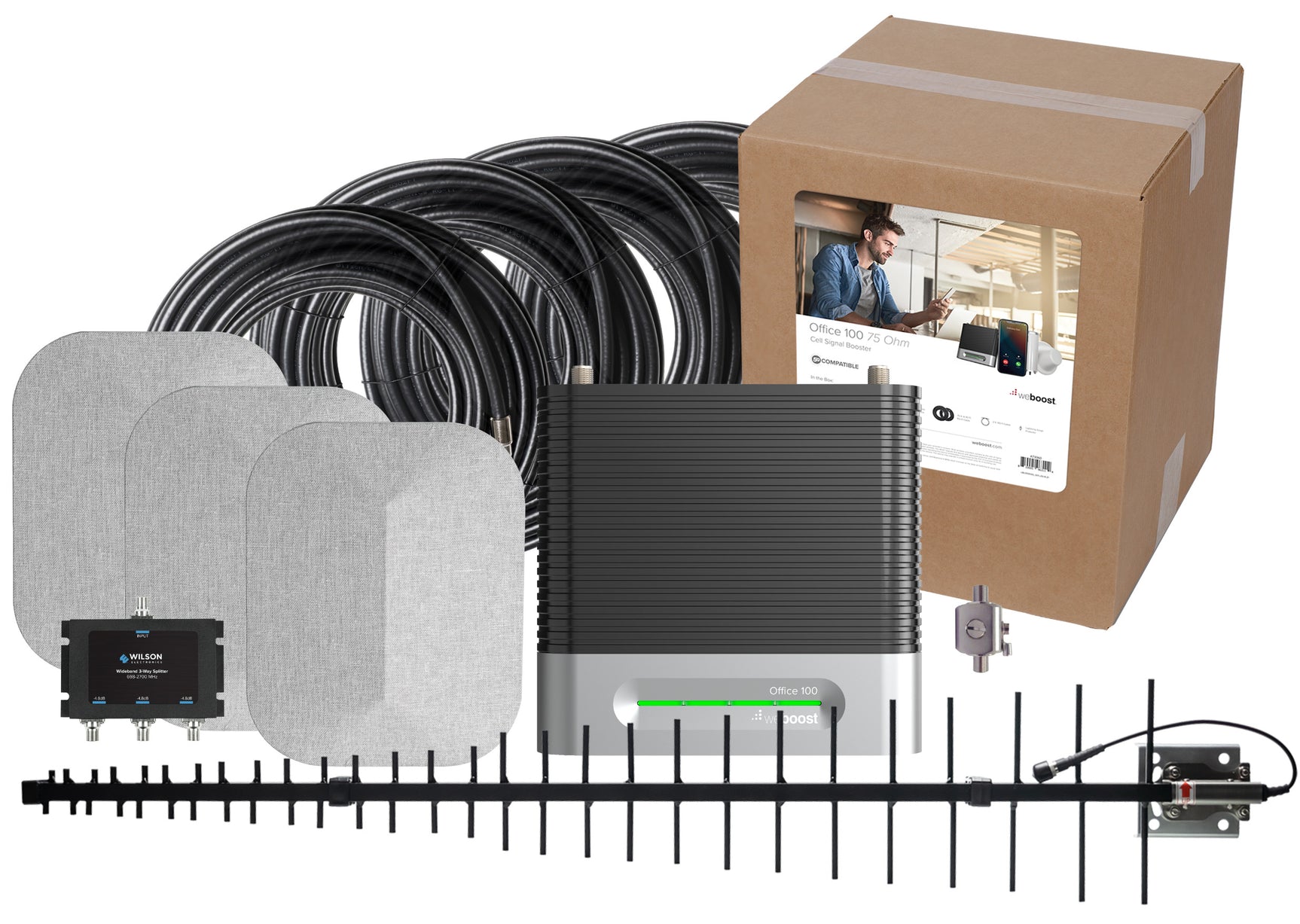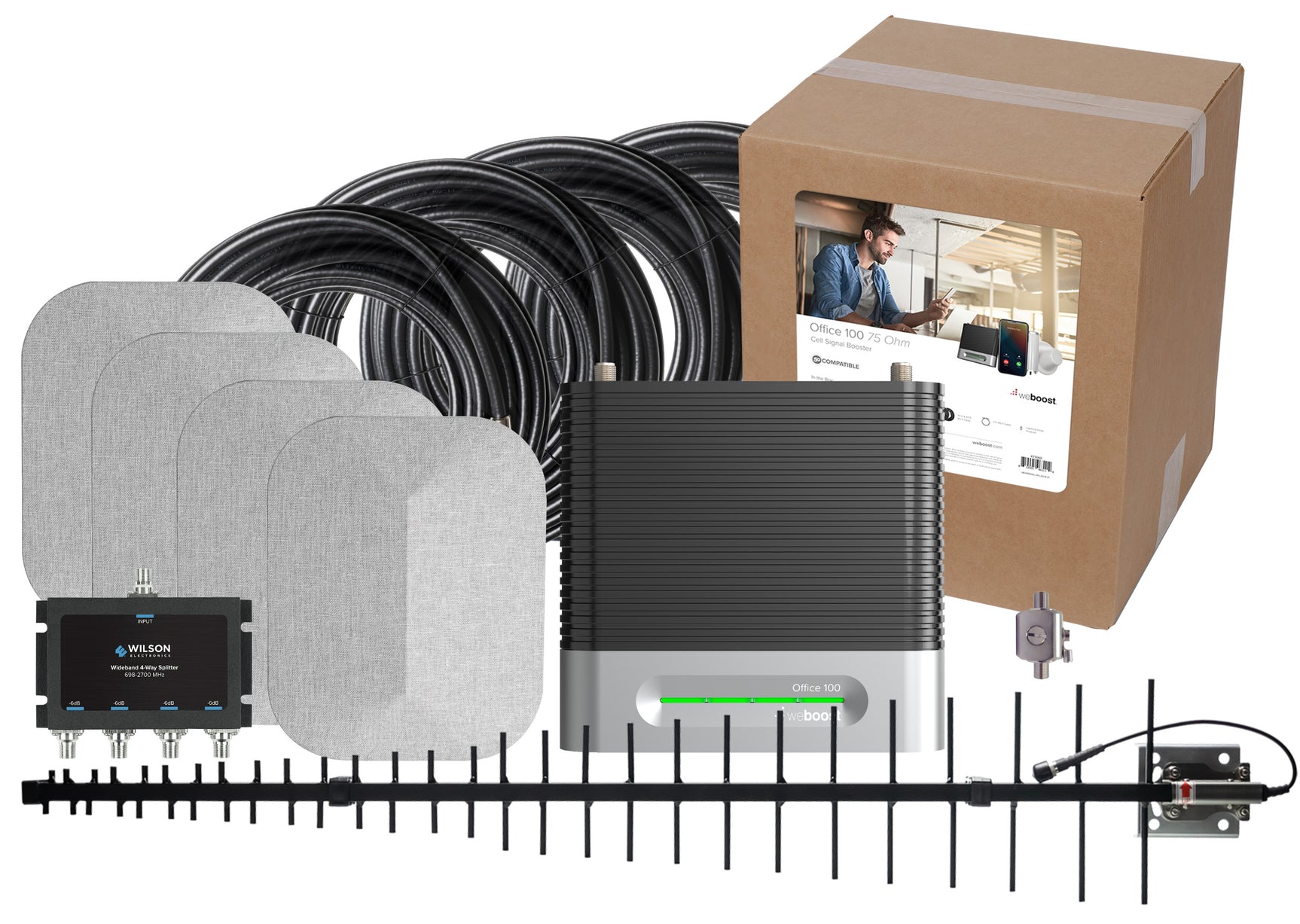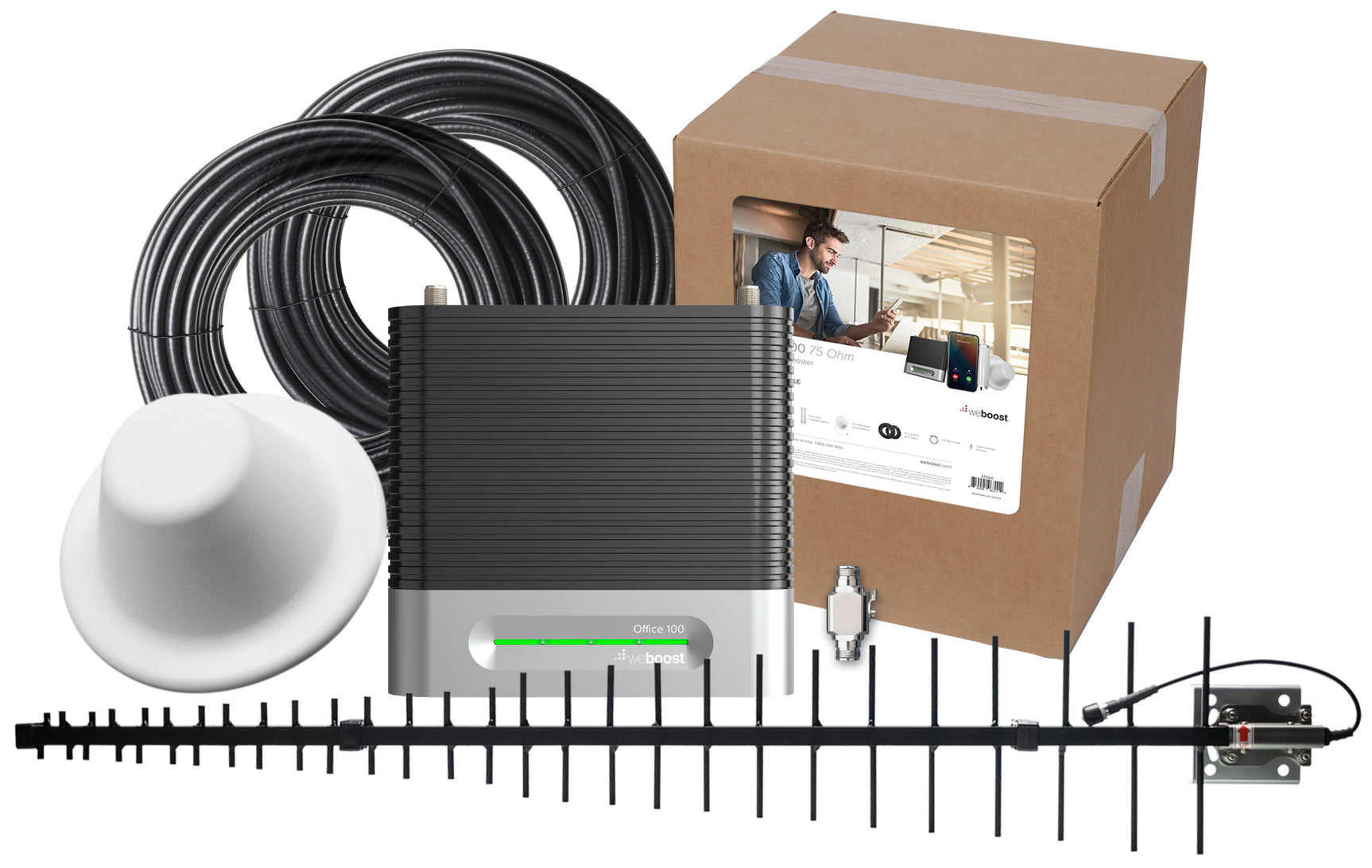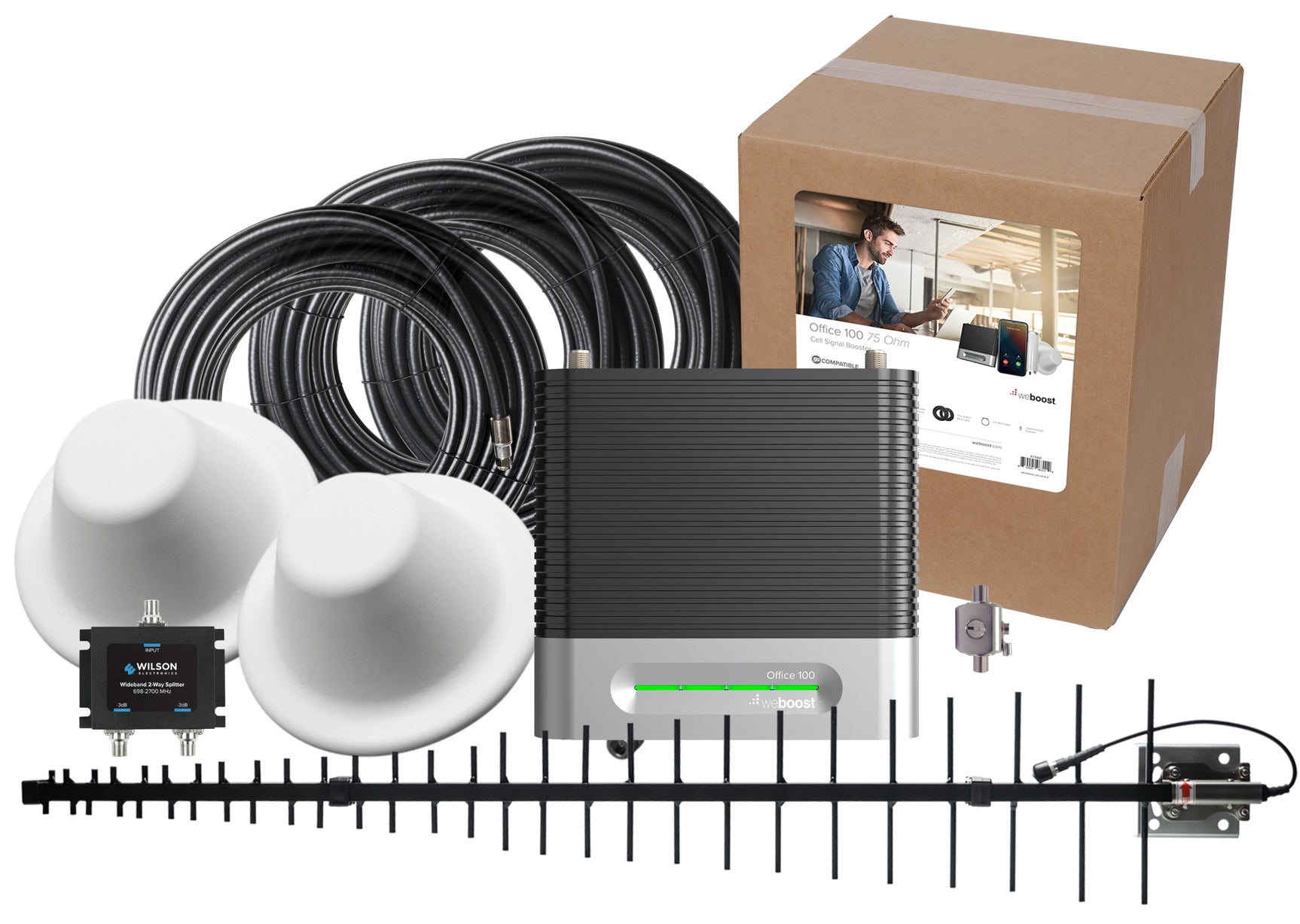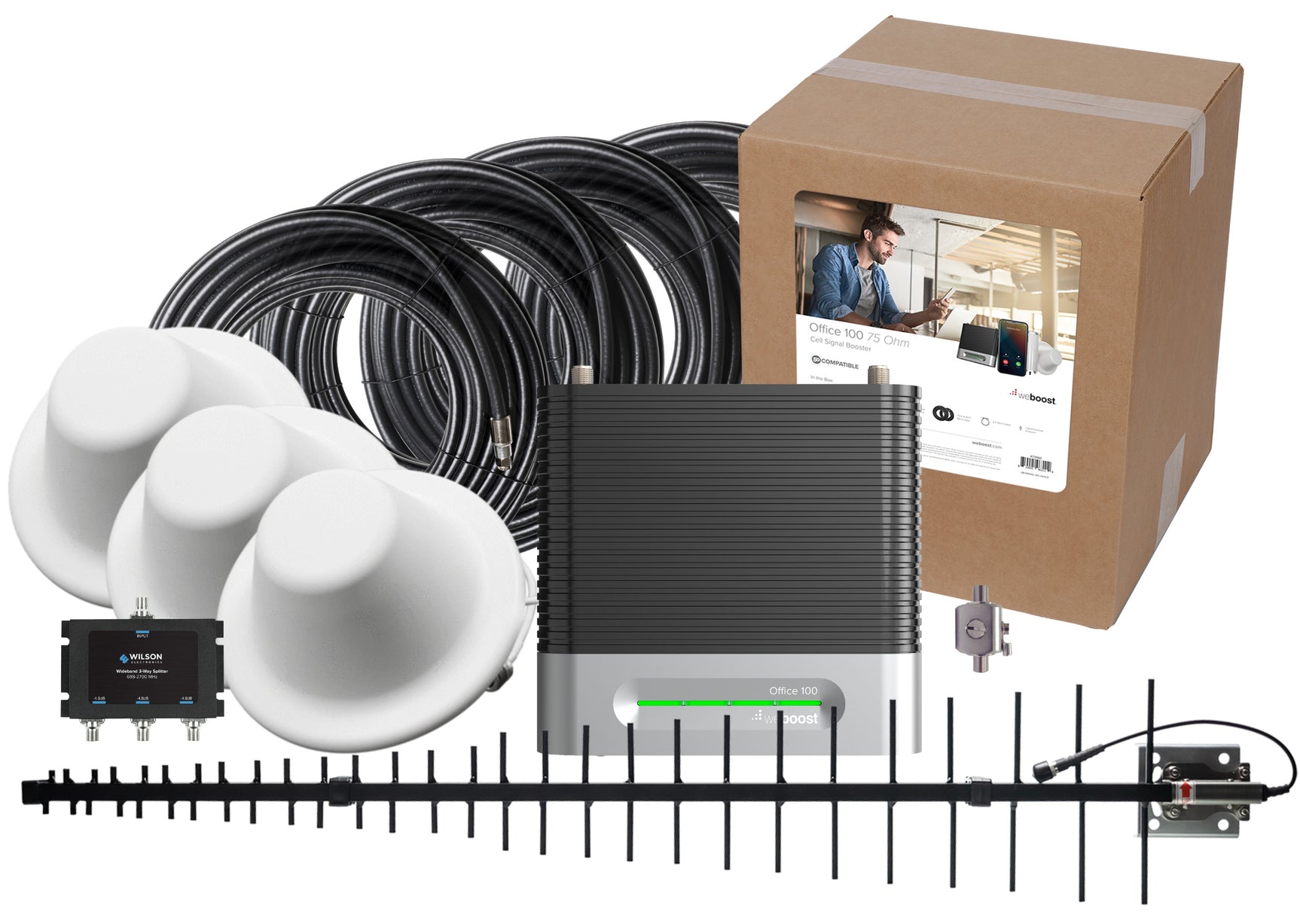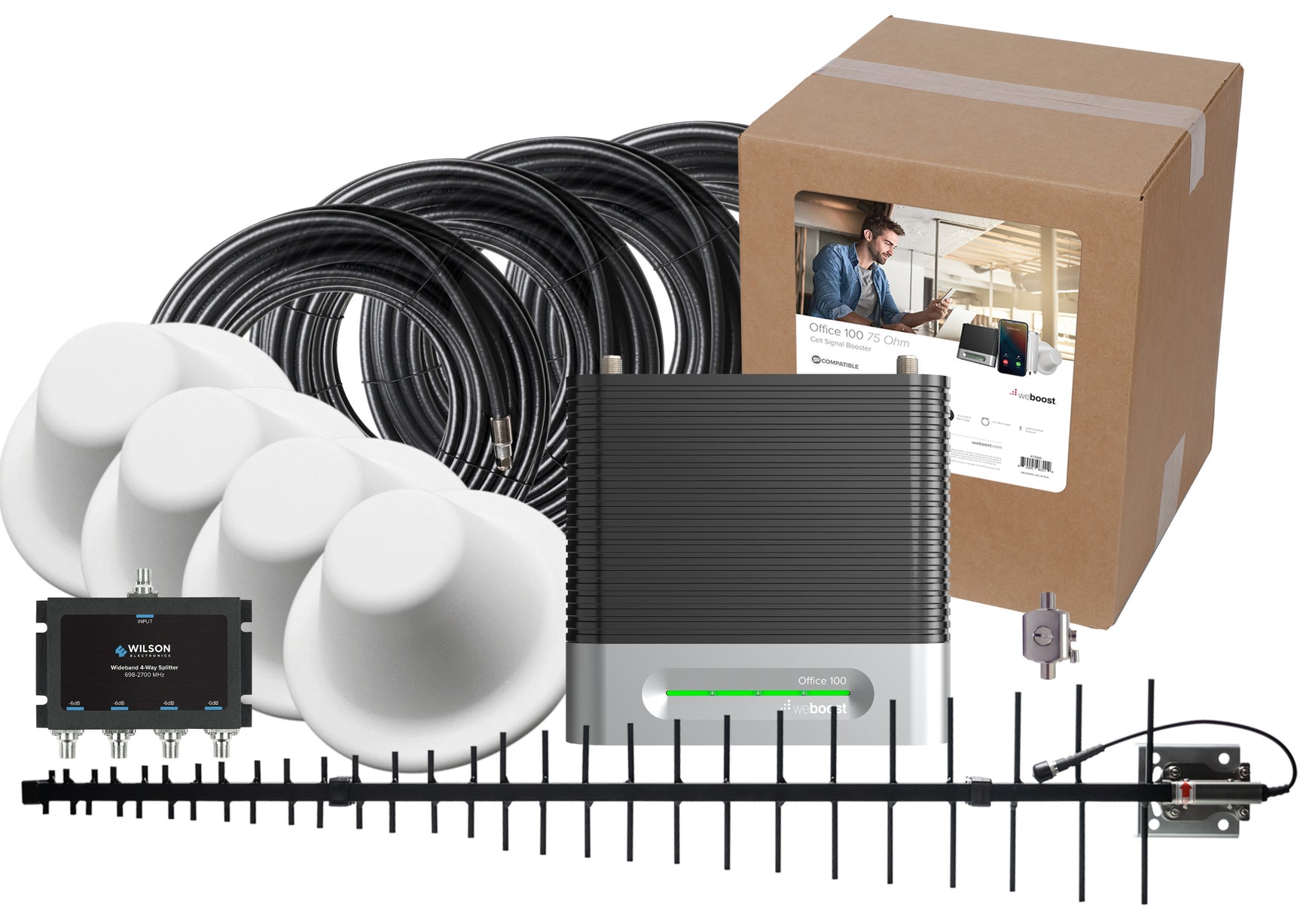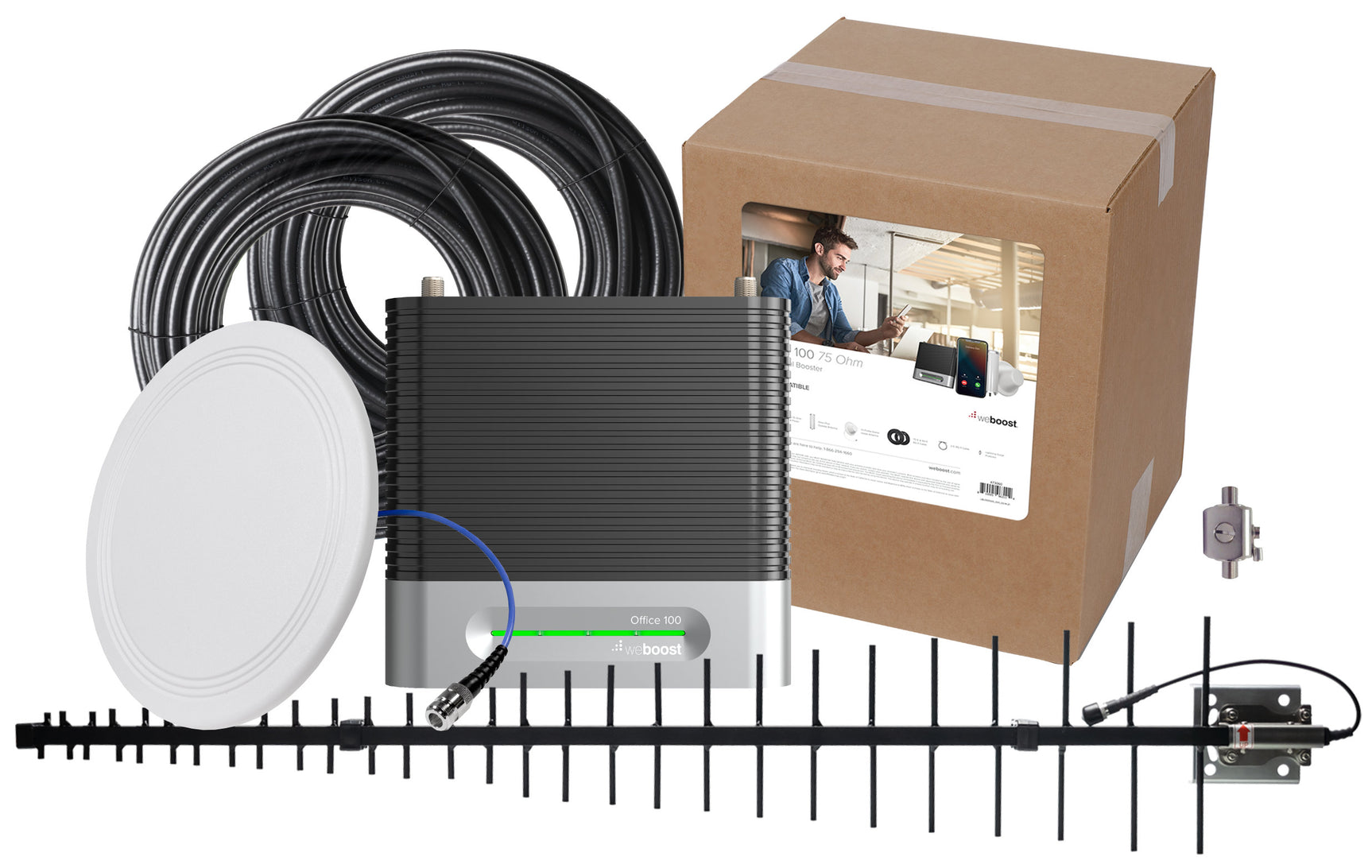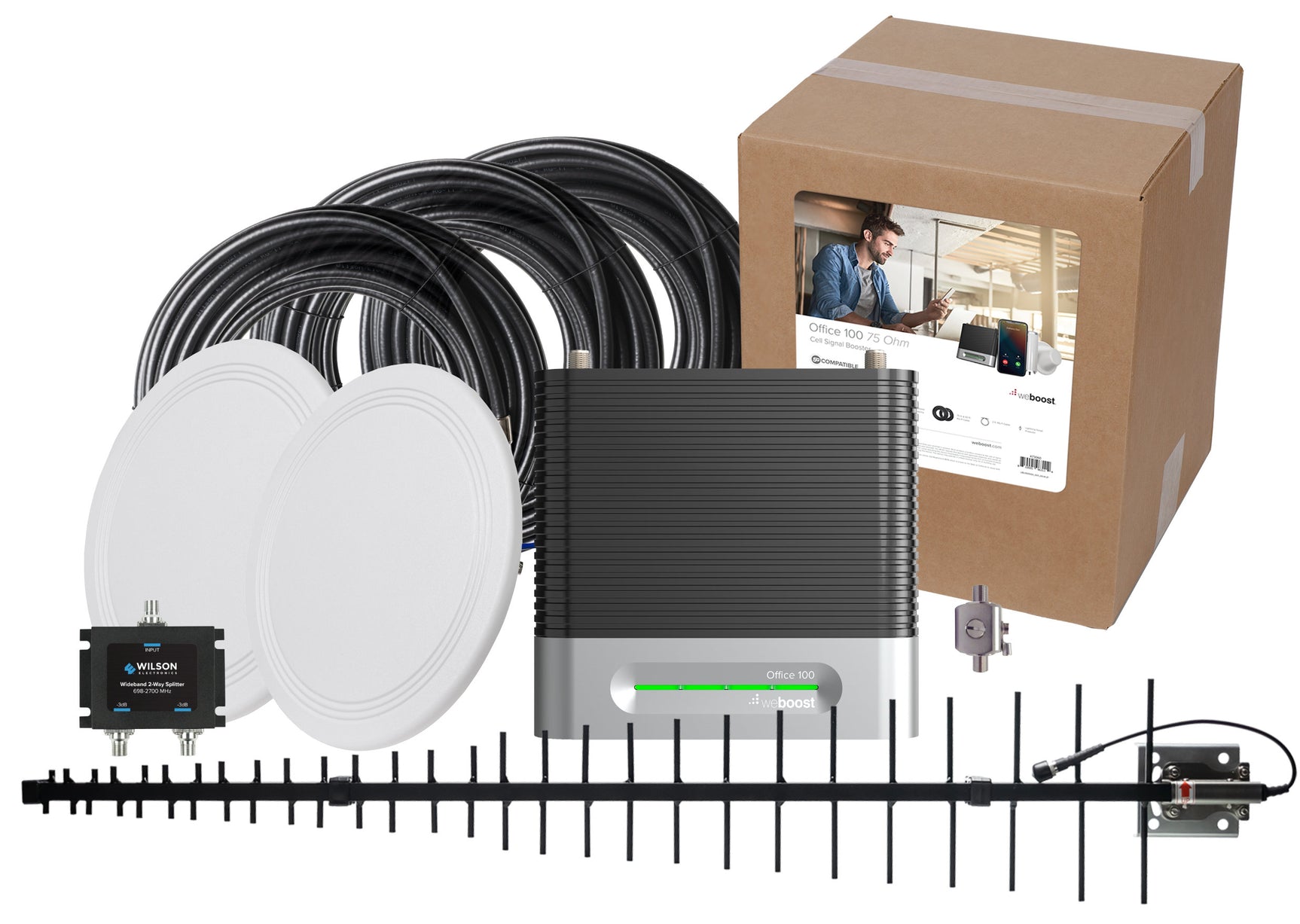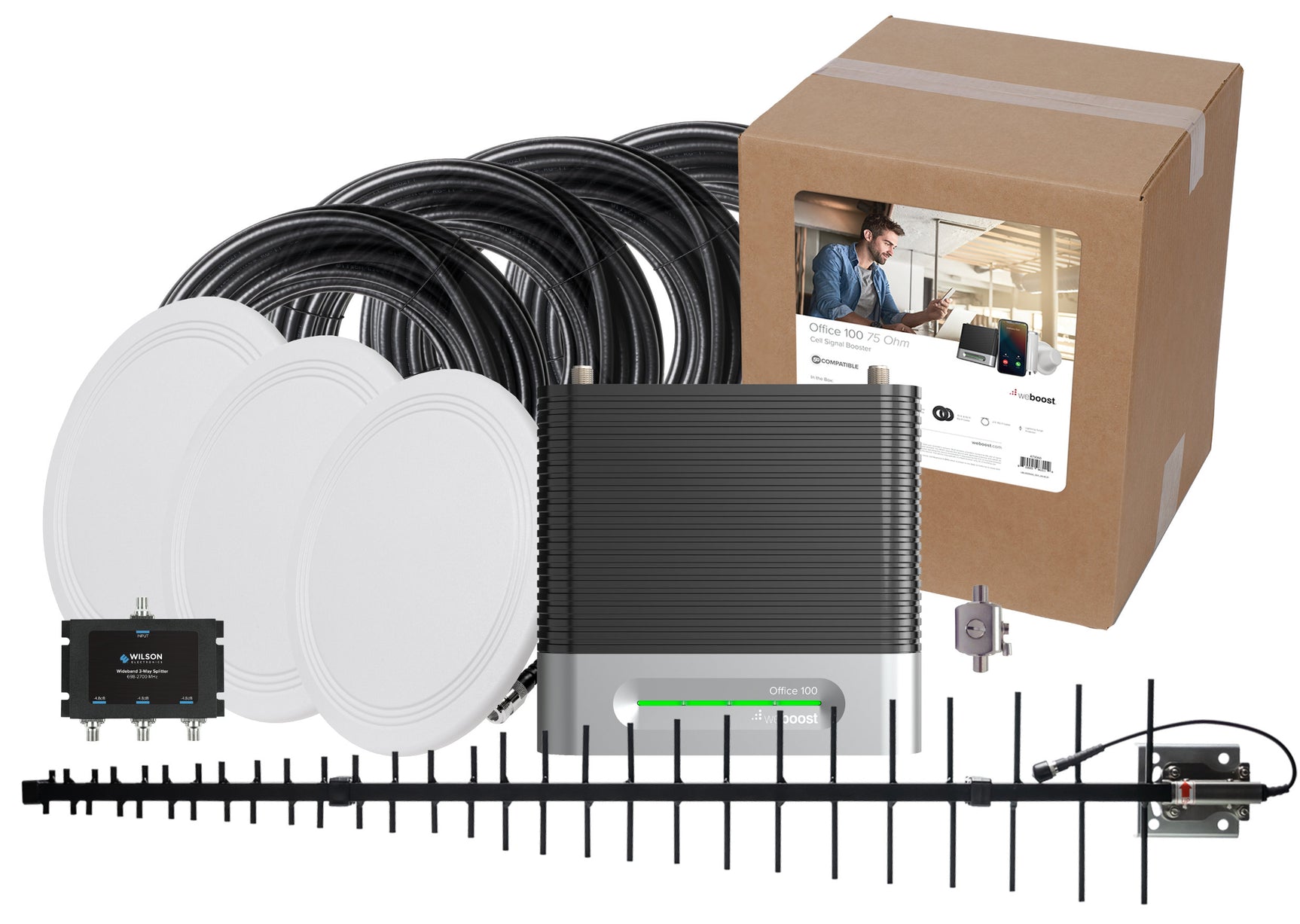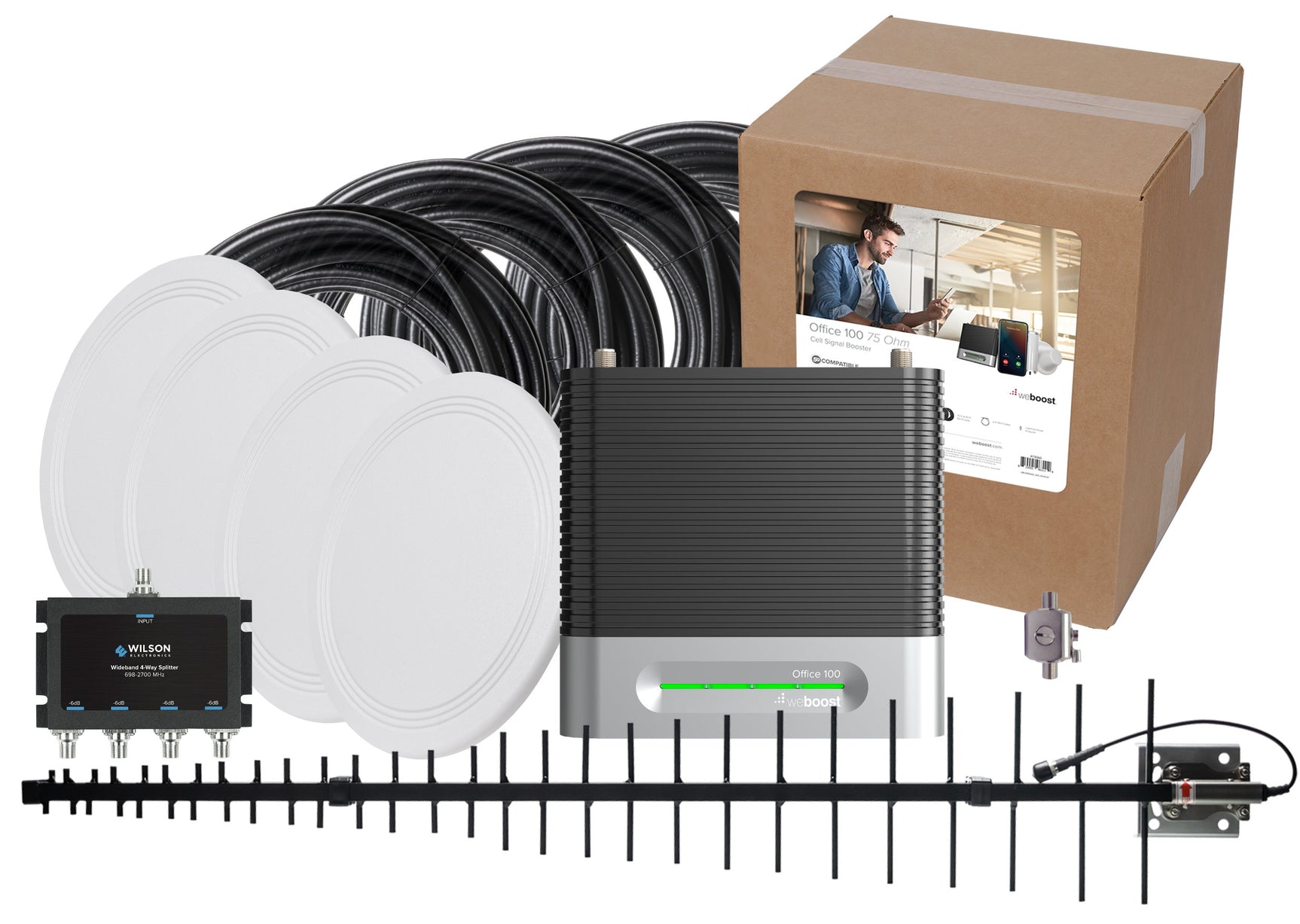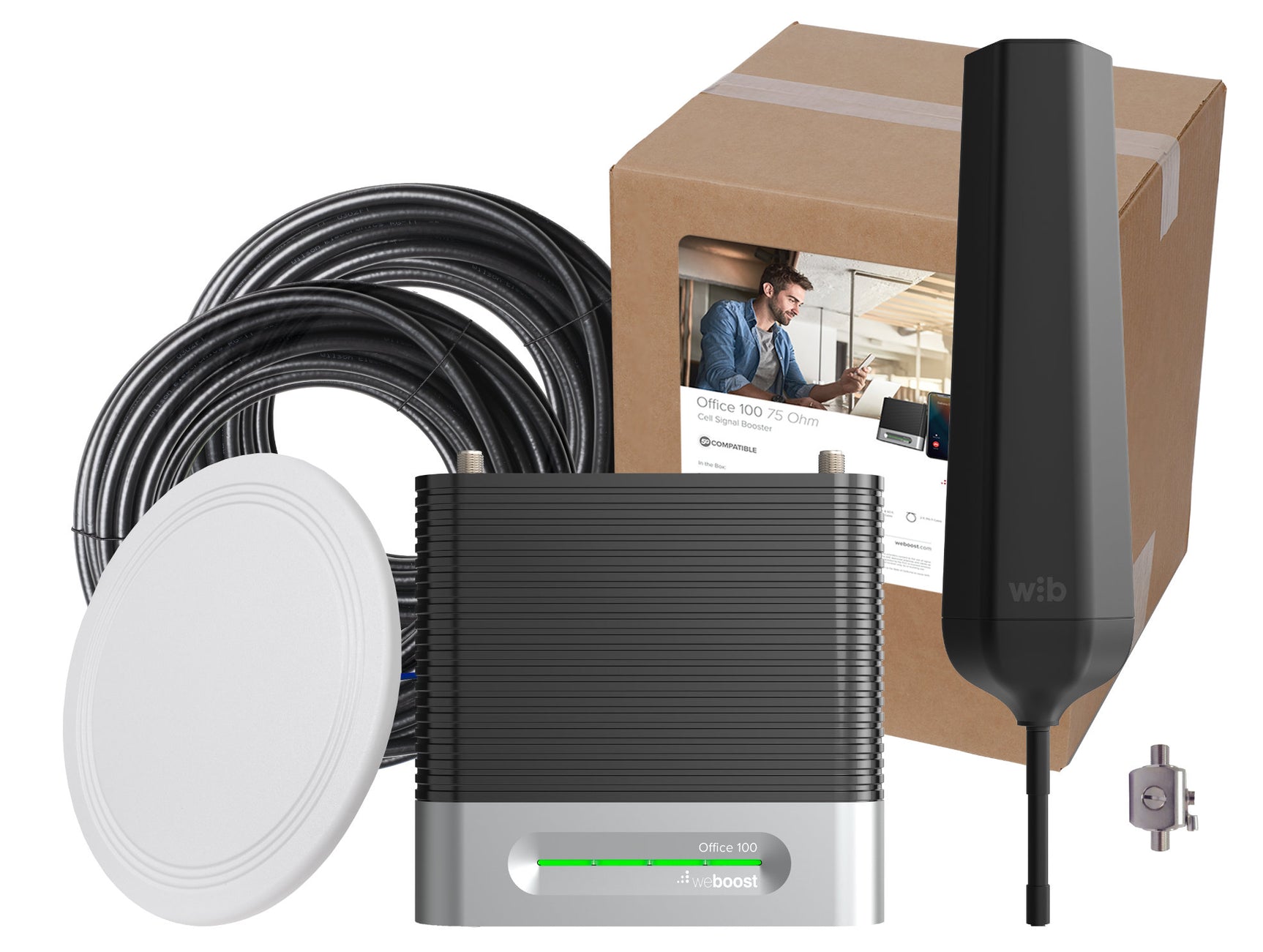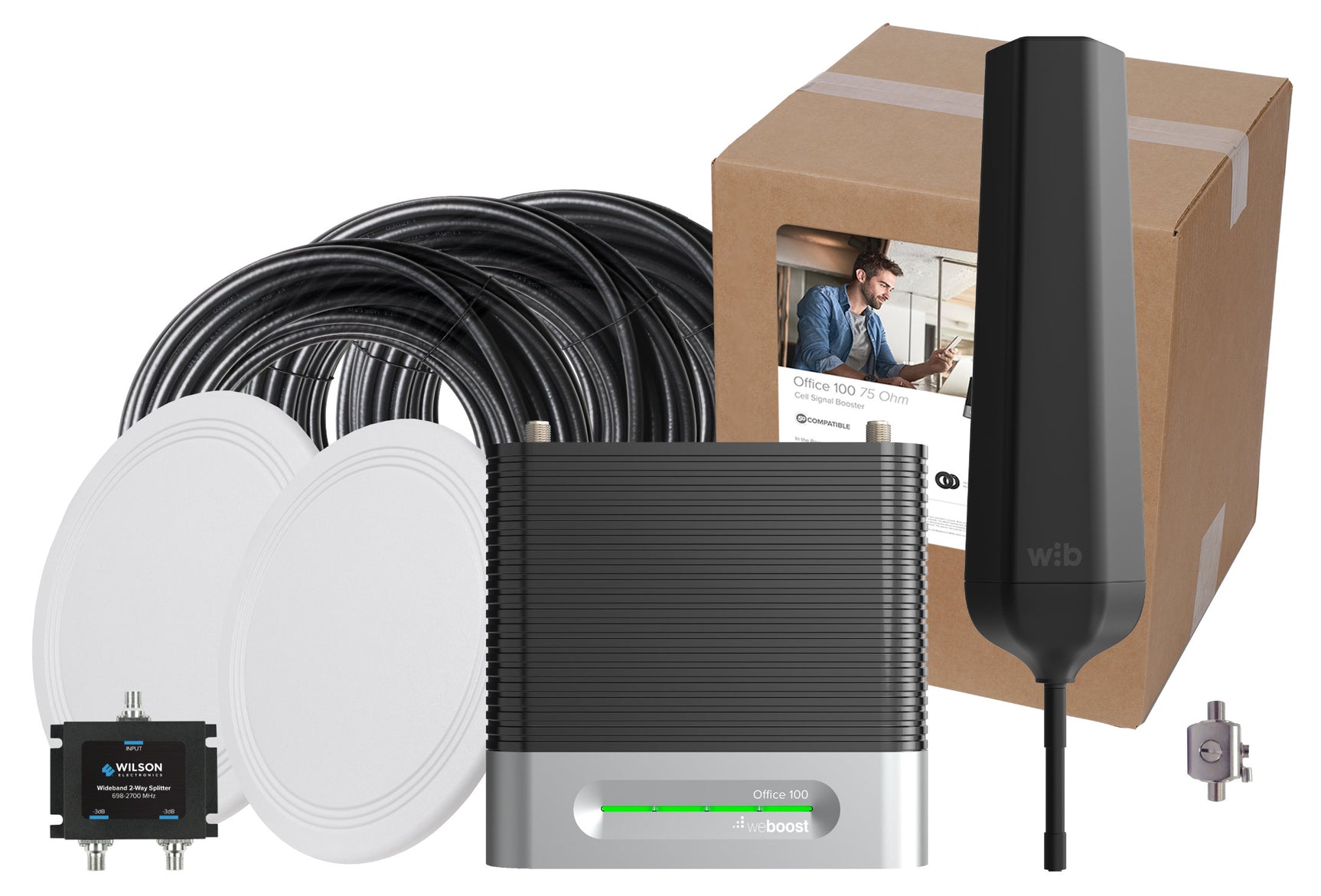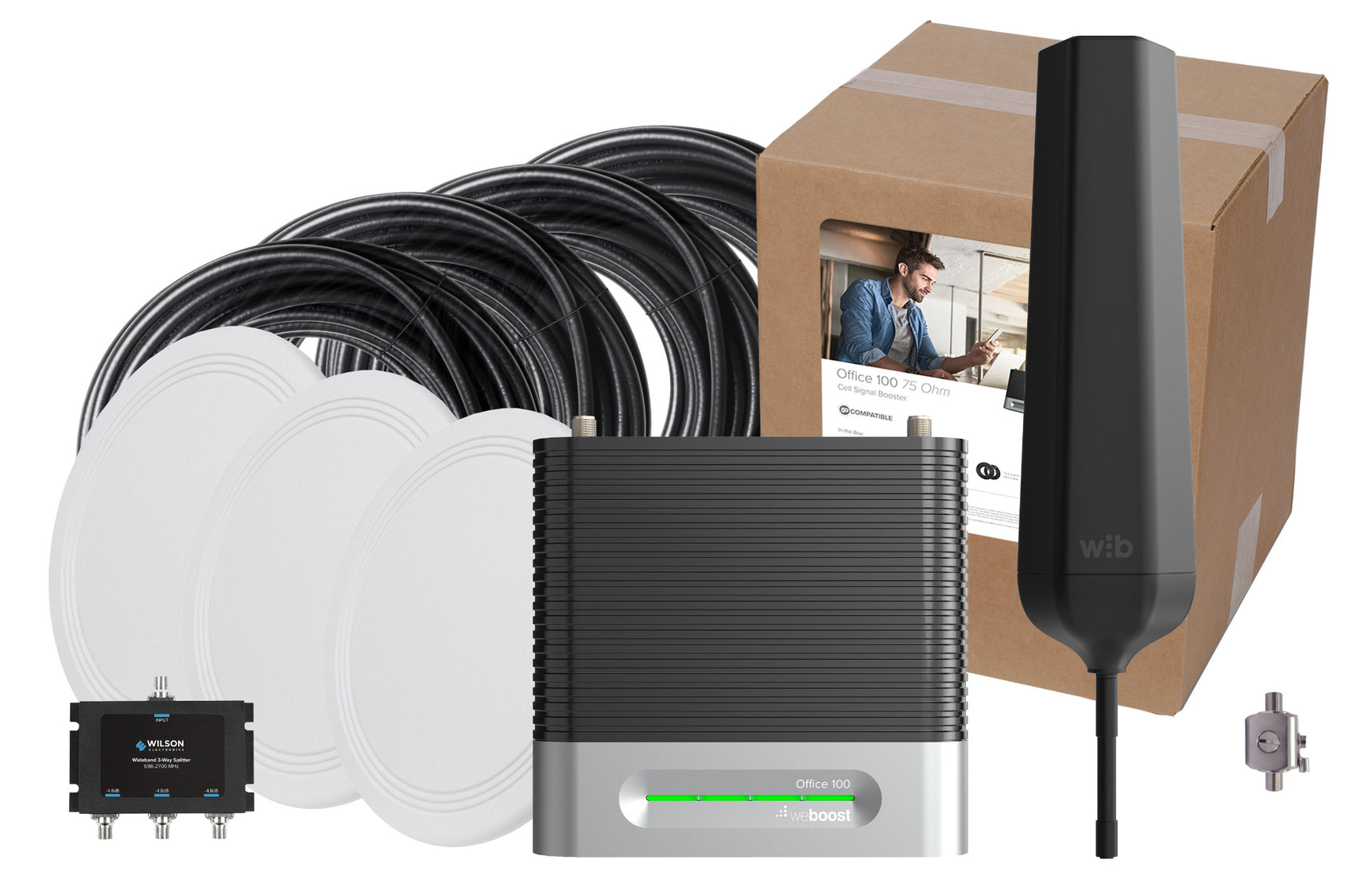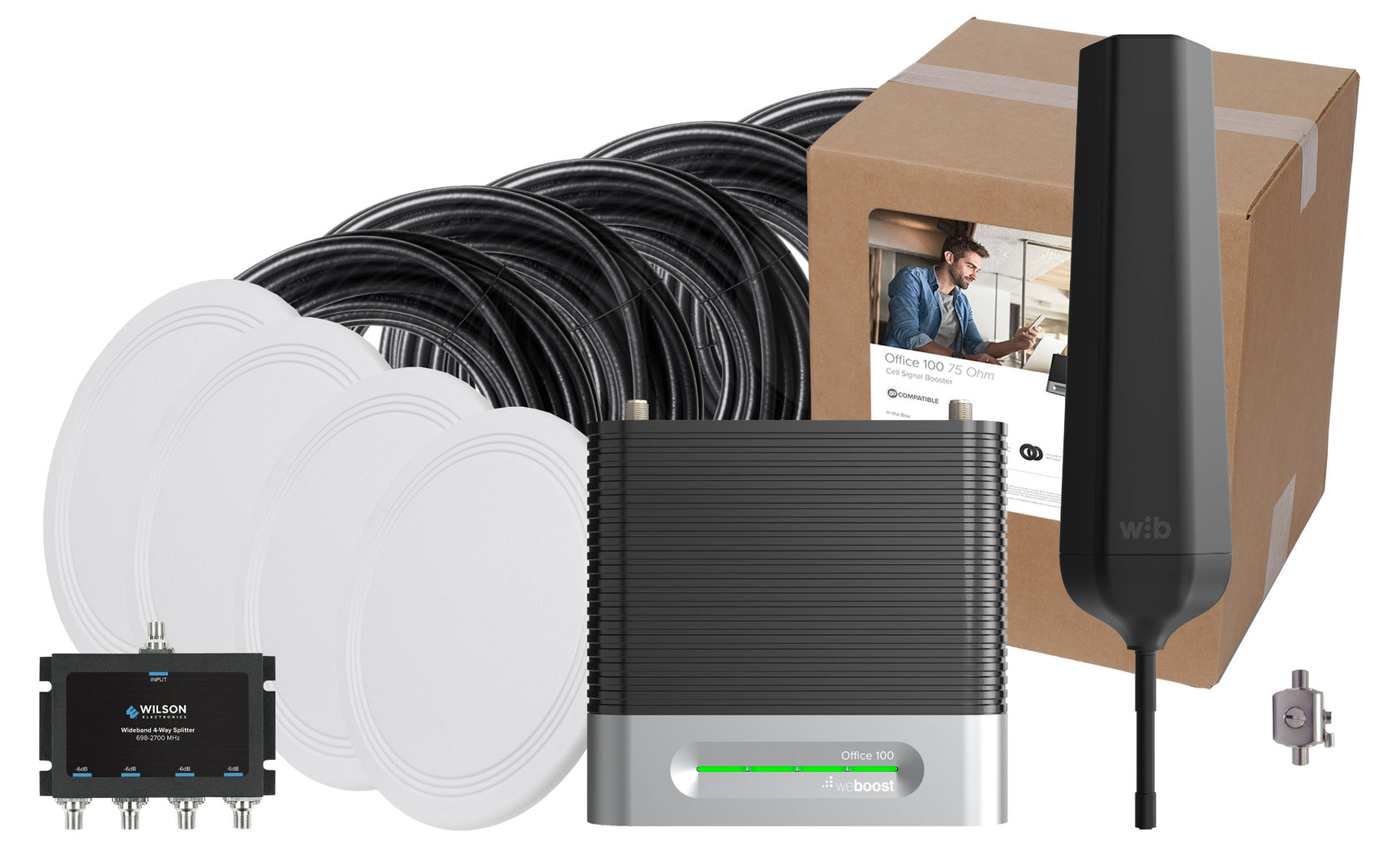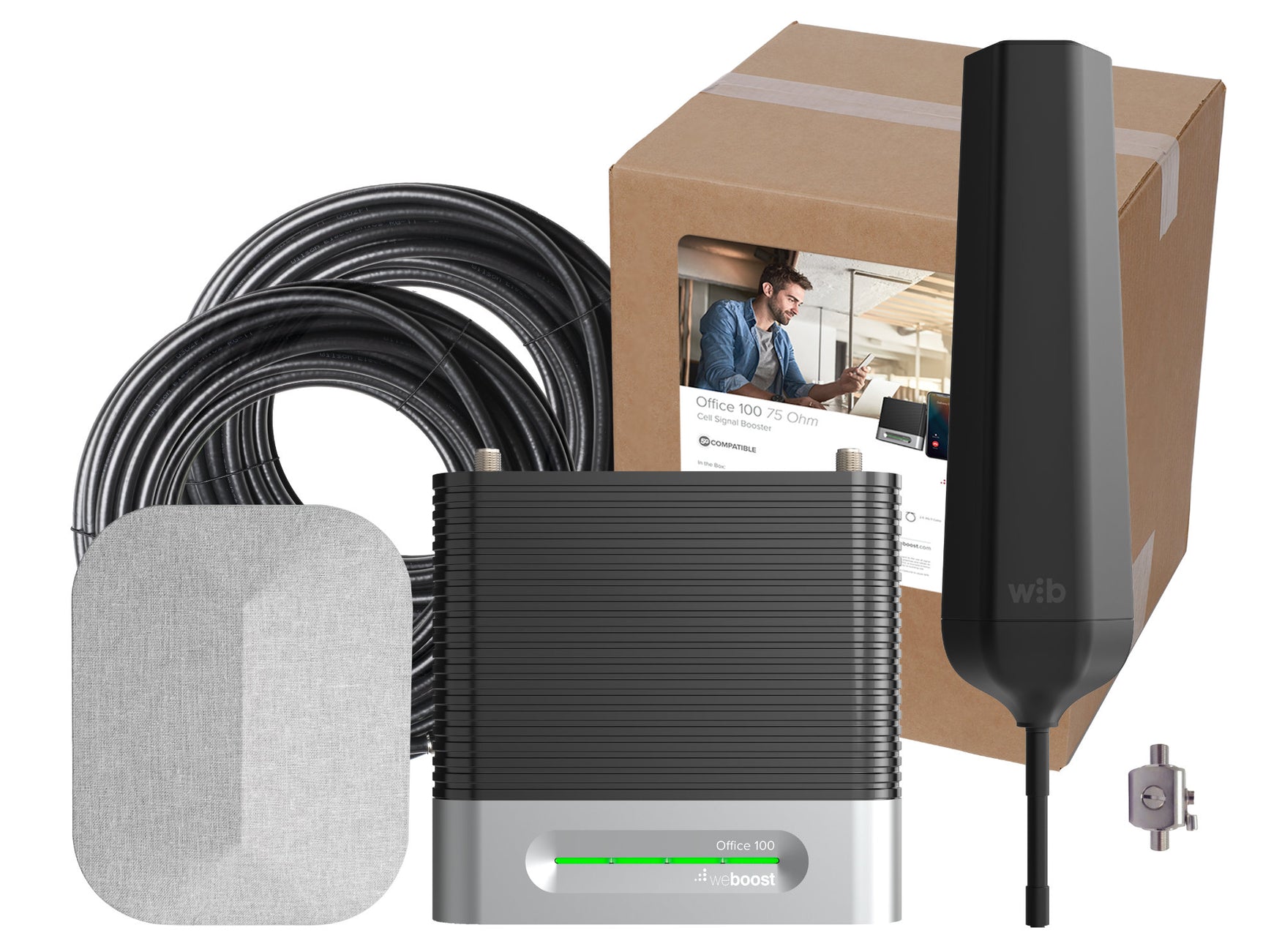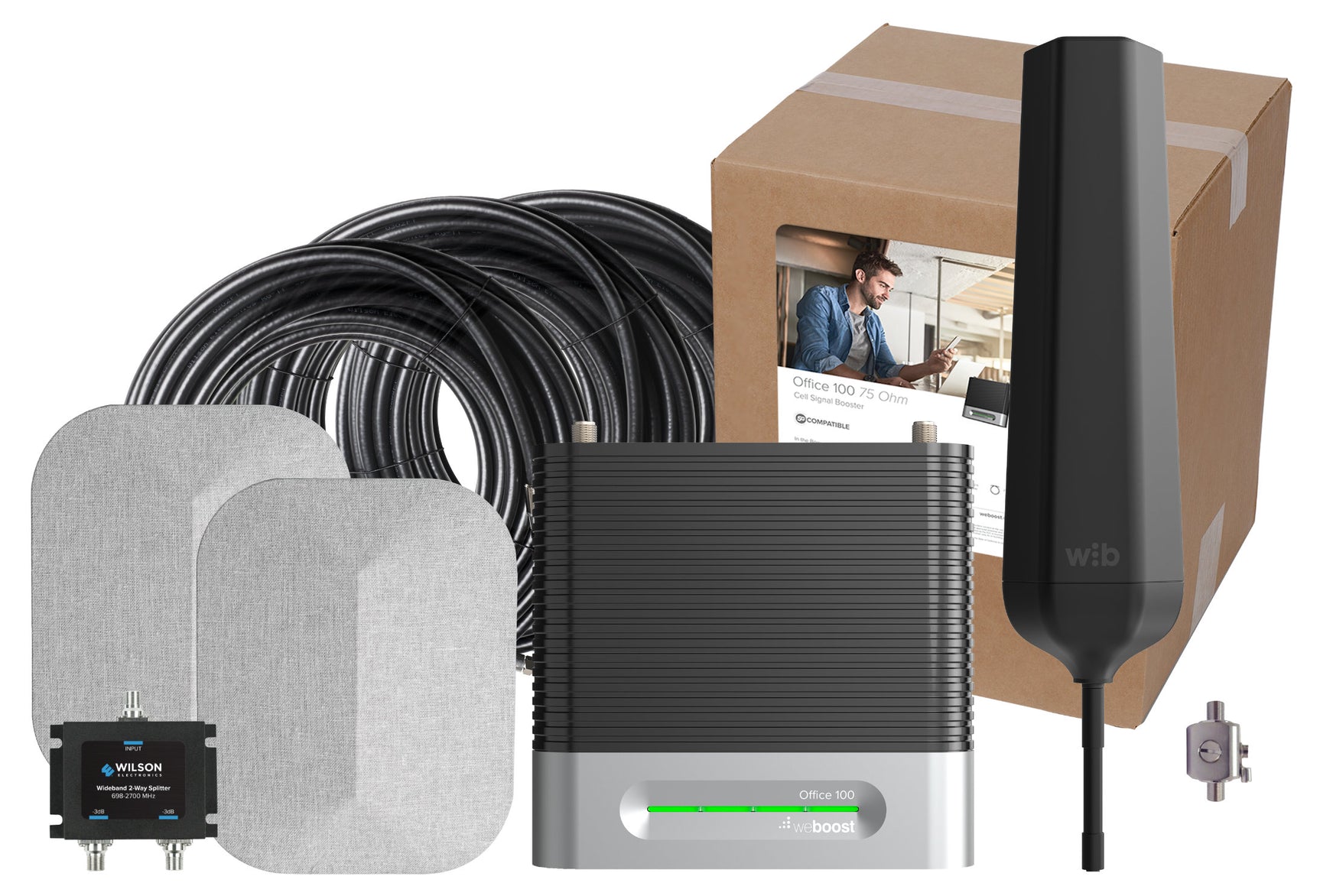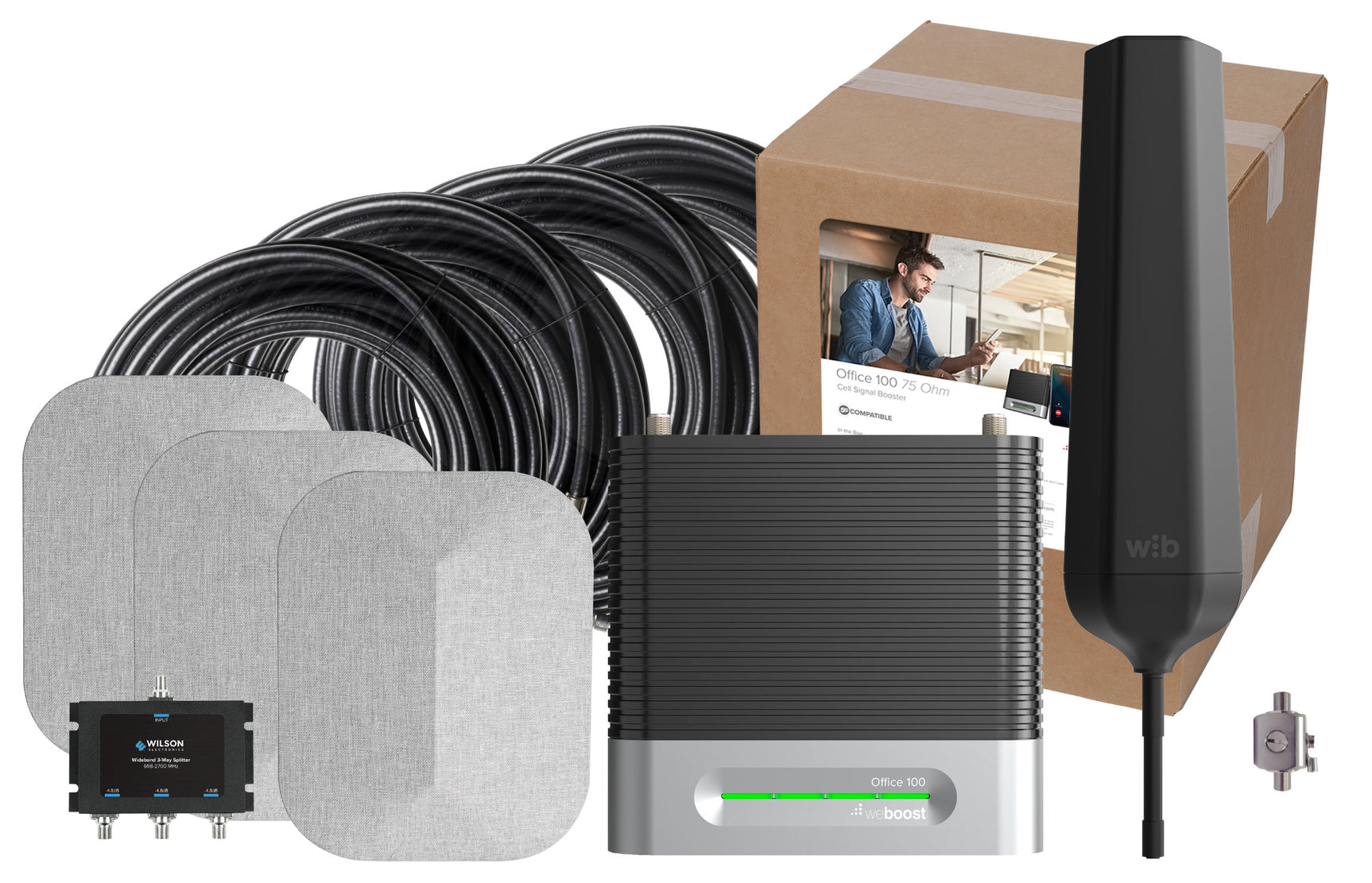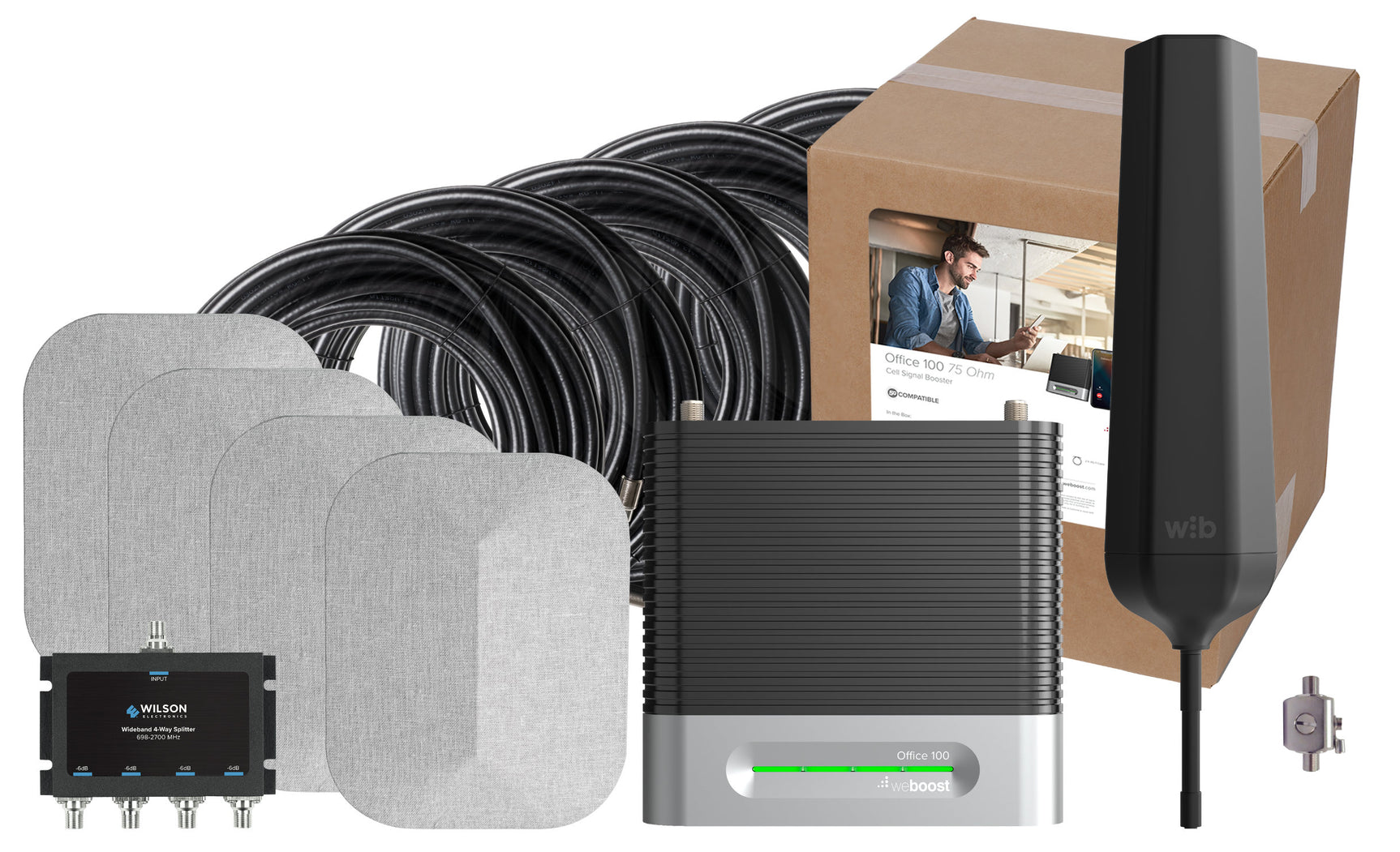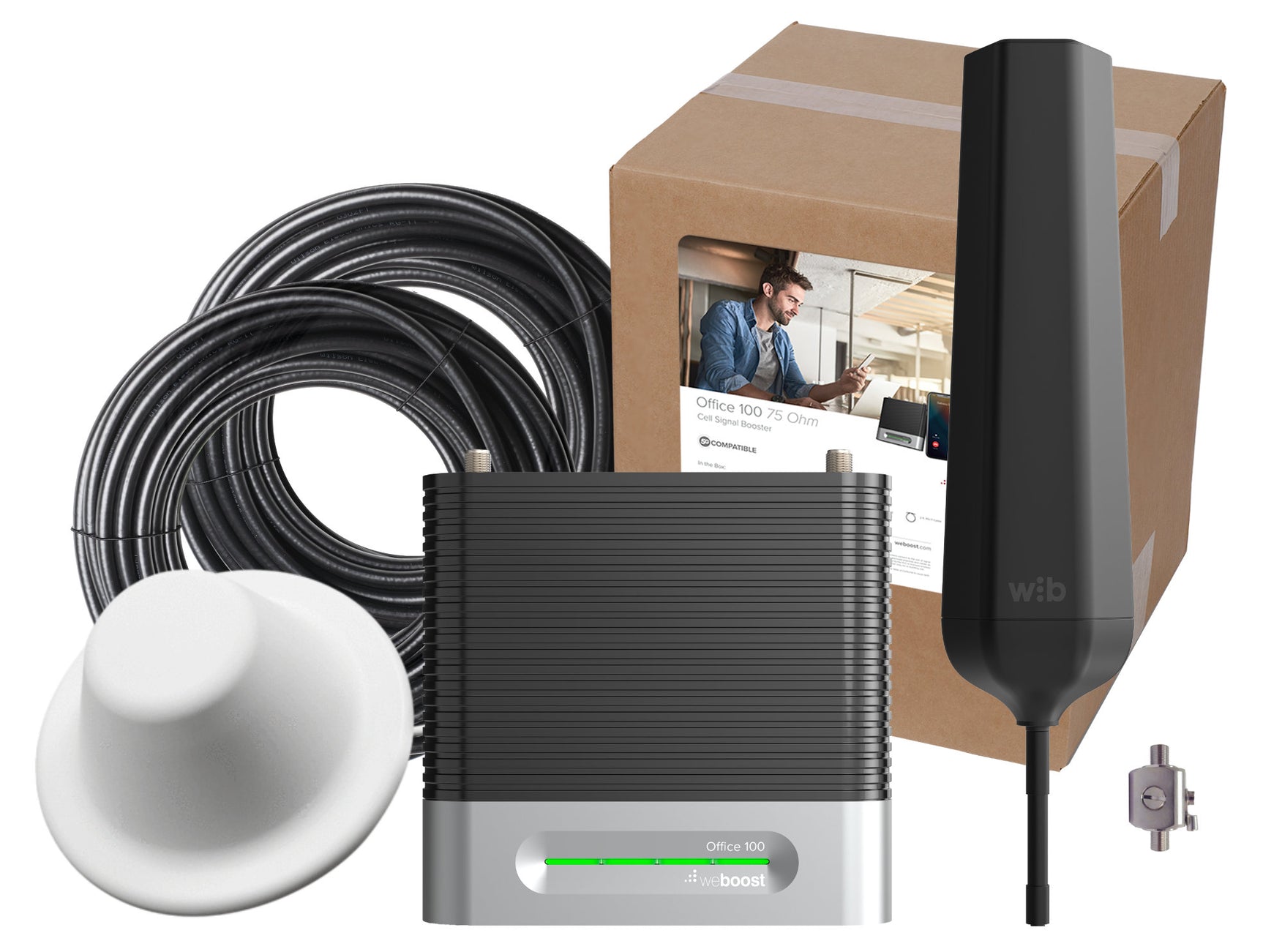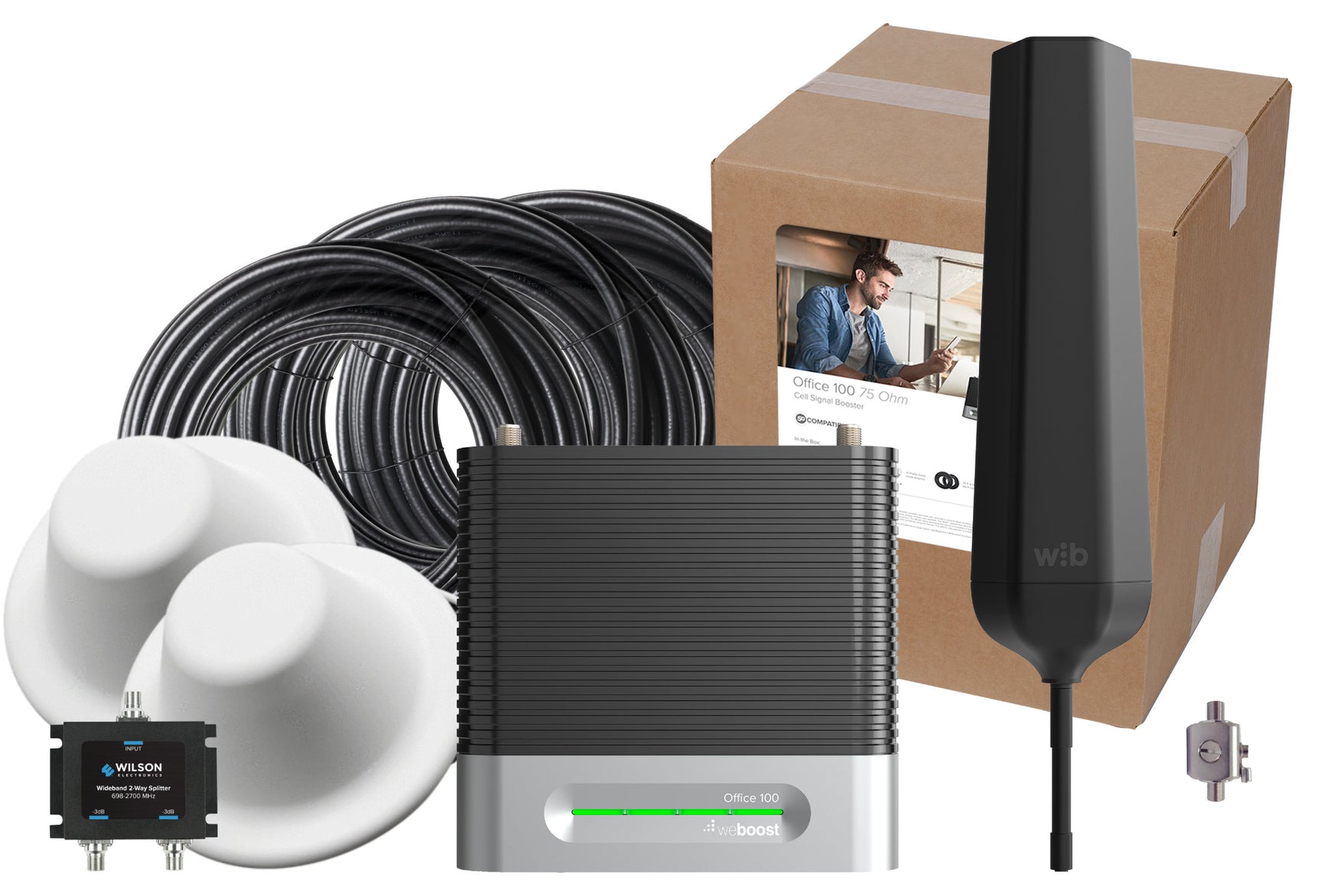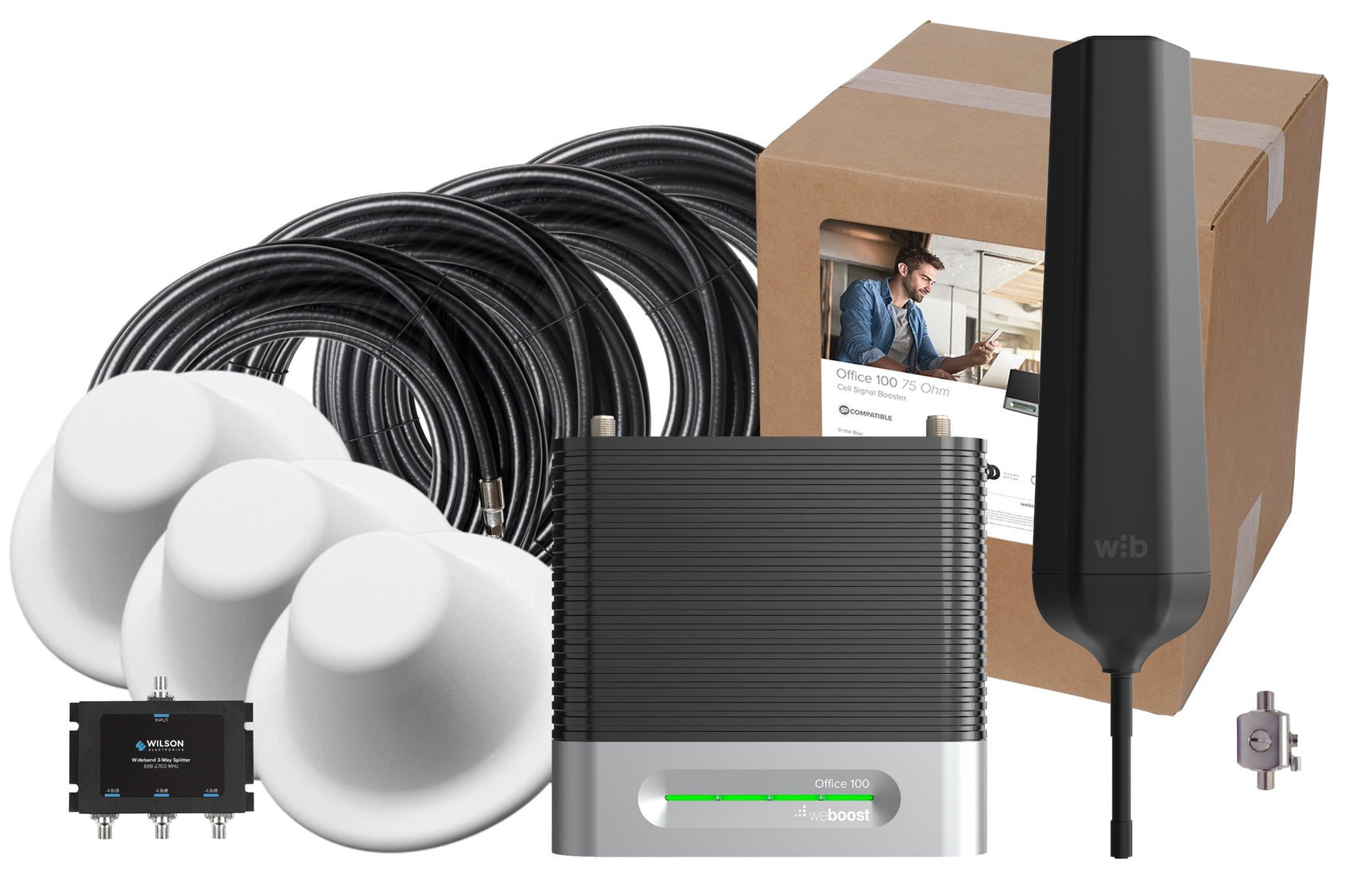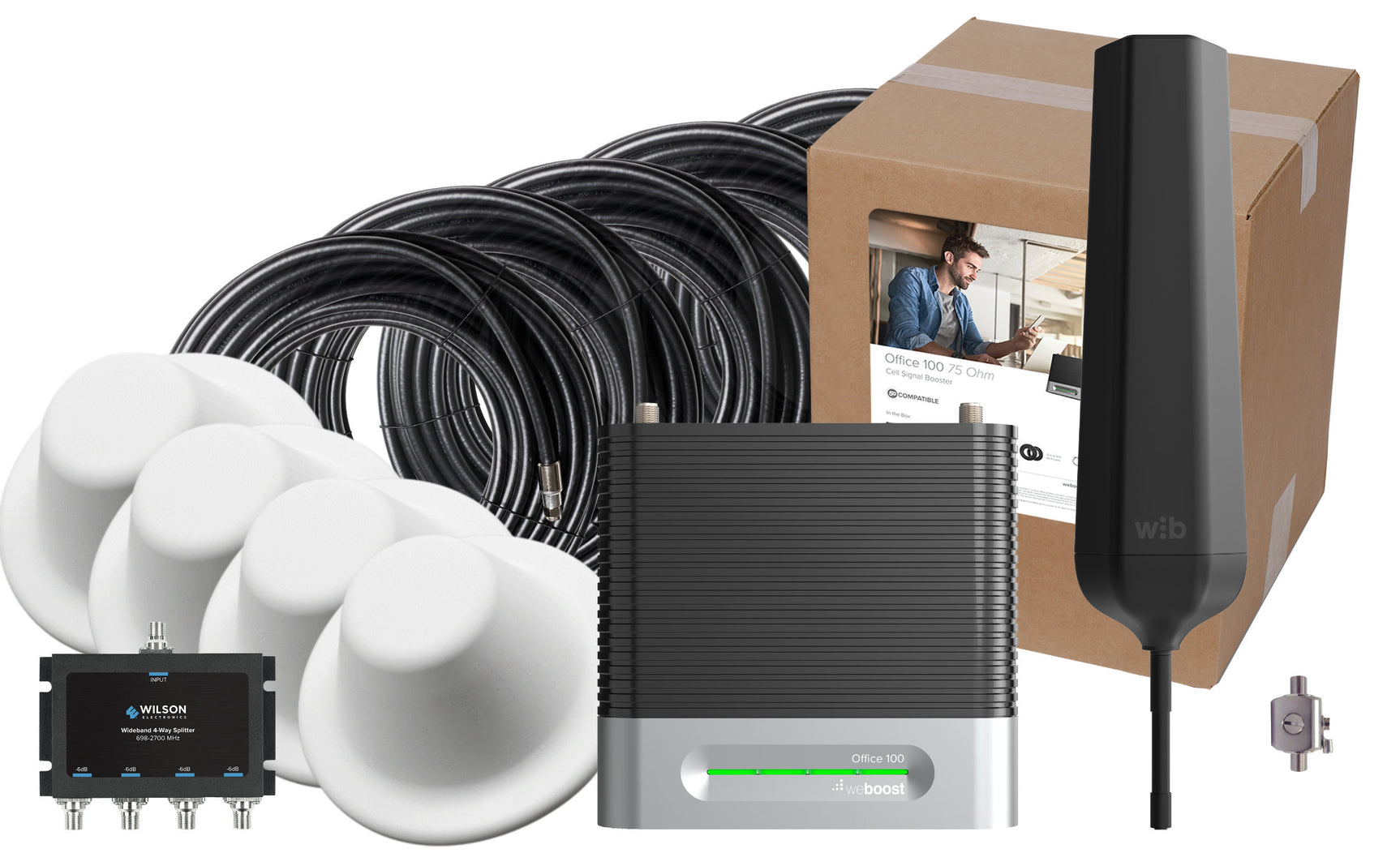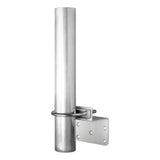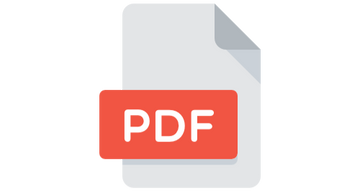weBoost Office 100 Signal Booster (75 Ohm) | 473060
- Yagi Directional Antenna
- Omni Antenna
- High Gain LPDA
- High Gain Omni
- Panel Antenna
- Dome Antenna
- Ultra-Thin Dome Antenna
- 1
- 2
- 3
- 4
Recommended Add-Ons
Your Order Includes:
- 90-Day Returns
- Lifetime Tech Support
- 3-Year Warranty
- Lowest Price Guarantee
How to Choose the Right Antennas for Your Booster
Outside Antennas:
- Yagi Directional Antenna: This antenna is more powerful because it focuses on sending and receiving signals in one direction. It works best when there are no major obstacles blocking its path to the cell tower. It's not ideal for areas with large obstructions like hills or buildings.
- Omni Antenna: This antenna sends and receives in all directions, so it's better for hilly areas or if you need to support multiple carriers with towers in different directions. It doesn’t need to be aimed, but it also isn’t as strong as the Yagi antenna.
- High Gain LPDA Antenna: Perfect for areas with very weak signals, this antenna significantly boosts signal strength. It needs a clear line of sight to the cell tower and requires a sturdy mount because of its size.
- High Gain Omni Antenna: Similar to the standard omni, this antenna receives signal from all directions but delivers significantly higher gain across all supported bands. It’s a much stronger option when you want more inside coverage than a standard omni will provide, especially in areas with weaker outside signal.
Inside Antennas:
- Panel Antenna: Can be placed on walls or ceilings and directs the signal towards a specific area. This antenna is great for homes and tall ceilings in buildings.
- Standard Dome Antenna: Designed to be mounted on the ceiling, this antenna spreads the signal evenly throughout the area. It's best suited for drop ceilings or spaces where cables can be run above the ceiling.
- Ultra-Thin Dome Antenna: This slim antenna also mounts to the ceiling, but is much is less noticeable. It's much stronger than a standard dome antenna, making it a great choice for places where both looks and signal strength are important.
Tips for Choosing:
- Choose Omni Antennas for general coverage with no aiming required.
- Choose Directional Antennas (Yagi or LPDA) when you can point directly at a cell tower and need stronger signal and more inside coverage.
- Interior Size Considerations: One antenna per 750-1,500 sq ft in homes, or 1,500-2,500 sq ft in open spaces like offices and warehouses.

weBoost Office 100 Signal Booster (75 Ohm) | 473060
The weBoost 472060 Office 100 (75 Ohm) transforms weak cellular signals into strong, reliable connections in homes and small businesses up to 2,000 square feet. If you're constantly searching for that "sweet spot" to make calls or watching videos buffer endlessly, this powerful solution will revolutionize your connectivity experience.
Why do our customers love the 75 Ohm version? It seamlessly integrates with standard coaxial cabling (the same kind used for cable TV), making installation simpler and more cost-effective for residential settings. The F-connectors are familiar to most homeowners and compatible with existing cable infrastructure you may already have in your walls.
Cell signal shouldn't stop at your front door. The Office 100 system amplifies signals from all major wireless carriers simultaneously, ensuring everyone in your space stays connected regardless of their service provider. From basement home offices to mountain cabins, this system bridges the gap between outdoor cell towers and your indoor devices.
Customization is key to optimal performance. That's why the Office 100 kit includes multiple antenna configurations to address your specific environment challenges. The weather-resistant outdoor antenna captures even faint signals, while your choice of indoor antennas distributes enhanced coverage where you need it most.
We stand behind our technology with a comprehensive 3-year warranty. While setup requires basic DIY skills and some tools, our detailed instructions guide you through each step of creating your personal connectivity bubble.
Stop letting poor cell reception limit your productivity and enjoyment. The weBoost Office 100 (75 Ohm) delivers professional-grade signal enhancement through consumer-friendly
Please Note: This is a 75 Ohm system with F-connectors. If you need a version with N-connectors, please see the weBoost Office 100 (50 Ohm).
-

Expert Technical Support Included
Get access to our team of experts to plan your install & troubleshoot any problems.
-

Get a Custom System Design
We'll design the perfect solution for your space using the Office 100.
-

90-Day Returns
Return this booster within 90 days for a full refund if you're not fully happy with the results.
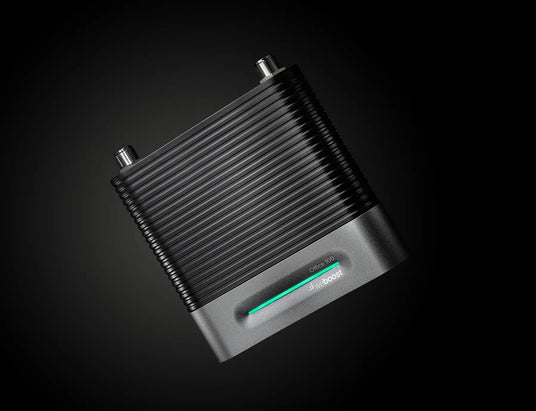
Benefits of the Office 100
- Easy Home Installation: Uses F-connectors compatible with standard RG6 coaxial cable already installed in many homes. This familiar connection type makes setup more approachable for homeowners and can reduce installation time.
- Reliable Signal Coverage: Transforms weak cellular signals into strong, consistent connections throughout your space. No more searching for the one spot in your house where calls don't drop.
- Works With All Carriers: Boosts signals for all major US cellular providers simultaneously. Everyone in your home gets better reception regardless of whether they use Verizon, AT&T, T-Mobile, or other carriers.
- Whole-Home Connectivity: Provides coverage for spaces up to 2,000 square feet, ensuring reliable service in home offices, living areas, bedrooms, and basements that previously had weak or no signal.
- Future-Proof Investment: Supports current 3G, 4G LTE, and 5G networks, ensuring your system continues to work effectively as wireless technology evolves over the coming years.
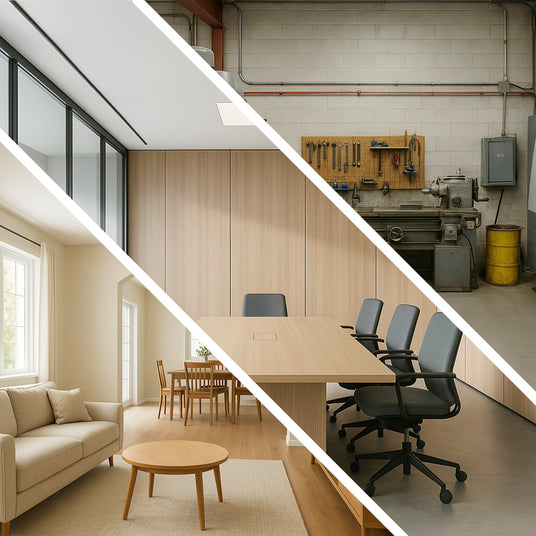
Where the weBoost Office 200 Works Best
- Single-Family Homes: Perfect for houses up to 2,000 square feet where you have the freedom to mount an external antenna and run cabling. Particularly effective in modern construction where signal-blocking materials like energy-efficient windows and metal elements are common barriers to reliable cell service.
- Home-Based Workspaces: Ensures dependable connectivity for remote work environments in owned properties. Whether you're taking client calls, joining video conferences, or accessing cloud-based tools, the Office 100 provides the consistent signal strength professionals need to work effectively from home.
- Difficult-to-Wire Locations: Ideal for spaces where running new cable would be challenging or disruptive. The ability to use existing wiring pathways makes this version excellent for historic homes, finished basements, or spaces where minimizing installation impact is important.
- Small Retail and Service Businesses: Delivers reliable connectivity for boutiques, cafes, salons, and small shops where consistent cell service is essential for payment processing, customer communication, and daily operations in spaces up to 2,000 square feet.
- Vacation Properties: Transforms connectivity in rural cabins, lakeside cottages, and weekend retreats where cell signal is typically weak due to distance from towers or challenging terrain. Enjoy the peace of nature without losing touch with the world.
How it Works
The weBoost Office 100 takes weak outdoor signal, amplifies it, and distributes it throughout your space to deliver strong and reliable coverage where you need it most. Here’s how the process works:
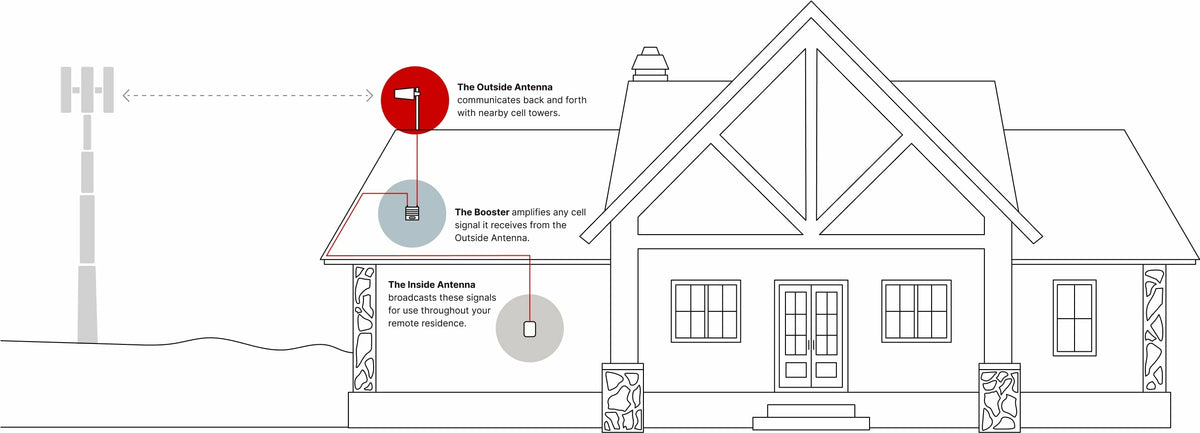
-
![]()
1. Outside Antenna Receives the Signal from the Cell Tower(s)
The outdoor antenna is mounted on your roof and receives the cell signal from the nearby towers. The antenna then passes that signal over a cable to the amplifier.
-
![]()
2. Amplifier Boosts the Weak Signal
The Office 100 amplifier, which is located inside the building, receives the signal and boosts it up to the maximum level allowed by the FCC before passing it on to the network of indoor antennas.
-
![]()
3. Inside Antenna(s) Broadcast the Strong Signal Inside
The inside antenna(s) receive the boosted signal from the amplifier and broadcasts it throughout the space. Multiple inside antennas can be used to provide more inside coverage.
-
![]()
4. Cell Signal is Boosted Back to the Tower
The system also works in reverse. When you make a call or use data, the signal is sent back through the system, gets boosted, and then sent back to the cell tower, ensuring strong signal in both directions.
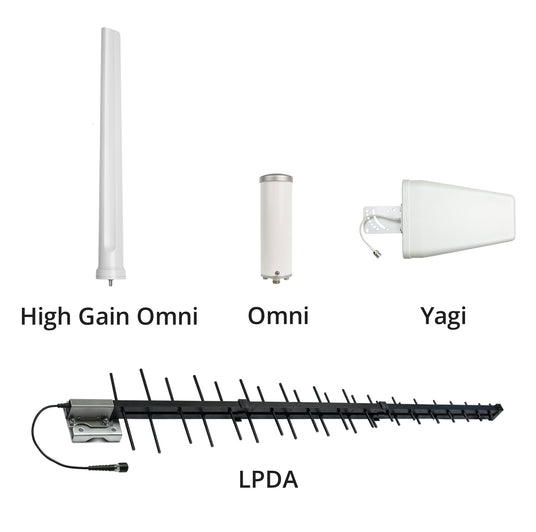
Outside Antenna Options
The outdoor antenna plays a big role in how well your signal booster performs. Picking the right one depends on where you’re located, how strong your outside signal is, and what’s around you.
- Yagi Directional Antenna: A great choice when your outside signal is weak but you have a general idea of where the nearest tower is. It gives you up to 10 dB of gain and has a 75-degree reception window, so you don’t have to be perfect when aiming. That little bit of flexibility makes installation easier, without giving up performance.
- Standard Omni Antenna: Best for spots with hills, trees, or buildings where there’s no clear line of sight to a tower. It pulls in signal from all directions with 4 dB of gain, which helps when the signal is bouncing or coming from more than one place. It doesn’t give as much indoor coverage as a directional antenna, but it’s the right call when you need to catch signal from every angle.
- High-Performance Omni Antenna: If you like the flexibility of an omni but want more power, this is a solid upgrade. It delivers up to 9 dB of gain and works well when your signal is coming from multiple towers. You’ll get better indoor coverage than the standard omni, while still keeping things simple.
- LPDA Directional Antenna: This is the go-to when your outside signal is barely there. With 11 to 13 dB of gain, it’s the most powerful antenna in the lineup. You’ll need to aim it carefully and make sure there’s a clear line of sight to the tower, but once it’s set up, it can make a big difference in overall coverage.
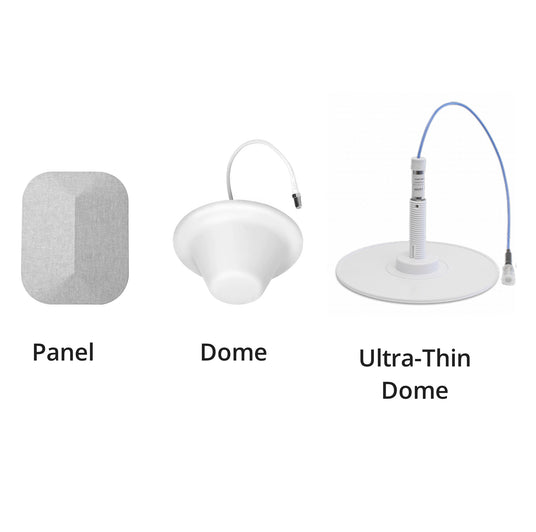
Inside Antenna Options
The type of building you’re working with and how your ceilings are constructed will help determine which inside antennas are the best fit. Here’s a quick guide to help you choose the right option for your space.
- Panel Antenna: A directional antenna that mounts to a wall, ceiling, or floor and focuses signal in a specific direction. It delivers more power than dome antennas, with gain between 7 and 10 dBi. It works especially well in homes with multiple levels, long hallways, or rooms where you want to send signal across floors or toward specific areas.
- Standard Dome Antenna: This ceiling-mounted antenna spreads signal in all directions. It is a great choice for rooms with drop ceilings where you can run cable above the tiles. With 2 to 5 dBi of gain, it provides balanced coverage in open rooms or office areas where you need signal distributed evenly.
- Ultra-Thin Dome Antenna: A low-profile version of the standard dome that blends in better with your ceiling. It offers slightly more power, with 4 to 6 dBi of gain, and looks cleaner in spaces where appearance matters. Like the standard dome, you will need access above the ceiling to run the cable.
How Many Inside Antennas Do You Need?
In spaces with interior walls, one antenna usually covers about 750 to 1,500 square feet. In open areas with fewer walls, a single antenna can often cover 1,500 to 2,500 square feet. This gives you a good starting point when deciding how many antennas your space will need for solid coverage throughout.
Need Help Choosing?
Deciding on the right antenna style and number can be difficult. If you’re not sure what’s best for your situation, give us a call at (888) 974-8237 and one of our signal booster experts would be happy to recommend a solution for you.
Expert Assistance Every Step of the Way
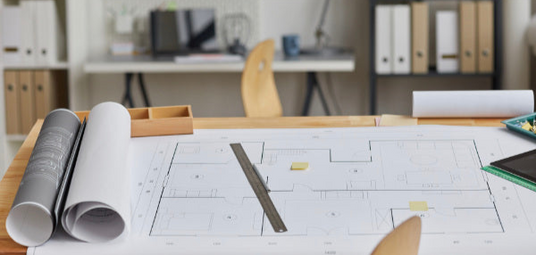
Not only do you get the equipment to start boosting cell signal, but you get an entire time of signal experts at your disposal to make sure that you have everything you need to be successful, including:
- Custom system design and RF modeling. Request that now.
- Priority tech support for optimizing and troubleshooting your new system
- Consultation pre-installation to avoid mistakes
- Access to support materials assembled by our experts on installation pre-planning, troubleshooting, tips and more.
In the Box
-

weBoost 100 Amplifier with Power Supply
-

Outside Antenna
(High Gain Omni, Omni, Yagi, LDPA) -

Up to 4 Inside Antennas (Panel, Dome, Ultra-Thin Dome)
-

75 ft of RG-11 Cable for Outside Antenna Run
-

50 ft of RG-11 Cable - One for Each Inside Antenna
-

Lightning Protector
-

2 ft of RG-11 Cable
-

2, 3, or 4-Way Splitter for Multiple Inside Antennas
weBoost Office 100 Specs
General Info
General Info
-
SKU473060-YP-1
-
UPC810005963114
-
ConditionNew
-
Warranty3 Years
-
Installation TypeDIY Installation
-
SKU473060-YP-2
-
UPC810005963114
-
ConditionNew
-
Warranty3 Years
-
Installation TypeDIY Installation
-
SKU473060-YP-3
-
UPC810005963114
-
ConditionNew
-
Warranty3 Years
-
Installation TypeDIY Installation
-
SKU473060-YP-4
-
UPC810005963114
-
ConditionNew
-
Warranty3 Years
-
Installation TypeDIY Installation
-
SKU473060-YD-1
-
UPC810005963114
-
ConditionNew
-
Warranty3 Years
-
Installation TypeDIY Installation
-
SKU473060-YD-2
-
UPC810005963114
-
ConditionNew
-
Warranty3 Years
-
Installation TypeDIY Installation
-
SKU473060-YD-3
-
UPC810005963114
-
ConditionNew
-
Warranty3 Years
-
Installation TypeDIY Installation
-
SKU473060-YD-4
-
UPC810005963114
-
ConditionNew
-
Warranty3 Years
-
Installation TypeDIY Installation
-
SKU473060-YU-1
-
UPC810005963114
-
ConditionNew
-
Warranty3 Years
-
Installation TypeDIY Installation
-
SKU473060-YU-2
-
UPC810005963114
-
ConditionNew
-
Warranty3 Years
-
Installation TypeDIY Installation
-
SKU473060-YU-3
-
UPC810005963114
-
ConditionNew
-
Warranty3 Years
-
Installation TypeDIY Installation
-
SKU473060-YU-4
-
UPC810005963114
-
ConditionNew
-
Warranty3 Years
-
Installation TypeDIY Installation
-
SKU473060-OP-1
-
UPC810005963114
-
ConditionNew
-
Warranty3 Years
-
Installation TypeDIY Installation
-
SKU473060-OP-2
-
UPC810005963114
-
ConditionNew
-
Warranty3 Years
-
Installation TypeDIY Installation
-
SKU473060-OP-3
-
UPC810005963114
-
ConditionNew
-
Warranty3 Years
-
Installation TypeDIY Installation
-
SKU473060-OP-4
-
UPC810005963114
-
ConditionNew
-
Warranty3 Years
-
Installation TypeDIY Installation
-
SKU473060
-
UPC810005963114
-
ConditionNew
-
Warranty3 Years
-
Installation TypeDIY Installation
-
SKU473060-OD-2
-
UPC810005963114
-
ConditionNew
-
Warranty3 Years
-
Installation TypeDIY Installation
-
SKU473060-OD-3
-
UPC810005963114
-
ConditionNew
-
Warranty3 Years
-
Installation TypeDIY Installation
-
SKU473060-OD-4
-
UPC810005963114
-
ConditionNew
-
Warranty3 Years
-
Installation TypeDIY Installation
-
SKU473060-OU-1
-
UPC810005963114
-
ConditionNew
-
Warranty3 Years
-
Installation TypeDIY Installation
-
SKU473060-OU-2
-
UPC810005963114
-
ConditionNew
-
Warranty3 Years
-
Installation TypeDIY Installation
-
SKU473060-OU-3
-
UPC810005963114
-
ConditionNew
-
Warranty3 Years
-
Installation TypeDIY Installation
-
SKU473060-OU-4
-
UPC810005963114
-
ConditionNew
-
Warranty3 Years
-
Installation TypeDIY Installation
-
SKU473060-LP-1
-
UPC810005963114
-
ConditionNew
-
Warranty3 Years
-
Installation TypeDIY Installation
-
SKU473060-LP-2
-
UPC810005963114
-
ConditionNew
-
Warranty3 Years
-
Installation TypeDIY Installation
-
SKU473060-LP-3
-
UPC810005963114
-
ConditionNew
-
Warranty3 Years
-
Installation TypeDIY Installation
-
SKU473060-LP-4
-
UPC810005963114
-
ConditionNew
-
Warranty3 Years
-
Installation TypeDIY Installation
-
SKU473060-LD-1
-
UPC810005963114
-
ConditionNew
-
Warranty3 Years
-
Installation TypeDIY Installation
-
SKU473060-LD-2
-
UPC810005963114
-
ConditionNew
-
Warranty3 Years
-
Installation TypeDIY Installation
-
SKU473060-LD-3
-
UPC810005963114
-
ConditionNew
-
Warranty3 Years
-
Installation TypeDIY Installation
-
SKU473060-LD-4
-
UPC810005963114
-
ConditionNew
-
Warranty3 Years
-
Installation TypeDIY Installation
-
SKU473060-LU-1
-
UPC810005963114
-
ConditionNew
-
Warranty3 Years
-
Installation TypeDIY Installation
-
SKU473060-LU-2
-
UPC810005963114
-
ConditionNew
-
Warranty3 Years
-
Installation TypeDIY Installation
-
SKU473060-LU-3
-
UPC810005963114
-
ConditionNew
-
Warranty3 Years
-
Installation TypeDIY Installation
-
SKU473060-LU-4
-
UPC810005963114
-
ConditionNew
-
Warranty3 Years
-
Installation TypeDIY Installation
-
SKU473060-TU-1
-
UPC810005963114
-
ConditionNew
-
Warranty3 Years
-
Installation TypeDIY Installation
-
SKU473060-TU-2
-
UPC810005963114
-
ConditionNew
-
Warranty3 Years
-
Installation TypeDIY Installation
-
SKU473060-TU-3
-
UPC810005963114
-
ConditionNew
-
Warranty3 Years
-
Installation TypeDIY Installation
-
SKU473060-TU-4
-
UPC810005963114
-
ConditionNew
-
Warranty3 Years
-
Installation TypeDIY Installation
-
SKU473060-TP-1
-
UPC810005963114
-
ConditionNew
-
Warranty3 Years
-
Installation TypeDIY Installation
-
SKU473060-TP-2
-
UPC810005963114
-
ConditionNew
-
Warranty3 Years
-
Installation TypeDIY Installation
-
SKU473060-TP-3
-
UPC810005963114
-
ConditionNew
-
Warranty3 Years
-
Installation TypeDIY Installation
-
SKU473060-TP-4
-
UPC810005963114
-
ConditionNew
-
Warranty3 Years
-
Installation TypeDIY Installation
-
SKU473060-TD-1
-
UPC810005963114
-
ConditionNew
-
Warranty3 Years
-
Installation TypeDIY Installation
-
SKU473060-TD-2
-
UPC810005963114
-
ConditionNew
-
Warranty3 Years
-
Installation TypeDIY Installation
-
SKU473060-TD-3
-
UPC810005963114
-
ConditionNew
-
Warranty3 Years
-
Installation TypeDIY Installation
-
SKU473060-TD-4
-
UPC810005963114
-
ConditionNew
-
Warranty3 Years
-
Installation TypeDIY Installation
Technical Specs
Technical Specs
-
Impedance75 ohm
-
Gain (Up/Down)72 dB
-
Power Requirements110-240V AC, 50-60 Hz, 20 W
-
ConnectorF-Female
-
Dimensions6 x 6 x 1.8 in
-
Impedance75 ohm
-
Gain (Up/Down)72 dB
-
Power Requirements110-240V AC, 50-60 Hz, 20 W
-
ConnectorF-Female
-
Dimensions6 x 6 x 1.8 in
-
Impedance75 ohm
-
Gain (Up/Down)72 dB
-
Power Requirements110-240V AC, 50-60 Hz, 20 W
-
ConnectorF-Female
-
Dimensions6 x 6 x 1.8 in
-
Impedance75 ohm
-
Gain (Up/Down)72 dB
-
Power Requirements110-240V AC, 50-60 Hz, 20 W
-
ConnectorF-Female
-
Dimensions6 x 6 x 1.8 in
-
Impedance75 ohm
-
Gain (Up/Down)72 dB
-
Power Requirements110-240V AC, 50-60 Hz, 20 W
-
ConnectorF-Female
-
Dimensions6 x 6 x 1.8 in
-
Impedance75 ohm
-
Gain (Up/Down)72 dB
-
Power Requirements110-240V AC, 50-60 Hz, 20 W
-
ConnectorF-Female
-
Dimensions6 x 6 x 1.8 in
-
Impedance75 ohm
-
Gain (Up/Down)72 dB
-
Power Requirements110-240V AC, 50-60 Hz, 20 W
-
ConnectorF-Female
-
Dimensions6 x 6 x 1.8 in
-
Impedance75 ohm
-
Gain (Up/Down)72 dB
-
Power Requirements110-240V AC, 50-60 Hz, 20 W
-
ConnectorF-Female
-
Dimensions6 x 6 x 1.8 in
-
Impedance75 ohm
-
Gain (Up/Down)72 dB
-
Power Requirements110-240V AC, 50-60 Hz, 20 W
-
ConnectorF-Female
-
Dimensions6 x 6 x 1.8 in
-
Impedance75 ohm
-
Gain (Up/Down)72 dB
-
Power Requirements110-240V AC, 50-60 Hz, 20 W
-
ConnectorF-Female
-
Dimensions6 x 6 x 1.8 in
-
Impedance75 ohm
-
Gain (Up/Down)72 dB
-
Power Requirements110-240V AC, 50-60 Hz, 20 W
-
ConnectorF-Female
-
Dimensions6 x 6 x 1.8 in
-
Impedance75 ohm
-
Gain (Up/Down)72 dB
-
Power Requirements110-240V AC, 50-60 Hz, 20 W
-
ConnectorF-Female
-
Dimensions6 x 6 x 1.8 in
-
Impedance75 ohm
-
Gain (Up/Down)72 dB
-
Power Requirements110-240V AC, 50-60 Hz, 20 W
-
ConnectorF-Female
-
Dimensions6 x 6 x 1.8 in
-
Impedance75 ohm
-
Gain (Up/Down)72 dB
-
Power Requirements110-240V AC, 50-60 Hz, 20 W
-
ConnectorF-Female
-
Dimensions6 x 6 x 1.8 in
-
Impedance75 ohm
-
Gain (Up/Down)72 dB
-
Power Requirements110-240V AC, 50-60 Hz, 20 W
-
ConnectorF-Female
-
Dimensions6 x 6 x 1.8 in
-
Impedance75 ohm
-
Gain (Up/Down)72 dB
-
Power Requirements110-240V AC, 50-60 Hz, 20 W
-
ConnectorF-Female
-
Dimensions6 x 6 x 1.8 in
-
Impedance75 ohm
-
Gain (Up/Down)72 dB
-
Power Requirements110-240V AC, 50-60 Hz, 20 W
-
ConnectorF-Female
-
Dimensions6 x 6 x 1.8 in
-
Impedance75 ohm
-
Gain (Up/Down)72 dB
-
Power Requirements110-240V AC, 50-60 Hz, 20 W
-
ConnectorF-Female
-
Dimensions6 x 6 x 1.8 in
-
Impedance75 ohm
-
Gain (Up/Down)72 dB
-
Power Requirements110-240V AC, 50-60 Hz, 20 W
-
ConnectorF-Female
-
Dimensions6 x 6 x 1.8 in
-
Impedance75 ohm
-
Gain (Up/Down)72 dB
-
Power Requirements110-240V AC, 50-60 Hz, 20 W
-
ConnectorF-Female
-
Dimensions6 x 6 x 1.8 in
-
Impedance75 ohm
-
Gain (Up/Down)72 dB
-
Power Requirements110-240V AC, 50-60 Hz, 20 W
-
ConnectorF-Female
-
Dimensions6 x 6 x 1.8 in
-
Impedance75 ohm
-
Gain (Up/Down)72 dB
-
Power Requirements110-240V AC, 50-60 Hz, 20 W
-
ConnectorF-Female
-
Dimensions6 x 6 x 1.8 in
-
Impedance75 ohm
-
Gain (Up/Down)72 dB
-
Power Requirements110-240V AC, 50-60 Hz, 20 W
-
ConnectorF-Female
-
Dimensions6 x 6 x 1.8 in
-
Impedance75 ohm
-
Gain (Up/Down)72 dB
-
Power Requirements110-240V AC, 50-60 Hz, 20 W
-
ConnectorF-Female
-
Dimensions6 x 6 x 1.8 in
-
Impedance75 ohm
-
Gain (Up/Down)72 dB
-
Power Requirements110-240V AC, 50-60 Hz, 20 W
-
ConnectorF-Female
-
Dimensions6 x 6 x 1.8 in
-
Impedance75 ohm
-
Gain (Up/Down)72 dB
-
Power Requirements110-240V AC, 50-60 Hz, 20 W
-
ConnectorF-Female
-
Dimensions6 x 6 x 1.8 in
-
Impedance75 ohm
-
Gain (Up/Down)72 dB
-
Power Requirements110-240V AC, 50-60 Hz, 20 W
-
ConnectorF-Female
-
Dimensions6 x 6 x 1.8 in
-
Impedance75 ohm
-
Gain (Up/Down)72 dB
-
Power Requirements110-240V AC, 50-60 Hz, 20 W
-
ConnectorF-Female
-
Dimensions6 x 6 x 1.8 in
-
Impedance75 ohm
-
Gain (Up/Down)72 dB
-
Power Requirements110-240V AC, 50-60 Hz, 20 W
-
ConnectorF-Female
-
Dimensions6 x 6 x 1.8 in
-
Impedance75 ohm
-
Gain (Up/Down)72 dB
-
Power Requirements110-240V AC, 50-60 Hz, 20 W
-
ConnectorF-Female
-
Dimensions6 x 6 x 1.8 in
-
Impedance75 ohm
-
Gain (Up/Down)72 dB
-
Power Requirements110-240V AC, 50-60 Hz, 20 W
-
ConnectorF-Female
-
Dimensions6 x 6 x 1.8 in
-
Impedance75 ohm
-
Gain (Up/Down)72 dB
-
Power Requirements110-240V AC, 50-60 Hz, 20 W
-
ConnectorF-Female
-
Dimensions6 x 6 x 1.8 in
-
Impedance75 ohm
-
Gain (Up/Down)72 dB
-
Power Requirements110-240V AC, 50-60 Hz, 20 W
-
ConnectorF-Female
-
Dimensions6 x 6 x 1.8 in
-
Impedance75 ohm
-
Gain (Up/Down)72 dB
-
Power Requirements110-240V AC, 50-60 Hz, 20 W
-
ConnectorF-Female
-
Dimensions6 x 6 x 1.8 in
-
Impedance75 ohm
-
Gain (Up/Down)72 dB
-
Power Requirements110-240V AC, 50-60 Hz, 20 W
-
ConnectorF-Female
-
Dimensions6 x 6 x 1.8 in
-
Impedance75 ohm
-
Gain (Up/Down)72 dB
-
Power Requirements110-240V AC, 50-60 Hz, 20 W
-
ConnectorF-Female
-
Dimensions6 x 6 x 1.8 in
-
Impedance75 ohm
-
Gain (Up/Down)72 dB
-
Power Requirements110-240V AC, 50-60 Hz, 20 W
-
ConnectorF-Female
-
Dimensions6 x 6 x 1.8 in
-
Impedance75 ohm
-
Gain (Up/Down)72 dB
-
Power Requirements110-240V AC, 50-60 Hz, 20 W
-
ConnectorF-Female
-
Dimensions6 x 6 x 1.8 in
-
Impedance75 ohm
-
Gain (Up/Down)72 dB
-
Power Requirements110-240V AC, 50-60 Hz, 20 W
-
ConnectorF-Female
-
Dimensions6 x 6 x 1.8 in
-
Impedance75 ohm
-
Gain (Up/Down)72 dB
-
Power Requirements110-240V AC, 50-60 Hz, 20 W
-
ConnectorF-Female
-
Dimensions6 x 6 x 1.8 in
-
Impedance75 ohm
-
Gain (Up/Down)72 dB
-
Power Requirements110-240V AC, 50-60 Hz, 20 W
-
ConnectorF-Female
-
Dimensions6 x 6 x 1.8 in
-
Impedance75 ohm
-
Gain (Up/Down)72 dB
-
Power Requirements110-240V AC, 50-60 Hz, 20 W
-
ConnectorF-Female
-
Dimensions6 x 6 x 1.8 in
-
Impedance75 ohm
-
Gain (Up/Down)72 dB
-
Power Requirements110-240V AC, 50-60 Hz, 20 W
-
ConnectorF-Female
-
Dimensions6 x 6 x 1.8 in
-
Impedance75 ohm
-
Gain (Up/Down)72 dB
-
Power Requirements110-240V AC, 50-60 Hz, 20 W
-
ConnectorF-Female
-
Dimensions6 x 6 x 1.8 in
-
Impedance75 ohm
-
Gain (Up/Down)72 dB
-
Power Requirements110-240V AC, 50-60 Hz, 20 W
-
ConnectorF-Female
-
Dimensions6 x 6 x 1.8 in
-
Impedance75 ohm
-
Gain (Up/Down)72 dB
-
Power Requirements110-240V AC, 50-60 Hz, 20 W
-
ConnectorF-Female
-
Dimensions6 x 6 x 1.8 in
-
Impedance75 ohm
-
Gain (Up/Down)72 dB
-
Power Requirements110-240V AC, 50-60 Hz, 20 W
-
ConnectorF-Female
-
Dimensions6 x 6 x 1.8 in
-
Impedance75 ohm
-
Gain (Up/Down)72 dB
-
Power Requirements110-240V AC, 50-60 Hz, 20 W
-
ConnectorF-Female
-
Dimensions6 x 6 x 1.8 in
Performance & Compatibility
Performance & Compatibility
-
Max CoverageUp to 15,000 sq ft
-
Frequencies Supported700MHz, 800MHz, 1900MHz, 1700/2100MHz
-
Specific Frequencies Supported698 - 716 MHz / 728 - 746 MHz, 776 - 787 MHz / 746 - 757 MHz, 824 - 849 MHz / 869 - 894 MHz, 1710 - 1755 MHz / 2110 - 2155 MHz, 1850 - 1915 MHz / 1930 - 1995 MHz
-
Supported CarriersAT&T, Sprint, T-Mobile, U.S. Cellular, Verizon, Boost Mobile, Consumer Cellular, Cricket Wireless, Dish Wireless, Google Fi, Metro By T-Mobile, Mint Mobile, Net10 Wireless, Spectrum Mobile, Straight Talk, Xfinity Mobile
-
Max CoverageUp to 15,000 sq ft
-
Frequencies Supported700MHz, 800MHz, 1900MHz, 1700/2100MHz
-
Specific Frequencies Supported698 - 716 MHz / 728 - 746 MHz, 776 - 787 MHz / 746 - 757 MHz, 824 - 849 MHz / 869 - 894 MHz, 1710 - 1755 MHz / 2110 - 2155 MHz, 1850 - 1915 MHz / 1930 - 1995 MHz
-
Supported CarriersAT&T, Sprint, T-Mobile, U.S. Cellular, Verizon, Boost Mobile, Consumer Cellular, Cricket Wireless, Dish Wireless, Google Fi, Metro By T-Mobile, Mint Mobile, Net10 Wireless, Spectrum Mobile, Straight Talk, Xfinity Mobile
-
Max CoverageUp to 15,000 sq ft
-
Frequencies Supported700MHz, 800MHz, 1900MHz, 1700/2100MHz
-
Specific Frequencies Supported698 - 716 MHz / 728 - 746 MHz, 776 - 787 MHz / 746 - 757 MHz, 824 - 849 MHz / 869 - 894 MHz, 1710 - 1755 MHz / 2110 - 2155 MHz, 1850 - 1915 MHz / 1930 - 1995 MHz
-
Supported CarriersAT&T, Sprint, T-Mobile, U.S. Cellular, Verizon, Boost Mobile, Consumer Cellular, Cricket Wireless, Dish Wireless, Google Fi, Metro By T-Mobile, Mint Mobile, Net10 Wireless, Spectrum Mobile, Straight Talk, Xfinity Mobile
-
Max CoverageUp to 15,000 sq ft
-
Frequencies Supported700MHz, 800MHz, 1900MHz, 1700/2100MHz
-
Specific Frequencies Supported698 - 716 MHz / 728 - 746 MHz, 776 - 787 MHz / 746 - 757 MHz, 824 - 849 MHz / 869 - 894 MHz, 1710 - 1755 MHz / 2110 - 2155 MHz, 1850 - 1915 MHz / 1930 - 1995 MHz
-
Supported CarriersAT&T, Sprint, T-Mobile, U.S. Cellular, Verizon, Boost Mobile, Consumer Cellular, Cricket Wireless, Dish Wireless, Google Fi, Metro By T-Mobile, Mint Mobile, Net10 Wireless, Spectrum Mobile, Straight Talk, Xfinity Mobile
-
Max CoverageUp to 15,000 sq ft
-
Frequencies Supported700MHz, 800MHz, 1900MHz, 1700/2100MHz
-
Specific Frequencies Supported698 - 716 MHz / 728 - 746 MHz, 776 - 787 MHz / 746 - 757 MHz, 824 - 849 MHz / 869 - 894 MHz, 1710 - 1755 MHz / 2110 - 2155 MHz, 1850 - 1915 MHz / 1930 - 1995 MHz
-
Supported CarriersAT&T, Sprint, T-Mobile, U.S. Cellular, Verizon, Boost Mobile, Consumer Cellular, Cricket Wireless, Dish Wireless, Google Fi, Metro By T-Mobile, Mint Mobile, Net10 Wireless, Spectrum Mobile, Straight Talk, Xfinity Mobile
-
Max CoverageUp to 15,000 sq ft
-
Frequencies Supported700MHz, 800MHz, 1900MHz, 1700/2100MHz
-
Specific Frequencies Supported698 - 716 MHz / 728 - 746 MHz, 776 - 787 MHz / 746 - 757 MHz, 824 - 849 MHz / 869 - 894 MHz, 1710 - 1755 MHz / 2110 - 2155 MHz, 1850 - 1915 MHz / 1930 - 1995 MHz
-
Supported CarriersAT&T, Sprint, T-Mobile, U.S. Cellular, Verizon, Boost Mobile, Consumer Cellular, Cricket Wireless, Dish Wireless, Google Fi, Metro By T-Mobile, Mint Mobile, Net10 Wireless, Spectrum Mobile, Straight Talk, Xfinity Mobile
-
Max CoverageUp to 15,000 sq ft
-
Frequencies Supported700MHz, 800MHz, 1900MHz, 1700/2100MHz
-
Specific Frequencies Supported698 - 716 MHz / 728 - 746 MHz, 776 - 787 MHz / 746 - 757 MHz, 824 - 849 MHz / 869 - 894 MHz, 1710 - 1755 MHz / 2110 - 2155 MHz, 1850 - 1915 MHz / 1930 - 1995 MHz
-
Supported CarriersAT&T, Sprint, T-Mobile, U.S. Cellular, Verizon, Boost Mobile, Consumer Cellular, Cricket Wireless, Dish Wireless, Google Fi, Metro By T-Mobile, Mint Mobile, Net10 Wireless, Spectrum Mobile, Straight Talk, Xfinity Mobile
-
Max CoverageUp to 15,000 sq ft
-
Frequencies Supported700MHz, 800MHz, 1900MHz, 1700/2100MHz
-
Specific Frequencies Supported698 - 716 MHz / 728 - 746 MHz, 776 - 787 MHz / 746 - 757 MHz, 824 - 849 MHz / 869 - 894 MHz, 1710 - 1755 MHz / 2110 - 2155 MHz, 1850 - 1915 MHz / 1930 - 1995 MHz
-
Supported CarriersAT&T, Sprint, T-Mobile, U.S. Cellular, Verizon, Boost Mobile, Consumer Cellular, Cricket Wireless, Dish Wireless, Google Fi, Metro By T-Mobile, Mint Mobile, Net10 Wireless, Spectrum Mobile, Straight Talk, Xfinity Mobile
-
Max CoverageUp to 15,000 sq ft
-
Frequencies Supported700MHz, 800MHz, 1900MHz, 1700/2100MHz
-
Specific Frequencies Supported698 - 716 MHz / 728 - 746 MHz, 776 - 787 MHz / 746 - 757 MHz, 824 - 849 MHz / 869 - 894 MHz, 1710 - 1755 MHz / 2110 - 2155 MHz, 1850 - 1915 MHz / 1930 - 1995 MHz
-
Supported CarriersAT&T, Sprint, T-Mobile, U.S. Cellular, Verizon, Boost Mobile, Consumer Cellular, Cricket Wireless, Dish Wireless, Google Fi, Metro By T-Mobile, Mint Mobile, Net10 Wireless, Spectrum Mobile, Straight Talk, Xfinity Mobile
-
Max CoverageUp to 15,000 sq ft
-
Frequencies Supported700MHz, 800MHz, 1900MHz, 1700/2100MHz
-
Specific Frequencies Supported698 - 716 MHz / 728 - 746 MHz, 776 - 787 MHz / 746 - 757 MHz, 824 - 849 MHz / 869 - 894 MHz, 1710 - 1755 MHz / 2110 - 2155 MHz, 1850 - 1915 MHz / 1930 - 1995 MHz
-
Supported CarriersAT&T, Sprint, T-Mobile, U.S. Cellular, Verizon, Boost Mobile, Consumer Cellular, Cricket Wireless, Dish Wireless, Google Fi, Metro By T-Mobile, Mint Mobile, Net10 Wireless, Spectrum Mobile, Straight Talk, Xfinity Mobile
-
Max CoverageUp to 15,000 sq ft
-
Frequencies Supported700MHz, 800MHz, 1900MHz, 1700/2100MHz
-
Specific Frequencies Supported698 - 716 MHz / 728 - 746 MHz, 776 - 787 MHz / 746 - 757 MHz, 824 - 849 MHz / 869 - 894 MHz, 1710 - 1755 MHz / 2110 - 2155 MHz, 1850 - 1915 MHz / 1930 - 1995 MHz
-
Supported CarriersAT&T, Sprint, T-Mobile, U.S. Cellular, Verizon, Boost Mobile, Consumer Cellular, Cricket Wireless, Dish Wireless, Google Fi, Metro By T-Mobile, Mint Mobile, Net10 Wireless, Spectrum Mobile, Straight Talk, Xfinity Mobile
-
Max CoverageUp to 15,000 sq ft
-
Frequencies Supported700MHz, 800MHz, 1900MHz, 1700/2100MHz
-
Specific Frequencies Supported698 - 716 MHz / 728 - 746 MHz, 776 - 787 MHz / 746 - 757 MHz, 824 - 849 MHz / 869 - 894 MHz, 1710 - 1755 MHz / 2110 - 2155 MHz, 1850 - 1915 MHz / 1930 - 1995 MHz
-
Supported CarriersAT&T, Sprint, T-Mobile, U.S. Cellular, Verizon, Boost Mobile, Consumer Cellular, Cricket Wireless, Dish Wireless, Google Fi, Metro By T-Mobile, Mint Mobile, Net10 Wireless, Spectrum Mobile, Straight Talk, Xfinity Mobile
-
Max CoverageUp to 15,000 sq ft
-
Frequencies Supported700MHz, 800MHz, 1900MHz, 1700/2100MHz
-
Specific Frequencies Supported698 - 716 MHz / 728 - 746 MHz, 776 - 787 MHz / 746 - 757 MHz, 824 - 849 MHz / 869 - 894 MHz, 1710 - 1755 MHz / 2110 - 2155 MHz, 1850 - 1915 MHz / 1930 - 1995 MHz
-
Supported CarriersAT&T, Sprint, T-Mobile, U.S. Cellular, Verizon, Boost Mobile, Consumer Cellular, Cricket Wireless, Dish Wireless, Google Fi, Metro By T-Mobile, Mint Mobile, Net10 Wireless, Spectrum Mobile, Straight Talk, Xfinity Mobile
-
Max CoverageUp to 15,000 sq ft
-
Frequencies Supported700MHz, 800MHz, 1900MHz, 1700/2100MHz
-
Specific Frequencies Supported698 - 716 MHz / 728 - 746 MHz, 776 - 787 MHz / 746 - 757 MHz, 824 - 849 MHz / 869 - 894 MHz, 1710 - 1755 MHz / 2110 - 2155 MHz, 1850 - 1915 MHz / 1930 - 1995 MHz
-
Supported CarriersAT&T, Sprint, T-Mobile, U.S. Cellular, Verizon, Boost Mobile, Consumer Cellular, Cricket Wireless, Dish Wireless, Google Fi, Metro By T-Mobile, Mint Mobile, Net10 Wireless, Spectrum Mobile, Straight Talk, Xfinity Mobile
-
Max CoverageUp to 15,000 sq ft
-
Frequencies Supported700MHz, 800MHz, 1900MHz, 1700/2100MHz
-
Specific Frequencies Supported698 - 716 MHz / 728 - 746 MHz, 776 - 787 MHz / 746 - 757 MHz, 824 - 849 MHz / 869 - 894 MHz, 1710 - 1755 MHz / 2110 - 2155 MHz, 1850 - 1915 MHz / 1930 - 1995 MHz
-
Supported CarriersAT&T, Sprint, T-Mobile, U.S. Cellular, Verizon, Boost Mobile, Consumer Cellular, Cricket Wireless, Dish Wireless, Google Fi, Metro By T-Mobile, Mint Mobile, Net10 Wireless, Spectrum Mobile, Straight Talk, Xfinity Mobile
-
Max CoverageUp to 15,000 sq ft
-
Frequencies Supported700MHz, 800MHz, 1900MHz, 1700/2100MHz
-
Specific Frequencies Supported698 - 716 MHz / 728 - 746 MHz, 776 - 787 MHz / 746 - 757 MHz, 824 - 849 MHz / 869 - 894 MHz, 1710 - 1755 MHz / 2110 - 2155 MHz, 1850 - 1915 MHz / 1930 - 1995 MHz
-
Supported CarriersAT&T, Sprint, T-Mobile, U.S. Cellular, Verizon, Boost Mobile, Consumer Cellular, Cricket Wireless, Dish Wireless, Google Fi, Metro By T-Mobile, Mint Mobile, Net10 Wireless, Spectrum Mobile, Straight Talk, Xfinity Mobile
-
Max CoverageUp to 15,000 sq ft
-
Frequencies Supported700MHz, 800MHz, 1900MHz, 1700/2100MHz
-
Specific Frequencies Supported698 - 716 MHz / 728 - 746 MHz, 776 - 787 MHz / 746 - 757 MHz, 824 - 849 MHz / 869 - 894 MHz, 1710 - 1755 MHz / 2110 - 2155 MHz, 1850 - 1915 MHz / 1930 - 1995 MHz
-
Supported CarriersAT&T, Sprint, T-Mobile, U.S. Cellular, Verizon, Boost Mobile, Consumer Cellular, Cricket Wireless, Dish Wireless, Google Fi, Metro By T-Mobile, Mint Mobile, Net10 Wireless, Spectrum Mobile, Straight Talk, Xfinity Mobile
-
Max CoverageUp to 15,000 sq ft
-
Frequencies Supported700MHz, 800MHz, 1900MHz, 1700/2100MHz
-
Specific Frequencies Supported698 - 716 MHz / 728 - 746 MHz, 776 - 787 MHz / 746 - 757 MHz, 824 - 849 MHz / 869 - 894 MHz, 1710 - 1755 MHz / 2110 - 2155 MHz, 1850 - 1915 MHz / 1930 - 1995 MHz
-
Supported CarriersAT&T, Sprint, T-Mobile, U.S. Cellular, Verizon, Boost Mobile, Consumer Cellular, Cricket Wireless, Dish Wireless, Google Fi, Metro By T-Mobile, Mint Mobile, Net10 Wireless, Spectrum Mobile, Straight Talk, Xfinity Mobile
-
Max CoverageUp to 15,000 sq ft
-
Frequencies Supported700MHz, 800MHz, 1900MHz, 1700/2100MHz
-
Specific Frequencies Supported698 - 716 MHz / 728 - 746 MHz, 776 - 787 MHz / 746 - 757 MHz, 824 - 849 MHz / 869 - 894 MHz, 1710 - 1755 MHz / 2110 - 2155 MHz, 1850 - 1915 MHz / 1930 - 1995 MHz
-
Supported CarriersAT&T, Sprint, T-Mobile, U.S. Cellular, Verizon, Boost Mobile, Consumer Cellular, Cricket Wireless, Dish Wireless, Google Fi, Metro By T-Mobile, Mint Mobile, Net10 Wireless, Spectrum Mobile, Straight Talk, Xfinity Mobile
-
Max CoverageUp to 15,000 sq ft
-
Frequencies Supported700MHz, 800MHz, 1900MHz, 1700/2100MHz
-
Specific Frequencies Supported698 - 716 MHz / 728 - 746 MHz, 776 - 787 MHz / 746 - 757 MHz, 824 - 849 MHz / 869 - 894 MHz, 1710 - 1755 MHz / 2110 - 2155 MHz, 1850 - 1915 MHz / 1930 - 1995 MHz
-
Supported CarriersAT&T, Sprint, T-Mobile, U.S. Cellular, Verizon, Boost Mobile, Consumer Cellular, Cricket Wireless, Dish Wireless, Google Fi, Metro By T-Mobile, Mint Mobile, Net10 Wireless, Spectrum Mobile, Straight Talk, Xfinity Mobile
-
Max CoverageUp to 15,000 sq ft
-
Frequencies Supported700MHz, 800MHz, 1900MHz, 1700/2100MHz
-
Specific Frequencies Supported698 - 716 MHz / 728 - 746 MHz, 776 - 787 MHz / 746 - 757 MHz, 824 - 849 MHz / 869 - 894 MHz, 1710 - 1755 MHz / 2110 - 2155 MHz, 1850 - 1915 MHz / 1930 - 1995 MHz
-
Supported CarriersAT&T, Sprint, T-Mobile, U.S. Cellular, Verizon, Boost Mobile, Consumer Cellular, Cricket Wireless, Dish Wireless, Google Fi, Metro By T-Mobile, Mint Mobile, Net10 Wireless, Spectrum Mobile, Straight Talk, Xfinity Mobile
-
Max CoverageUp to 15,000 sq ft
-
Frequencies Supported700MHz, 800MHz, 1900MHz, 1700/2100MHz
-
Specific Frequencies Supported698 - 716 MHz / 728 - 746 MHz, 776 - 787 MHz / 746 - 757 MHz, 824 - 849 MHz / 869 - 894 MHz, 1710 - 1755 MHz / 2110 - 2155 MHz, 1850 - 1915 MHz / 1930 - 1995 MHz
-
Supported CarriersAT&T, Sprint, T-Mobile, U.S. Cellular, Verizon, Boost Mobile, Consumer Cellular, Cricket Wireless, Dish Wireless, Google Fi, Metro By T-Mobile, Mint Mobile, Net10 Wireless, Spectrum Mobile, Straight Talk, Xfinity Mobile
-
Max CoverageUp to 15,000 sq ft
-
Frequencies Supported700MHz, 800MHz, 1900MHz, 1700/2100MHz
-
Specific Frequencies Supported698 - 716 MHz / 728 - 746 MHz, 776 - 787 MHz / 746 - 757 MHz, 824 - 849 MHz / 869 - 894 MHz, 1710 - 1755 MHz / 2110 - 2155 MHz, 1850 - 1915 MHz / 1930 - 1995 MHz
-
Supported CarriersAT&T, Sprint, T-Mobile, U.S. Cellular, Verizon, Boost Mobile, Consumer Cellular, Cricket Wireless, Dish Wireless, Google Fi, Metro By T-Mobile, Mint Mobile, Net10 Wireless, Spectrum Mobile, Straight Talk, Xfinity Mobile
-
Max CoverageUp to 15,000 sq ft
-
Frequencies Supported700MHz, 800MHz, 1900MHz, 1700/2100MHz
-
Specific Frequencies Supported698 - 716 MHz / 728 - 746 MHz, 776 - 787 MHz / 746 - 757 MHz, 824 - 849 MHz / 869 - 894 MHz, 1710 - 1755 MHz / 2110 - 2155 MHz, 1850 - 1915 MHz / 1930 - 1995 MHz
-
Supported CarriersAT&T, Sprint, T-Mobile, U.S. Cellular, Verizon, Boost Mobile, Consumer Cellular, Cricket Wireless, Dish Wireless, Google Fi, Metro By T-Mobile, Mint Mobile, Net10 Wireless, Spectrum Mobile, Straight Talk, Xfinity Mobile
-
Max CoverageUp to 15,000 sq ft
-
Frequencies Supported700MHz, 800MHz, 1900MHz, 1700/2100MHz
-
Specific Frequencies Supported698 - 716 MHz / 728 - 746 MHz, 776 - 787 MHz / 746 - 757 MHz, 824 - 849 MHz / 869 - 894 MHz, 1710 - 1755 MHz / 2110 - 2155 MHz, 1850 - 1915 MHz / 1930 - 1995 MHz
-
Supported CarriersAT&T, Sprint, T-Mobile, U.S. Cellular, Verizon, Boost Mobile, Consumer Cellular, Cricket Wireless, Dish Wireless, Google Fi, Metro By T-Mobile, Mint Mobile, Net10 Wireless, Spectrum Mobile, Straight Talk, Xfinity Mobile
-
Max CoverageUp to 15,000 sq ft
-
Frequencies Supported700MHz, 800MHz, 1900MHz, 1700/2100MHz
-
Specific Frequencies Supported698 - 716 MHz / 728 - 746 MHz, 776 - 787 MHz / 746 - 757 MHz, 824 - 849 MHz / 869 - 894 MHz, 1710 - 1755 MHz / 2110 - 2155 MHz, 1850 - 1915 MHz / 1930 - 1995 MHz
-
Supported CarriersAT&T, Sprint, T-Mobile, U.S. Cellular, Verizon, Boost Mobile, Consumer Cellular, Cricket Wireless, Dish Wireless, Google Fi, Metro By T-Mobile, Mint Mobile, Net10 Wireless, Spectrum Mobile, Straight Talk, Xfinity Mobile
-
Max CoverageUp to 15,000 sq ft
-
Frequencies Supported700MHz, 800MHz, 1900MHz, 1700/2100MHz
-
Specific Frequencies Supported698 - 716 MHz / 728 - 746 MHz, 776 - 787 MHz / 746 - 757 MHz, 824 - 849 MHz / 869 - 894 MHz, 1710 - 1755 MHz / 2110 - 2155 MHz, 1850 - 1915 MHz / 1930 - 1995 MHz
-
Supported CarriersAT&T, Sprint, T-Mobile, U.S. Cellular, Verizon, Boost Mobile, Consumer Cellular, Cricket Wireless, Dish Wireless, Google Fi, Metro By T-Mobile, Mint Mobile, Net10 Wireless, Spectrum Mobile, Straight Talk, Xfinity Mobile
-
Max CoverageUp to 15,000 sq ft
-
Frequencies Supported700MHz, 800MHz, 1900MHz, 1700/2100MHz
-
Specific Frequencies Supported698 - 716 MHz / 728 - 746 MHz, 776 - 787 MHz / 746 - 757 MHz, 824 - 849 MHz / 869 - 894 MHz, 1710 - 1755 MHz / 2110 - 2155 MHz, 1850 - 1915 MHz / 1930 - 1995 MHz
-
Supported CarriersAT&T, Sprint, T-Mobile, U.S. Cellular, Verizon, Boost Mobile, Consumer Cellular, Cricket Wireless, Dish Wireless, Google Fi, Metro By T-Mobile, Mint Mobile, Net10 Wireless, Spectrum Mobile, Straight Talk, Xfinity Mobile
-
Max CoverageUp to 15,000 sq ft
-
Frequencies Supported700MHz, 800MHz, 1900MHz, 1700/2100MHz
-
Specific Frequencies Supported698 - 716 MHz / 728 - 746 MHz, 776 - 787 MHz / 746 - 757 MHz, 824 - 849 MHz / 869 - 894 MHz, 1710 - 1755 MHz / 2110 - 2155 MHz, 1850 - 1915 MHz / 1930 - 1995 MHz
-
Supported CarriersAT&T, Sprint, T-Mobile, U.S. Cellular, Verizon, Boost Mobile, Consumer Cellular, Cricket Wireless, Dish Wireless, Google Fi, Metro By T-Mobile, Mint Mobile, Net10 Wireless, Spectrum Mobile, Straight Talk, Xfinity Mobile
-
Max CoverageUp to 15,000 sq ft
-
Frequencies Supported700MHz, 800MHz, 1900MHz, 1700/2100MHz
-
Specific Frequencies Supported698 - 716 MHz / 728 - 746 MHz, 776 - 787 MHz / 746 - 757 MHz, 824 - 849 MHz / 869 - 894 MHz, 1710 - 1755 MHz / 2110 - 2155 MHz, 1850 - 1915 MHz / 1930 - 1995 MHz
-
Supported CarriersAT&T, Sprint, T-Mobile, U.S. Cellular, Verizon, Boost Mobile, Consumer Cellular, Cricket Wireless, Dish Wireless, Google Fi, Metro By T-Mobile, Mint Mobile, Net10 Wireless, Spectrum Mobile, Straight Talk, Xfinity Mobile
-
Max CoverageUp to 15,000 sq ft
-
Frequencies Supported700MHz, 800MHz, 1900MHz, 1700/2100MHz
-
Specific Frequencies Supported698 - 716 MHz / 728 - 746 MHz, 776 - 787 MHz / 746 - 757 MHz, 824 - 849 MHz / 869 - 894 MHz, 1710 - 1755 MHz / 2110 - 2155 MHz, 1850 - 1915 MHz / 1930 - 1995 MHz
-
Supported CarriersAT&T, Sprint, T-Mobile, U.S. Cellular, Verizon, Boost Mobile, Consumer Cellular, Cricket Wireless, Dish Wireless, Google Fi, Metro By T-Mobile, Mint Mobile, Net10 Wireless, Spectrum Mobile, Straight Talk, Xfinity Mobile
-
Max CoverageUp to 15,000 sq ft
-
Frequencies Supported700MHz, 800MHz, 1900MHz, 1700/2100MHz
-
Specific Frequencies Supported698 - 716 MHz / 728 - 746 MHz, 776 - 787 MHz / 746 - 757 MHz, 824 - 849 MHz / 869 - 894 MHz, 1710 - 1755 MHz / 2110 - 2155 MHz, 1850 - 1915 MHz / 1930 - 1995 MHz
-
Supported CarriersAT&T, Sprint, T-Mobile, U.S. Cellular, Verizon, Boost Mobile, Consumer Cellular, Cricket Wireless, Dish Wireless, Google Fi, Metro By T-Mobile, Mint Mobile, Net10 Wireless, Spectrum Mobile, Straight Talk, Xfinity Mobile
-
Max CoverageUp to 15,000 sq ft
-
Frequencies Supported700MHz, 800MHz, 1900MHz, 1700/2100MHz
-
Specific Frequencies Supported698 - 716 MHz / 728 - 746 MHz, 776 - 787 MHz / 746 - 757 MHz, 824 - 849 MHz / 869 - 894 MHz, 1710 - 1755 MHz / 2110 - 2155 MHz, 1850 - 1915 MHz / 1930 - 1995 MHz
-
Supported CarriersAT&T, Sprint, T-Mobile, U.S. Cellular, Verizon, Boost Mobile, Consumer Cellular, Cricket Wireless, Dish Wireless, Google Fi, Metro By T-Mobile, Mint Mobile, Net10 Wireless, Spectrum Mobile, Straight Talk, Xfinity Mobile
-
Max CoverageUp to 15,000 sq ft
-
Frequencies Supported700MHz, 800MHz, 1900MHz, 1700/2100MHz
-
Specific Frequencies Supported698 - 716 MHz / 728 - 746 MHz, 776 - 787 MHz / 746 - 757 MHz, 824 - 849 MHz / 869 - 894 MHz, 1710 - 1755 MHz / 2110 - 2155 MHz, 1850 - 1915 MHz / 1930 - 1995 MHz
-
Supported CarriersAT&T, Sprint, T-Mobile, U.S. Cellular, Verizon, Boost Mobile, Consumer Cellular, Cricket Wireless, Dish Wireless, Google Fi, Metro By T-Mobile, Mint Mobile, Net10 Wireless, Spectrum Mobile, Straight Talk, Xfinity Mobile
-
Max CoverageUp to 15,000 sq ft
-
Frequencies Supported700MHz, 800MHz, 1900MHz, 1700/2100MHz
-
Specific Frequencies Supported698 - 716 MHz / 728 - 746 MHz, 776 - 787 MHz / 746 - 757 MHz, 824 - 849 MHz / 869 - 894 MHz, 1710 - 1755 MHz / 2110 - 2155 MHz, 1850 - 1915 MHz / 1930 - 1995 MHz
-
Supported CarriersAT&T, Sprint, T-Mobile, U.S. Cellular, Verizon, Boost Mobile, Consumer Cellular, Cricket Wireless, Dish Wireless, Google Fi, Metro By T-Mobile, Mint Mobile, Net10 Wireless, Spectrum Mobile, Straight Talk, Xfinity Mobile
-
Max CoverageUp to 15,000 sq ft
-
Frequencies Supported700MHz, 800MHz, 1900MHz, 1700/2100MHz
-
Specific Frequencies Supported698 - 716 MHz / 728 - 746 MHz, 776 - 787 MHz / 746 - 757 MHz, 824 - 849 MHz / 869 - 894 MHz, 1710 - 1755 MHz / 2110 - 2155 MHz, 1850 - 1915 MHz / 1930 - 1995 MHz
-
Supported CarriersAT&T, Sprint, T-Mobile, U.S. Cellular, Verizon, Boost Mobile, Consumer Cellular, Cricket Wireless, Dish Wireless, Google Fi, Metro By T-Mobile, Mint Mobile, Net10 Wireless, Spectrum Mobile, Straight Talk, Xfinity Mobile
-
Max CoverageUp to 15,000 sq ft
-
Frequencies Supported700MHz, 800MHz, 1900MHz, 1700/2100MHz
-
Specific Frequencies Supported698 - 716 MHz / 728 - 746 MHz, 776 - 787 MHz / 746 - 757 MHz, 824 - 849 MHz / 869 - 894 MHz, 1710 - 1755 MHz / 2110 - 2155 MHz, 1850 - 1915 MHz / 1930 - 1995 MHz
-
Supported CarriersAT&T, Sprint, T-Mobile, U.S. Cellular, Verizon, Boost Mobile, Consumer Cellular, Cricket Wireless, Dish Wireless, Google Fi, Metro By T-Mobile, Mint Mobile, Net10 Wireless, Spectrum Mobile, Straight Talk, Xfinity Mobile
-
Max CoverageUp to 15,000 sq ft
-
Frequencies Supported700MHz, 800MHz, 1900MHz, 1700/2100MHz
-
Specific Frequencies Supported698 - 716 MHz / 728 - 746 MHz, 776 - 787 MHz / 746 - 757 MHz, 824 - 849 MHz / 869 - 894 MHz, 1710 - 1755 MHz / 2110 - 2155 MHz, 1850 - 1915 MHz / 1930 - 1995 MHz
-
Supported CarriersAT&T, Sprint, T-Mobile, U.S. Cellular, Verizon, Boost Mobile, Consumer Cellular, Cricket Wireless, Dish Wireless, Google Fi, Metro By T-Mobile, Mint Mobile, Net10 Wireless, Spectrum Mobile, Straight Talk, Xfinity Mobile
-
Max CoverageUp to 15,000 sq ft
-
Frequencies Supported700MHz, 800MHz, 1900MHz, 1700/2100MHz
-
Specific Frequencies Supported698 - 716 MHz / 728 - 746 MHz, 776 - 787 MHz / 746 - 757 MHz, 824 - 849 MHz / 869 - 894 MHz, 1710 - 1755 MHz / 2110 - 2155 MHz, 1850 - 1915 MHz / 1930 - 1995 MHz
-
Supported CarriersAT&T, Sprint, T-Mobile, U.S. Cellular, Verizon, Boost Mobile, Consumer Cellular, Cricket Wireless, Dish Wireless, Google Fi, Metro By T-Mobile, Mint Mobile, Net10 Wireless, Spectrum Mobile, Straight Talk, Xfinity Mobile
-
Max CoverageUp to 15,000 sq ft
-
Frequencies Supported700MHz, 800MHz, 1900MHz, 1700/2100MHz
-
Specific Frequencies Supported698 - 716 MHz / 728 - 746 MHz, 776 - 787 MHz / 746 - 757 MHz, 824 - 849 MHz / 869 - 894 MHz, 1710 - 1755 MHz / 2110 - 2155 MHz, 1850 - 1915 MHz / 1930 - 1995 MHz
-
Supported CarriersAT&T, Sprint, T-Mobile, U.S. Cellular, Verizon, Boost Mobile, Consumer Cellular, Cricket Wireless, Dish Wireless, Google Fi, Metro By T-Mobile, Mint Mobile, Net10 Wireless, Spectrum Mobile, Straight Talk, Xfinity Mobile
-
Max CoverageUp to 15,000 sq ft
-
Frequencies Supported700MHz, 800MHz, 1900MHz, 1700/2100MHz
-
Specific Frequencies Supported698 - 716 MHz / 728 - 746 MHz, 776 - 787 MHz / 746 - 757 MHz, 824 - 849 MHz / 869 - 894 MHz, 1710 - 1755 MHz / 2110 - 2155 MHz, 1850 - 1915 MHz / 1930 - 1995 MHz
-
Supported CarriersAT&T, Sprint, T-Mobile, U.S. Cellular, Verizon, Boost Mobile, Consumer Cellular, Cricket Wireless, Dish Wireless, Google Fi, Metro By T-Mobile, Mint Mobile, Net10 Wireless, Spectrum Mobile, Straight Talk, Xfinity Mobile
-
Max CoverageUp to 15,000 sq ft
-
Frequencies Supported700MHz, 800MHz, 1900MHz, 1700/2100MHz
-
Specific Frequencies Supported698 - 716 MHz / 728 - 746 MHz, 776 - 787 MHz / 746 - 757 MHz, 824 - 849 MHz / 869 - 894 MHz, 1710 - 1755 MHz / 2110 - 2155 MHz, 1850 - 1915 MHz / 1930 - 1995 MHz
-
Supported CarriersAT&T, Sprint, T-Mobile, U.S. Cellular, Verizon, Boost Mobile, Consumer Cellular, Cricket Wireless, Dish Wireless, Google Fi, Metro By T-Mobile, Mint Mobile, Net10 Wireless, Spectrum Mobile, Straight Talk, Xfinity Mobile
-
Max CoverageUp to 15,000 sq ft
-
Frequencies Supported700MHz, 800MHz, 1900MHz, 1700/2100MHz
-
Specific Frequencies Supported698 - 716 MHz / 728 - 746 MHz, 776 - 787 MHz / 746 - 757 MHz, 824 - 849 MHz / 869 - 894 MHz, 1710 - 1755 MHz / 2110 - 2155 MHz, 1850 - 1915 MHz / 1930 - 1995 MHz
-
Supported CarriersAT&T, Sprint, T-Mobile, U.S. Cellular, Verizon, Boost Mobile, Consumer Cellular, Cricket Wireless, Dish Wireless, Google Fi, Metro By T-Mobile, Mint Mobile, Net10 Wireless, Spectrum Mobile, Straight Talk, Xfinity Mobile
-
Max CoverageUp to 15,000 sq ft
-
Frequencies Supported700MHz, 800MHz, 1900MHz, 1700/2100MHz
-
Specific Frequencies Supported698 - 716 MHz / 728 - 746 MHz, 776 - 787 MHz / 746 - 757 MHz, 824 - 849 MHz / 869 - 894 MHz, 1710 - 1755 MHz / 2110 - 2155 MHz, 1850 - 1915 MHz / 1930 - 1995 MHz
-
Supported CarriersAT&T, Sprint, T-Mobile, U.S. Cellular, Verizon, Boost Mobile, Consumer Cellular, Cricket Wireless, Dish Wireless, Google Fi, Metro By T-Mobile, Mint Mobile, Net10 Wireless, Spectrum Mobile, Straight Talk, Xfinity Mobile
-
Max CoverageUp to 15,000 sq ft
-
Frequencies Supported700MHz, 800MHz, 1900MHz, 1700/2100MHz
-
Specific Frequencies Supported698 - 716 MHz / 728 - 746 MHz, 776 - 787 MHz / 746 - 757 MHz, 824 - 849 MHz / 869 - 894 MHz, 1710 - 1755 MHz / 2110 - 2155 MHz, 1850 - 1915 MHz / 1930 - 1995 MHz
-
Supported CarriersAT&T, Sprint, T-Mobile, U.S. Cellular, Verizon, Boost Mobile, Consumer Cellular, Cricket Wireless, Dish Wireless, Google Fi, Metro By T-Mobile, Mint Mobile, Net10 Wireless, Spectrum Mobile, Straight Talk, Xfinity Mobile
-
Max CoverageUp to 15,000 sq ft
-
Frequencies Supported700MHz, 800MHz, 1900MHz, 1700/2100MHz
-
Specific Frequencies Supported698 - 716 MHz / 728 - 746 MHz, 776 - 787 MHz / 746 - 757 MHz, 824 - 849 MHz / 869 - 894 MHz, 1710 - 1755 MHz / 2110 - 2155 MHz, 1850 - 1915 MHz / 1930 - 1995 MHz
-
Supported CarriersAT&T, Sprint, T-Mobile, U.S. Cellular, Verizon, Boost Mobile, Consumer Cellular, Cricket Wireless, Dish Wireless, Google Fi, Metro By T-Mobile, Mint Mobile, Net10 Wireless, Spectrum Mobile, Straight Talk, Xfinity Mobile
-
Max CoverageUp to 15,000 sq ft
-
Frequencies Supported700MHz, 800MHz, 1900MHz, 1700/2100MHz
-
Specific Frequencies Supported698 - 716 MHz / 728 - 746 MHz, 776 - 787 MHz / 746 - 757 MHz, 824 - 849 MHz / 869 - 894 MHz, 1710 - 1755 MHz / 2110 - 2155 MHz, 1850 - 1915 MHz / 1930 - 1995 MHz
-
Supported CarriersAT&T, Sprint, T-Mobile, U.S. Cellular, Verizon, Boost Mobile, Consumer Cellular, Cricket Wireless, Dish Wireless, Google Fi, Metro By T-Mobile, Mint Mobile, Net10 Wireless, Spectrum Mobile, Straight Talk, Xfinity Mobile
-
Max CoverageUp to 15,000 sq ft
-
Frequencies Supported700MHz, 800MHz, 1900MHz, 1700/2100MHz
-
Specific Frequencies Supported698 - 716 MHz / 728 - 746 MHz, 776 - 787 MHz / 746 - 757 MHz, 824 - 849 MHz / 869 - 894 MHz, 1710 - 1755 MHz / 2110 - 2155 MHz, 1850 - 1915 MHz / 1930 - 1995 MHz
-
Supported CarriersAT&T, Sprint, T-Mobile, U.S. Cellular, Verizon, Boost Mobile, Consumer Cellular, Cricket Wireless, Dish Wireless, Google Fi, Metro By T-Mobile, Mint Mobile, Net10 Wireless, Spectrum Mobile, Straight Talk, Xfinity Mobile
Hardware Configuration
Hardware Configuration
-
Outside Antenna TypeDirectional
-
Inside Antenna TypeDirectional
-
Number of Inside Antennas1 Inside Antenna
-
Amplifier MountWall Mount
-
Outside Antenna TypeDirectional
-
Inside Antenna TypeDirectional
-
Number of Inside Antennas2 Inside Antennas
-
Amplifier MountWall Mount
-
Outside Antenna TypeDirectional
-
Inside Antenna TypeDirectional
-
Number of Inside Antennas3 Inside Antennas
-
Amplifier MountWall Mount
-
Outside Antenna TypeDirectional
-
Inside Antenna TypeDirectional
-
Number of Inside Antennas4 Inside Antennas
-
Amplifier MountWall Mount
-
Outside Antenna TypeDirectional
-
Inside Antenna TypeOmnidirectional
-
Number of Inside Antennas1 Inside Antenna
-
Amplifier MountWall Mount
-
Outside Antenna TypeDirectional
-
Inside Antenna TypeOmnidirectional
-
Number of Inside Antennas2 Inside Antennas
-
Amplifier MountWall Mount
-
Outside Antenna TypeDirectional
-
Inside Antenna TypeOmnidirectional
-
Number of Inside Antennas3 Inside Antennas
-
Amplifier MountWall Mount
-
Outside Antenna TypeDirectional
-
Inside Antenna TypeOmnidirectional
-
Number of Inside Antennas4 Inside Antennas
-
Amplifier MountWall Mount
-
Outside Antenna TypeDirectional
-
Inside Antenna TypeOmnidirectional
-
Number of Inside Antennas1 Inside Antenna
-
Amplifier MountWall Mount
-
Outside Antenna TypeDirectional
-
Inside Antenna TypeOmnidirectional
-
Number of Inside Antennas2 Inside Antennas
-
Amplifier MountWall Mount
-
Outside Antenna TypeDirectional
-
Inside Antenna TypeOmnidirectional
-
Number of Inside Antennas3 Inside Antennas
-
Amplifier MountWall Mount
-
Outside Antenna TypeDirectional
-
Inside Antenna TypeOmnidirectional
-
Number of Inside Antennas4 Inside Antennas
-
Amplifier MountWall Mount
-
Outside Antenna TypeOmnidirectional
-
Inside Antenna TypeDirectional
-
Number of Inside Antennas1 Inside Antenna
-
Amplifier MountWall Mount
-
Outside Antenna TypeOmnidirectional
-
Inside Antenna TypeDirectional
-
Number of Inside Antennas2 Inside Antennas
-
Amplifier MountWall Mount
-
Outside Antenna TypeOmnidirectional
-
Inside Antenna TypeDirectional
-
Number of Inside Antennas3 Inside Antennas
-
Amplifier MountWall Mount
-
Outside Antenna TypeOmnidirectional
-
Inside Antenna TypeDirectional
-
Number of Inside Antennas4 Inside Antennas
-
Amplifier MountWall Mount
-
Outside Antenna TypeOmnidirectional
-
Inside Antenna TypeOmnidirectional
-
Number of Inside Antennas1 Inside Antenna
-
Amplifier MountWall Mount
-
Outside Antenna TypeOmnidirectional
-
Inside Antenna TypeOmnidirectional
-
Number of Inside Antennas2 Inside Antennas
-
Amplifier MountWall Mount
-
Outside Antenna TypeOmnidirectional
-
Inside Antenna TypeOmnidirectional
-
Number of Inside Antennas3 Inside Antennas
-
Amplifier MountWall Mount
-
Outside Antenna TypeOmnidirectional
-
Inside Antenna TypeOmnidirectional
-
Number of Inside Antennas4 Inside Antennas
-
Amplifier MountWall Mount
-
Outside Antenna TypeOmnidirectional
-
Inside Antenna TypeOmnidirectional
-
Number of Inside Antennas1 Inside Antenna
-
Amplifier MountWall Mount
-
Outside Antenna TypeOmnidirectional
-
Inside Antenna TypeOmnidirectional
-
Number of Inside Antennas2 Inside Antennas
-
Amplifier MountWall Mount
-
Outside Antenna TypeOmnidirectional
-
Inside Antenna TypeOmnidirectional
-
Number of Inside Antennas3 Inside Antennas
-
Amplifier MountWall Mount
-
Outside Antenna TypeOmnidirectional
-
Inside Antenna TypeOmnidirectional
-
Number of Inside Antennas4 Inside Antennas
-
Amplifier MountWall Mount
-
Outside Antenna TypeDirectional
-
Inside Antenna TypeDirectional
-
Number of Inside Antennas1 Inside Antenna
-
Amplifier MountWall Mount
-
Outside Antenna TypeDirectional
-
Inside Antenna TypeDirectional
-
Number of Inside Antennas2 Inside Antennas
-
Amplifier MountWall Mount
-
Outside Antenna TypeDirectional
-
Inside Antenna TypeDirectional
-
Number of Inside Antennas3 Inside Antennas
-
Amplifier MountWall Mount
-
Outside Antenna TypeDirectional
-
Inside Antenna TypeDirectional
-
Number of Inside Antennas4 Inside Antennas
-
Amplifier MountWall Mount
-
Outside Antenna TypeDirectional
-
Inside Antenna TypeOmnidirectional
-
Number of Inside Antennas1 Inside Antenna
-
Amplifier MountWall Mount
-
Outside Antenna TypeDirectional
-
Inside Antenna TypeOmnidirectional
-
Number of Inside Antennas2 Inside Antennas
-
Amplifier MountWall Mount
-
Outside Antenna TypeDirectional
-
Inside Antenna TypeOmnidirectional
-
Number of Inside Antennas3 Inside Antennas
-
Amplifier MountWall Mount
-
Outside Antenna TypeDirectional
-
Inside Antenna TypeOmnidirectional
-
Number of Inside Antennas4 Inside Antennas
-
Amplifier MountWall Mount
-
Outside Antenna TypeDirectional
-
Inside Antenna TypeOmnidirectional
-
Number of Inside Antennas1 Inside Antenna
-
Amplifier MountWall Mount
-
Outside Antenna TypeDirectional
-
Inside Antenna TypeOmnidirectional
-
Number of Inside Antennas2 Inside Antennas
-
Amplifier MountWall Mount
-
Outside Antenna TypeDirectional
-
Inside Antenna TypeOmnidirectional
-
Number of Inside Antennas3 Inside Antennas
-
Amplifier MountWall Mount
-
Outside Antenna TypeDirectional
-
Inside Antenna TypeOmnidirectional
-
Number of Inside Antennas4 Inside Antennas
-
Amplifier MountWall Mount
-
Outside Antenna TypeOmnidirectional
-
Inside Antenna TypeOmnidirectional
-
Number of Inside Antennas1 Inside Antenna
-
Amplifier MountWall Mount
-
Outside Antenna TypeOmnidirectional
-
Inside Antenna TypeOmnidirectional
-
Number of Inside Antennas2 Inside Antennas
-
Amplifier MountWall Mount
-
Outside Antenna TypeOmnidirectional
-
Inside Antenna TypeOmnidirectional
-
Number of Inside Antennas3 Inside Antennas
-
Amplifier MountWall Mount
-
Outside Antenna TypeOmnidirectional
-
Inside Antenna TypeOmnidirectional
-
Number of Inside Antennas4 Inside Antennas
-
Amplifier MountWall Mount
-
Outside Antenna TypeOmnidirectional
-
Inside Antenna TypeDirectional
-
Number of Inside Antennas1 Inside Antenna
-
Amplifier MountWall Mount
-
Outside Antenna TypeOmnidirectional
-
Inside Antenna TypeDirectional
-
Number of Inside Antennas2 Inside Antennas
-
Amplifier MountWall Mount
-
Outside Antenna TypeOmnidirectional
-
Inside Antenna TypeDirectional
-
Number of Inside Antennas3 Inside Antennas
-
Amplifier MountWall Mount
-
Outside Antenna TypeOmnidirectional
-
Inside Antenna TypeDirectional
-
Number of Inside Antennas4 Inside Antennas
-
Amplifier MountWall Mount
-
Outside Antenna TypeOmnidirectional
-
Inside Antenna TypeOmnidirectional
-
Number of Inside Antennas1 Inside Antenna
-
Amplifier MountWall Mount
-
Outside Antenna TypeOmnidirectional
-
Inside Antenna TypeOmnidirectional
-
Number of Inside Antennas2 Inside Antennas
-
Amplifier MountWall Mount
-
Outside Antenna TypeOmnidirectional
-
Inside Antenna TypeOmnidirectional
-
Number of Inside Antennas3 Inside Antennas
-
Amplifier MountWall Mount
-
Outside Antenna TypeOmnidirectional
-
Inside Antenna TypeOmnidirectional
-
Number of Inside Antennas4 Inside Antennas
-
Amplifier MountWall Mount
